Immigration and Social Policy in Greece
VerifiedAdded on 2020/05/28
|43
|11038
|28
AI Summary
This assignment delves into the complex relationship between immigration and social policy within Greece. It analyzes historical migration patterns, current immigration policies, and the socioeconomic consequences of immigration on Greek society. The assignment also examines the influence of political ideologies and party competition on immigration discourse and policymaking. Students are expected to critically evaluate the integration challenges faced by immigrants in Greece and assess the effectiveness of existing social protection measures.
Contribute Materials
Your contribution can guide someone’s learning journey. Share your
documents today.
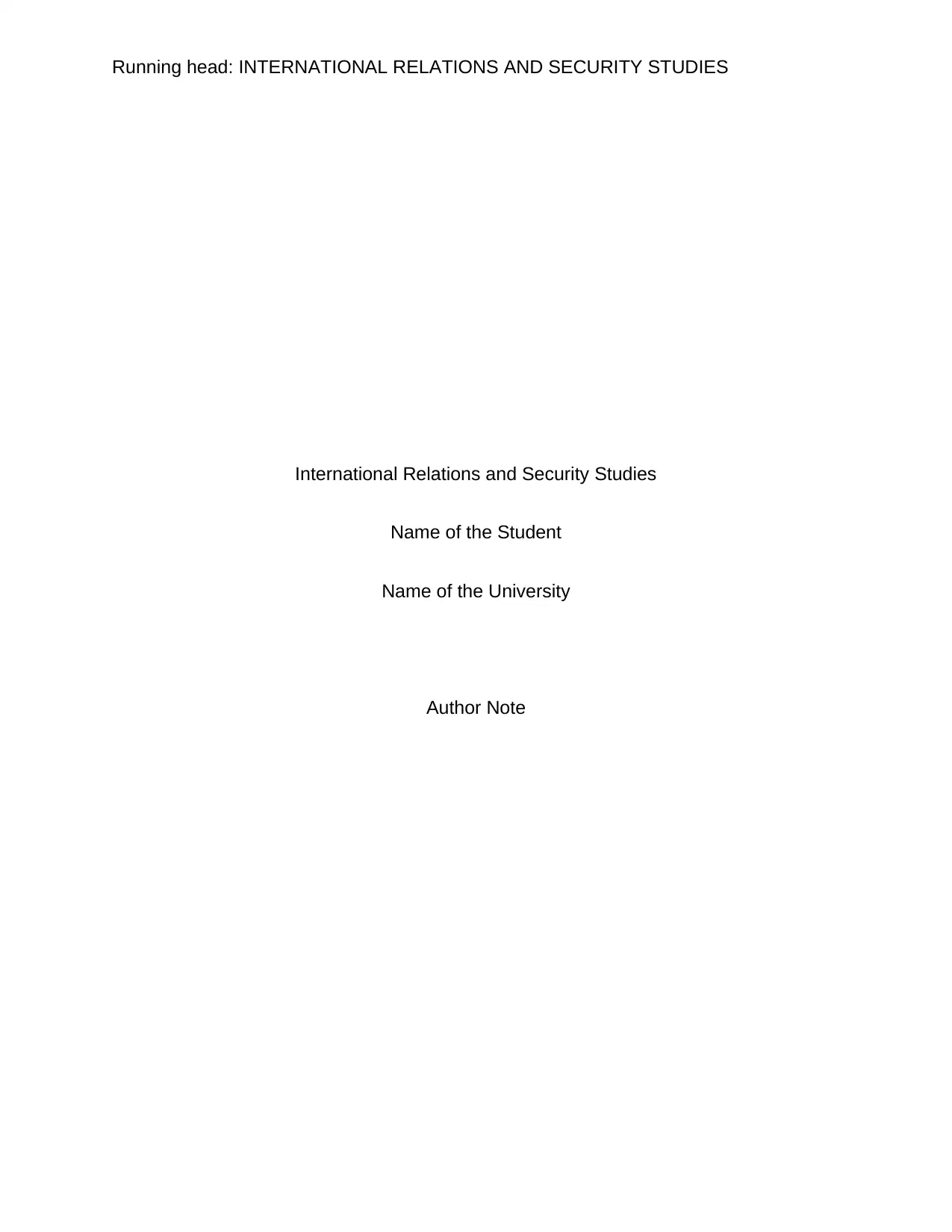
Running head: INTERNATIONAL RELATIONS AND SECURITY STUDIES
International Relations and Security Studies
Name of the Student
Name of the University
Author Note
International Relations and Security Studies
Name of the Student
Name of the University
Author Note
Secure Best Marks with AI Grader
Need help grading? Try our AI Grader for instant feedback on your assignments.
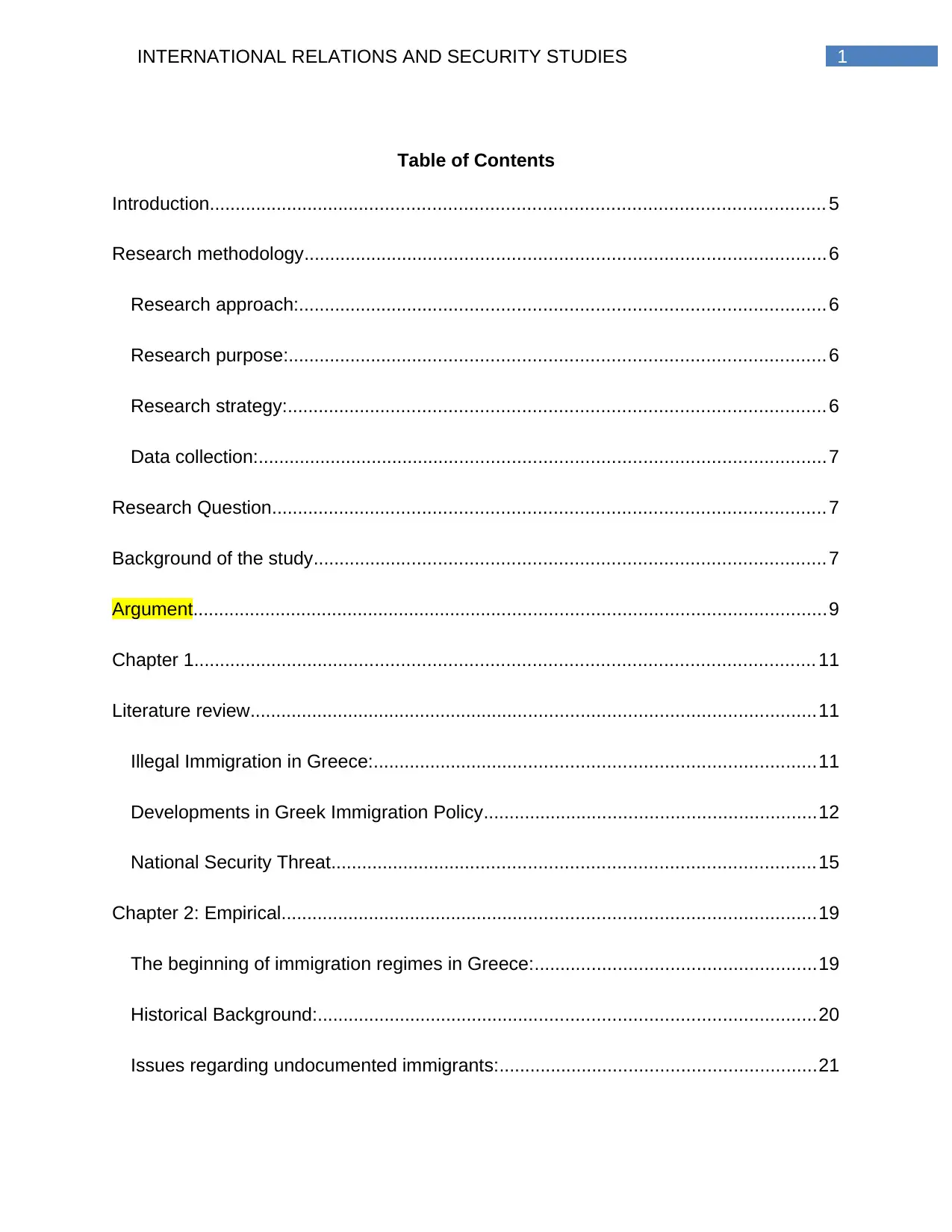
1INTERNATIONAL RELATIONS AND SECURITY STUDIES
Table of Contents
Introduction...................................................................................................................... 5
Research methodology....................................................................................................6
Research approach:..................................................................................................... 6
Research purpose:....................................................................................................... 6
Research strategy:....................................................................................................... 6
Data collection:.............................................................................................................7
Research Question.......................................................................................................... 7
Background of the study.................................................................................................. 7
Argument..........................................................................................................................9
Chapter 1....................................................................................................................... 11
Literature review.............................................................................................................11
Illegal Immigration in Greece:.....................................................................................11
Developments in Greek Immigration Policy................................................................12
National Security Threat.............................................................................................15
Chapter 2: Empirical.......................................................................................................19
The beginning of immigration regimes in Greece:......................................................19
Historical Background:................................................................................................20
Issues regarding undocumented immigrants:.............................................................21
Table of Contents
Introduction...................................................................................................................... 5
Research methodology....................................................................................................6
Research approach:..................................................................................................... 6
Research purpose:....................................................................................................... 6
Research strategy:....................................................................................................... 6
Data collection:.............................................................................................................7
Research Question.......................................................................................................... 7
Background of the study.................................................................................................. 7
Argument..........................................................................................................................9
Chapter 1....................................................................................................................... 11
Literature review.............................................................................................................11
Illegal Immigration in Greece:.....................................................................................11
Developments in Greek Immigration Policy................................................................12
National Security Threat.............................................................................................15
Chapter 2: Empirical.......................................................................................................19
The beginning of immigration regimes in Greece:......................................................19
Historical Background:................................................................................................20
Issues regarding undocumented immigrants:.............................................................21
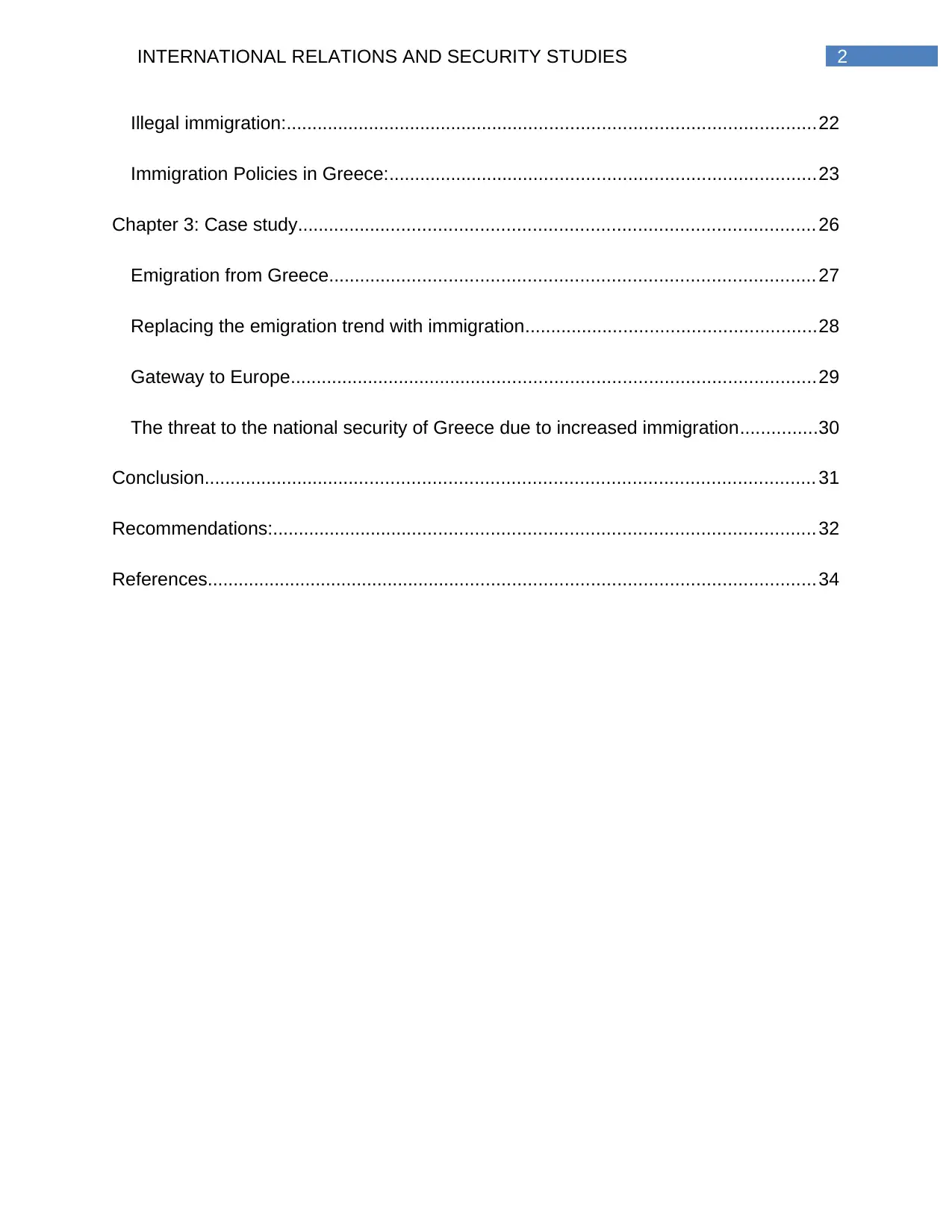
2INTERNATIONAL RELATIONS AND SECURITY STUDIES
Illegal immigration:......................................................................................................22
Immigration Policies in Greece:..................................................................................23
Chapter 3: Case study................................................................................................... 26
Emigration from Greece............................................................................................. 27
Replacing the emigration trend with immigration........................................................28
Gateway to Europe.....................................................................................................29
The threat to the national security of Greece due to increased immigration...............30
Conclusion..................................................................................................................... 31
Recommendations:........................................................................................................ 32
References.....................................................................................................................34
Illegal immigration:......................................................................................................22
Immigration Policies in Greece:..................................................................................23
Chapter 3: Case study................................................................................................... 26
Emigration from Greece............................................................................................. 27
Replacing the emigration trend with immigration........................................................28
Gateway to Europe.....................................................................................................29
The threat to the national security of Greece due to increased immigration...............30
Conclusion..................................................................................................................... 31
Recommendations:........................................................................................................ 32
References.....................................................................................................................34
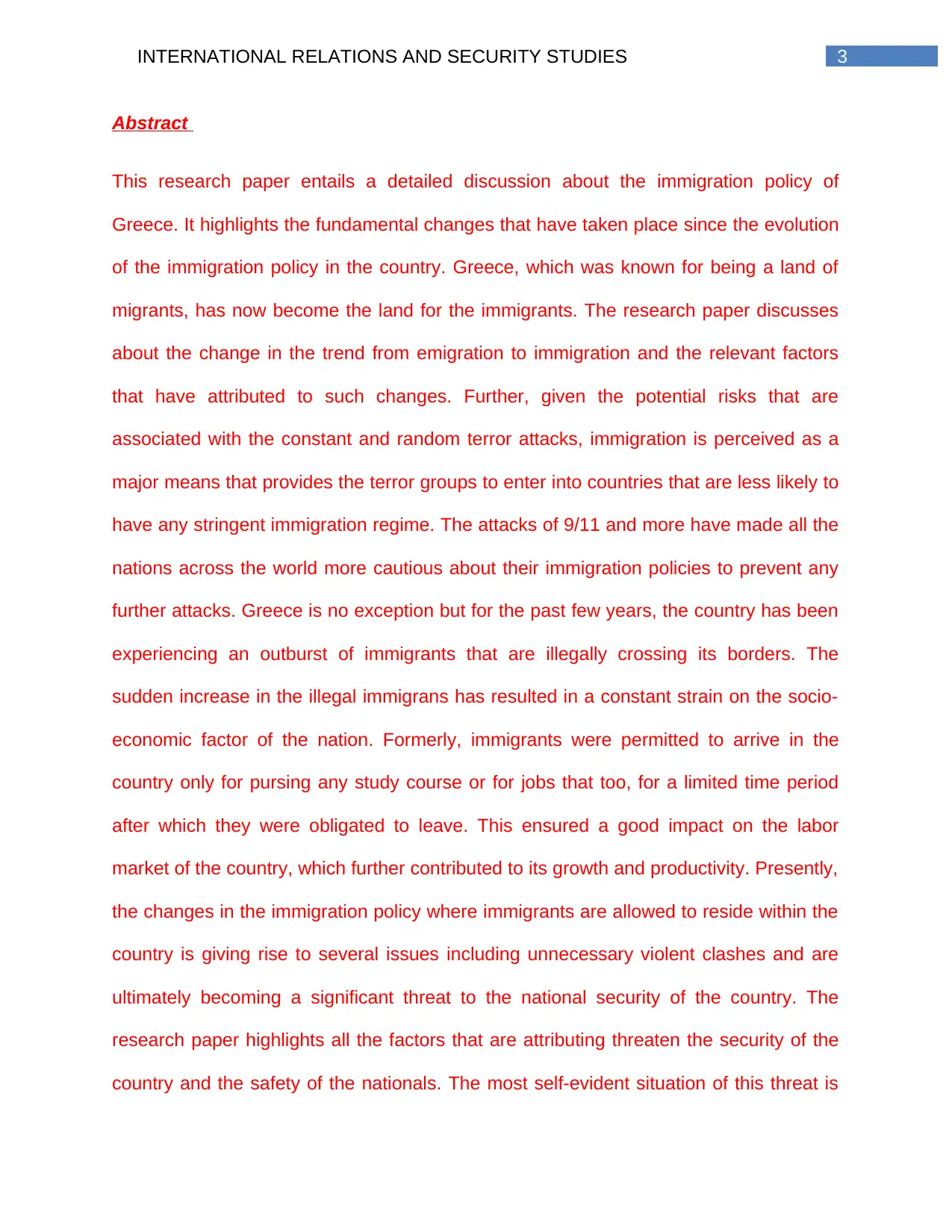
3INTERNATIONAL RELATIONS AND SECURITY STUDIES
Abstract
This research paper entails a detailed discussion about the immigration policy of
Greece. It highlights the fundamental changes that have taken place since the evolution
of the immigration policy in the country. Greece, which was known for being a land of
migrants, has now become the land for the immigrants. The research paper discusses
about the change in the trend from emigration to immigration and the relevant factors
that have attributed to such changes. Further, given the potential risks that are
associated with the constant and random terror attacks, immigration is perceived as a
major means that provides the terror groups to enter into countries that are less likely to
have any stringent immigration regime. The attacks of 9/11 and more have made all the
nations across the world more cautious about their immigration policies to prevent any
further attacks. Greece is no exception but for the past few years, the country has been
experiencing an outburst of immigrants that are illegally crossing its borders. The
sudden increase in the illegal immigrans has resulted in a constant strain on the socio-
economic factor of the nation. Formerly, immigrants were permitted to arrive in the
country only for pursing any study course or for jobs that too, for a limited time period
after which they were obligated to leave. This ensured a good impact on the labor
market of the country, which further contributed to its growth and productivity. Presently,
the changes in the immigration policy where immigrants are allowed to reside within the
country is giving rise to several issues including unnecessary violent clashes and are
ultimately becoming a significant threat to the national security of the country. The
research paper highlights all the factors that are attributing threaten the security of the
country and the safety of the nationals. The most self-evident situation of this threat is
Abstract
This research paper entails a detailed discussion about the immigration policy of
Greece. It highlights the fundamental changes that have taken place since the evolution
of the immigration policy in the country. Greece, which was known for being a land of
migrants, has now become the land for the immigrants. The research paper discusses
about the change in the trend from emigration to immigration and the relevant factors
that have attributed to such changes. Further, given the potential risks that are
associated with the constant and random terror attacks, immigration is perceived as a
major means that provides the terror groups to enter into countries that are less likely to
have any stringent immigration regime. The attacks of 9/11 and more have made all the
nations across the world more cautious about their immigration policies to prevent any
further attacks. Greece is no exception but for the past few years, the country has been
experiencing an outburst of immigrants that are illegally crossing its borders. The
sudden increase in the illegal immigrans has resulted in a constant strain on the socio-
economic factor of the nation. Formerly, immigrants were permitted to arrive in the
country only for pursing any study course or for jobs that too, for a limited time period
after which they were obligated to leave. This ensured a good impact on the labor
market of the country, which further contributed to its growth and productivity. Presently,
the changes in the immigration policy where immigrants are allowed to reside within the
country is giving rise to several issues including unnecessary violent clashes and are
ultimately becoming a significant threat to the national security of the country. The
research paper highlights all the factors that are attributing threaten the security of the
country and the safety of the nationals. The most self-evident situation of this threat is
Paraphrase This Document
Need a fresh take? Get an instant paraphrase of this document with our AI Paraphraser
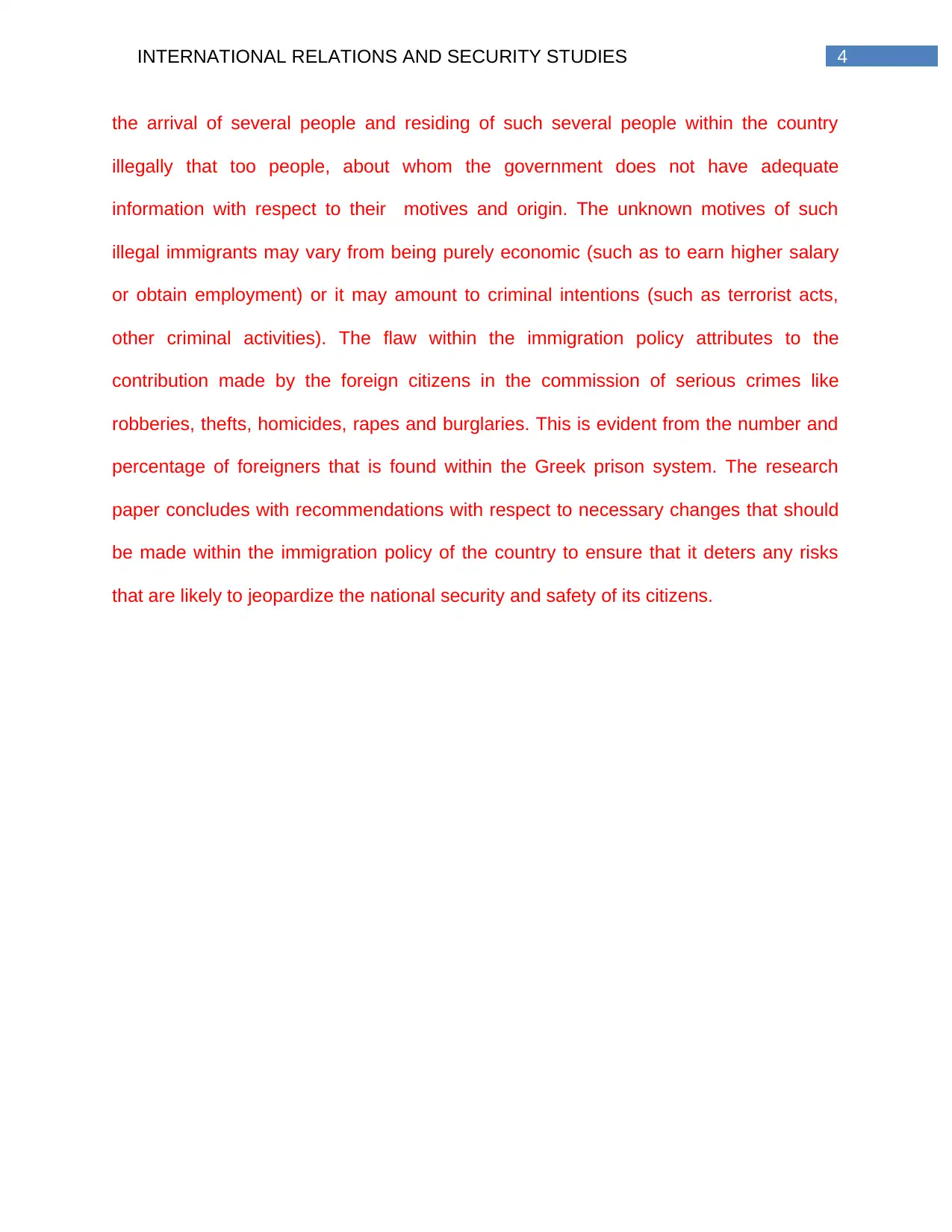
4INTERNATIONAL RELATIONS AND SECURITY STUDIES
the arrival of several people and residing of such several people within the country
illegally that too people, about whom the government does not have adequate
information with respect to their motives and origin. The unknown motives of such
illegal immigrants may vary from being purely economic (such as to earn higher salary
or obtain employment) or it may amount to criminal intentions (such as terrorist acts,
other criminal activities). The flaw within the immigration policy attributes to the
contribution made by the foreign citizens in the commission of serious crimes like
robberies, thefts, homicides, rapes and burglaries. This is evident from the number and
percentage of foreigners that is found within the Greek prison system. The research
paper concludes with recommendations with respect to necessary changes that should
be made within the immigration policy of the country to ensure that it deters any risks
that are likely to jeopardize the national security and safety of its citizens.
the arrival of several people and residing of such several people within the country
illegally that too people, about whom the government does not have adequate
information with respect to their motives and origin. The unknown motives of such
illegal immigrants may vary from being purely economic (such as to earn higher salary
or obtain employment) or it may amount to criminal intentions (such as terrorist acts,
other criminal activities). The flaw within the immigration policy attributes to the
contribution made by the foreign citizens in the commission of serious crimes like
robberies, thefts, homicides, rapes and burglaries. This is evident from the number and
percentage of foreigners that is found within the Greek prison system. The research
paper concludes with recommendations with respect to necessary changes that should
be made within the immigration policy of the country to ensure that it deters any risks
that are likely to jeopardize the national security and safety of its citizens.
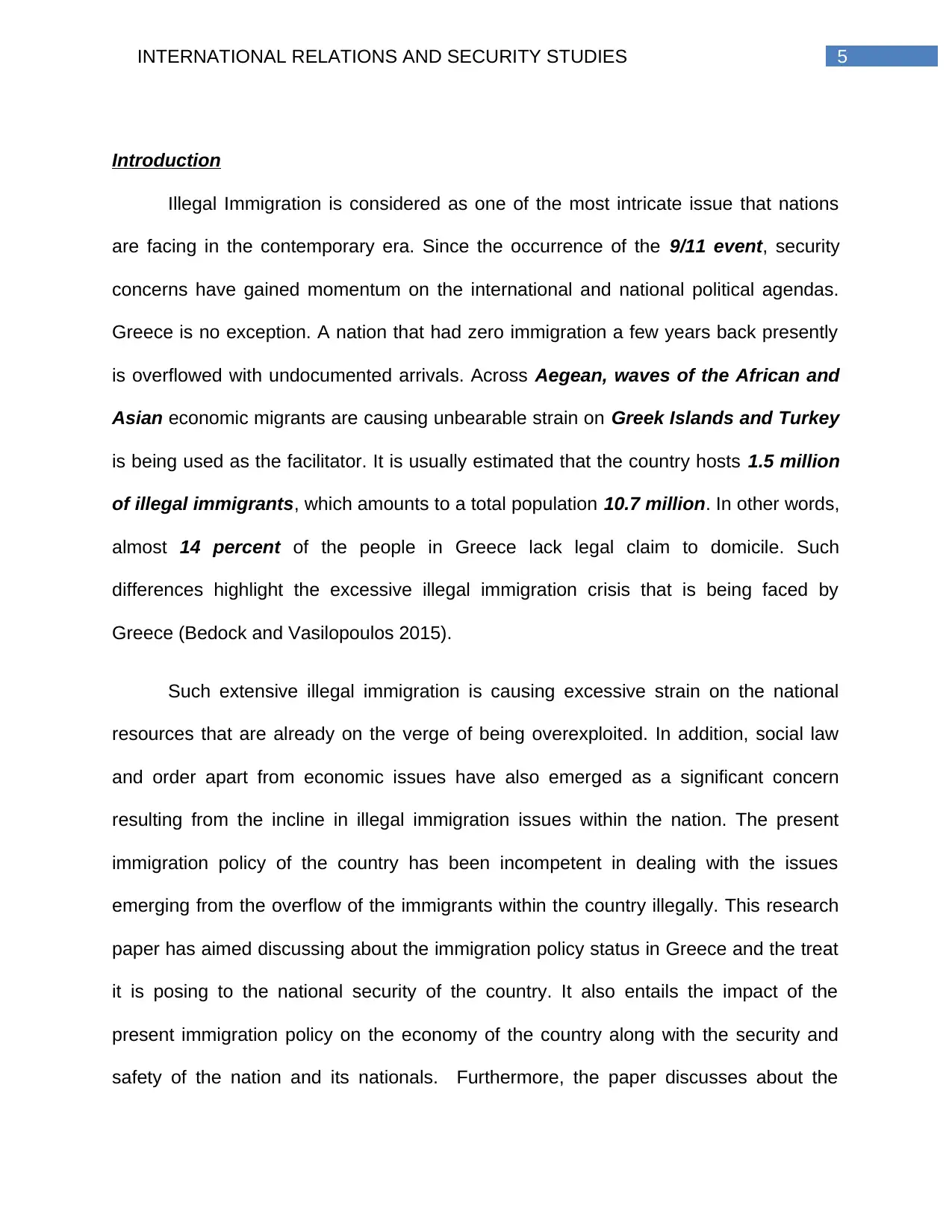
5INTERNATIONAL RELATIONS AND SECURITY STUDIES
Introduction
Illegal Immigration is considered as one of the most intricate issue that nations
are facing in the contemporary era. Since the occurrence of the 9/11 event, security
concerns have gained momentum on the international and national political agendas.
Greece is no exception. A nation that had zero immigration a few years back presently
is overflowed with undocumented arrivals. Across Aegean, waves of the African and
Asian economic migrants are causing unbearable strain on Greek Islands and Turkey
is being used as the facilitator. It is usually estimated that the country hosts 1.5 million
of illegal immigrants, which amounts to a total population 10.7 million. In other words,
almost 14 percent of the people in Greece lack legal claim to domicile. Such
differences highlight the excessive illegal immigration crisis that is being faced by
Greece (Bedock and Vasilopoulos 2015).
Such extensive illegal immigration is causing excessive strain on the national
resources that are already on the verge of being overexploited. In addition, social law
and order apart from economic issues have also emerged as a significant concern
resulting from the incline in illegal immigration issues within the nation. The present
immigration policy of the country has been incompetent in dealing with the issues
emerging from the overflow of the immigrants within the country illegally. This research
paper has aimed discussing about the immigration policy status in Greece and the treat
it is posing to the national security of the country. It also entails the impact of the
present immigration policy on the economy of the country along with the security and
safety of the nation and its nationals. Furthermore, the paper discusses about the
Introduction
Illegal Immigration is considered as one of the most intricate issue that nations
are facing in the contemporary era. Since the occurrence of the 9/11 event, security
concerns have gained momentum on the international and national political agendas.
Greece is no exception. A nation that had zero immigration a few years back presently
is overflowed with undocumented arrivals. Across Aegean, waves of the African and
Asian economic migrants are causing unbearable strain on Greek Islands and Turkey
is being used as the facilitator. It is usually estimated that the country hosts 1.5 million
of illegal immigrants, which amounts to a total population 10.7 million. In other words,
almost 14 percent of the people in Greece lack legal claim to domicile. Such
differences highlight the excessive illegal immigration crisis that is being faced by
Greece (Bedock and Vasilopoulos 2015).
Such extensive illegal immigration is causing excessive strain on the national
resources that are already on the verge of being overexploited. In addition, social law
and order apart from economic issues have also emerged as a significant concern
resulting from the incline in illegal immigration issues within the nation. The present
immigration policy of the country has been incompetent in dealing with the issues
emerging from the overflow of the immigrants within the country illegally. This research
paper has aimed discussing about the immigration policy status in Greece and the treat
it is posing to the national security of the country. It also entails the impact of the
present immigration policy on the economy of the country along with the security and
safety of the nation and its nationals. Furthermore, the paper discusses about the
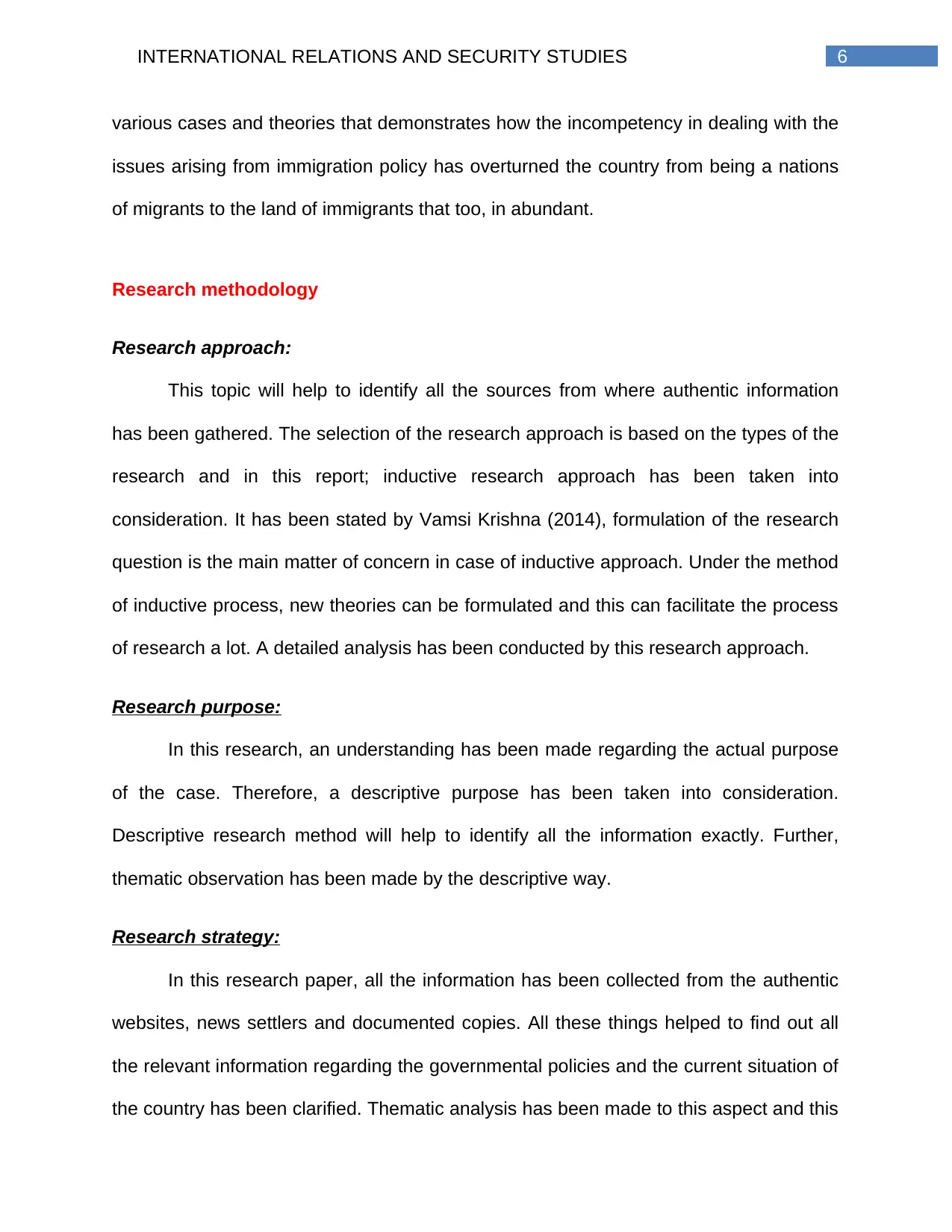
6INTERNATIONAL RELATIONS AND SECURITY STUDIES
various cases and theories that demonstrates how the incompetency in dealing with the
issues arising from immigration policy has overturned the country from being a nations
of migrants to the land of immigrants that too, in abundant.
Research methodology
Research approach:
This topic will help to identify all the sources from where authentic information
has been gathered. The selection of the research approach is based on the types of the
research and in this report; inductive research approach has been taken into
consideration. It has been stated by Vamsi Krishna (2014), formulation of the research
question is the main matter of concern in case of inductive approach. Under the method
of inductive process, new theories can be formulated and this can facilitate the process
of research a lot. A detailed analysis has been conducted by this research approach.
Research purpose:
In this research, an understanding has been made regarding the actual purpose
of the case. Therefore, a descriptive purpose has been taken into consideration.
Descriptive research method will help to identify all the information exactly. Further,
thematic observation has been made by the descriptive way.
Research strategy:
In this research paper, all the information has been collected from the authentic
websites, news settlers and documented copies. All these things helped to find out all
the relevant information regarding the governmental policies and the current situation of
the country has been clarified. Thematic analysis has been made to this aspect and this
various cases and theories that demonstrates how the incompetency in dealing with the
issues arising from immigration policy has overturned the country from being a nations
of migrants to the land of immigrants that too, in abundant.
Research methodology
Research approach:
This topic will help to identify all the sources from where authentic information
has been gathered. The selection of the research approach is based on the types of the
research and in this report; inductive research approach has been taken into
consideration. It has been stated by Vamsi Krishna (2014), formulation of the research
question is the main matter of concern in case of inductive approach. Under the method
of inductive process, new theories can be formulated and this can facilitate the process
of research a lot. A detailed analysis has been conducted by this research approach.
Research purpose:
In this research, an understanding has been made regarding the actual purpose
of the case. Therefore, a descriptive purpose has been taken into consideration.
Descriptive research method will help to identify all the information exactly. Further,
thematic observation has been made by the descriptive way.
Research strategy:
In this research paper, all the information has been collected from the authentic
websites, news settlers and documented copies. All these things helped to find out all
the relevant information regarding the governmental policies and the current situation of
the country has been clarified. Thematic analysis has been made to this aspect and this
Secure Best Marks with AI Grader
Need help grading? Try our AI Grader for instant feedback on your assignments.
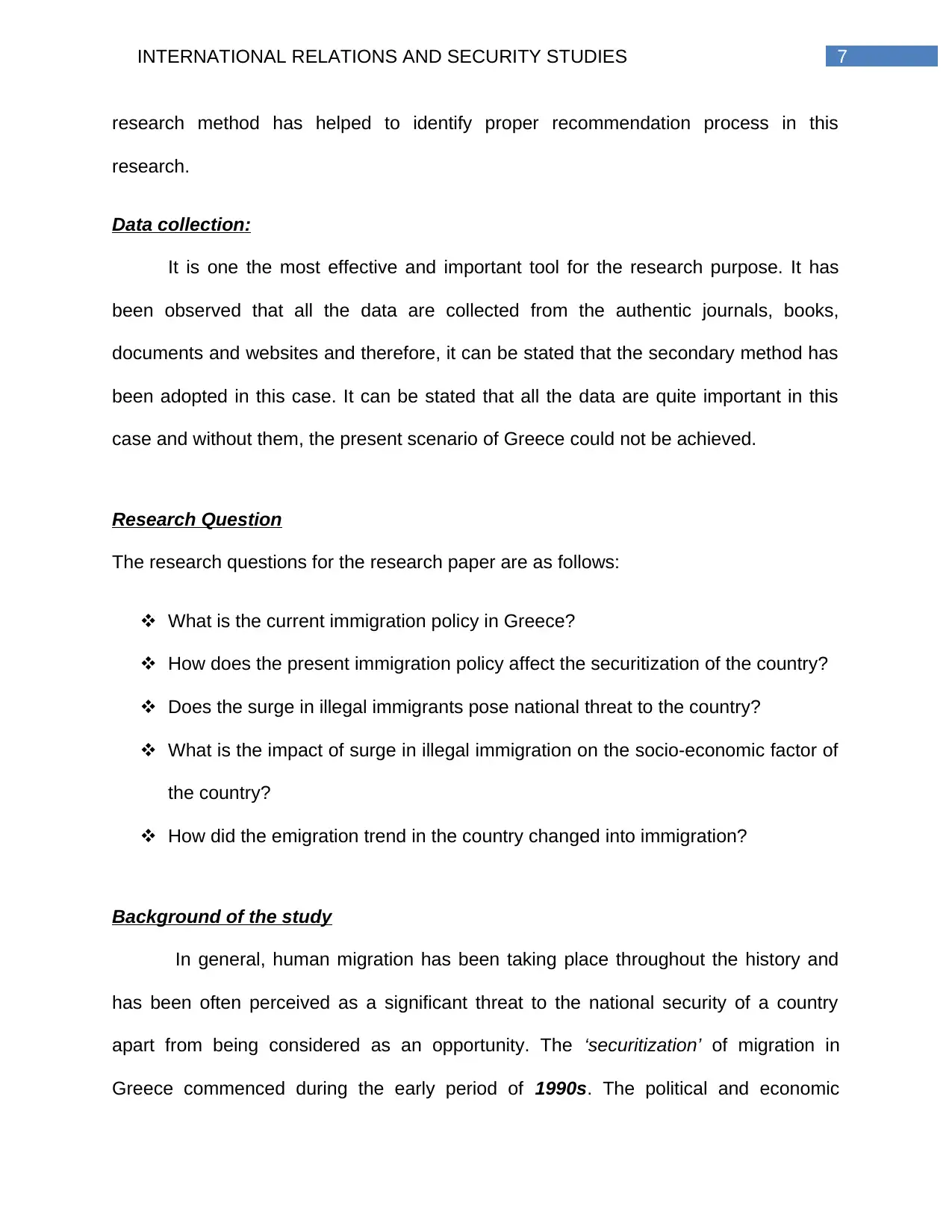
7INTERNATIONAL RELATIONS AND SECURITY STUDIES
research method has helped to identify proper recommendation process in this
research.
Data collection:
It is one the most effective and important tool for the research purpose. It has
been observed that all the data are collected from the authentic journals, books,
documents and websites and therefore, it can be stated that the secondary method has
been adopted in this case. It can be stated that all the data are quite important in this
case and without them, the present scenario of Greece could not be achieved.
Research Question
The research questions for the research paper are as follows:
What is the current immigration policy in Greece?
How does the present immigration policy affect the securitization of the country?
Does the surge in illegal immigrants pose national threat to the country?
What is the impact of surge in illegal immigration on the socio-economic factor of
the country?
How did the emigration trend in the country changed into immigration?
Background of the study
In general, human migration has been taking place throughout the history and
has been often perceived as a significant threat to the national security of a country
apart from being considered as an opportunity. The ‘securitization’ of migration in
Greece commenced during the early period of 1990s. The political and economic
research method has helped to identify proper recommendation process in this
research.
Data collection:
It is one the most effective and important tool for the research purpose. It has
been observed that all the data are collected from the authentic journals, books,
documents and websites and therefore, it can be stated that the secondary method has
been adopted in this case. It can be stated that all the data are quite important in this
case and without them, the present scenario of Greece could not be achieved.
Research Question
The research questions for the research paper are as follows:
What is the current immigration policy in Greece?
How does the present immigration policy affect the securitization of the country?
Does the surge in illegal immigrants pose national threat to the country?
What is the impact of surge in illegal immigration on the socio-economic factor of
the country?
How did the emigration trend in the country changed into immigration?
Background of the study
In general, human migration has been taking place throughout the history and
has been often perceived as a significant threat to the national security of a country
apart from being considered as an opportunity. The ‘securitization’ of migration in
Greece commenced during the early period of 1990s. The political and economic

8INTERNATIONAL RELATIONS AND SECURITY STUDIES
changes that occurred in East Central Europe leading to overflow of migrants into
Greece also gave rise to repeated restrictive action. Such actions included stringent
border controls to extensive operation that resulted in massive deportations and racist
reactions against such deportations. The overflow of immigrants in larger cities like
Athens accelerated the concerns that were already prevailing since the early 1990s
when the country became an immigration host for the first time. It demonstrated the
deficiencies in the immigration policies and lack of assimilation of all the policies to bring
out a desired outcome (Figgou 2016).
Athens is already known for its objectionable record of heaving illegal immigrant
Ghetto where the residents of Ghetto arose to form organized gangs in order to
exercise control over the territory. Consequently, violent armed clashes take place
during the broad daylight near the Parliament of the country. Further, in Patras, which is
considered as the largest gateway port to Italy, illegal immigrants are usually found
roaming in groups around the harbor with the objective to board ferries in order to enter
Italy. There have been reports where such illegal immigrants and the seafront business
owners have engaged into violent clashes causing fear and panic amongst the
residents of Patras. Therefore, the surge in illegal immigrants in the Greece has
become a significant challenge for the nation within the regional environment and
requires to be addressed sooner in order to ensure security of the country and its
nationals.
changes that occurred in East Central Europe leading to overflow of migrants into
Greece also gave rise to repeated restrictive action. Such actions included stringent
border controls to extensive operation that resulted in massive deportations and racist
reactions against such deportations. The overflow of immigrants in larger cities like
Athens accelerated the concerns that were already prevailing since the early 1990s
when the country became an immigration host for the first time. It demonstrated the
deficiencies in the immigration policies and lack of assimilation of all the policies to bring
out a desired outcome (Figgou 2016).
Athens is already known for its objectionable record of heaving illegal immigrant
Ghetto where the residents of Ghetto arose to form organized gangs in order to
exercise control over the territory. Consequently, violent armed clashes take place
during the broad daylight near the Parliament of the country. Further, in Patras, which is
considered as the largest gateway port to Italy, illegal immigrants are usually found
roaming in groups around the harbor with the objective to board ferries in order to enter
Italy. There have been reports where such illegal immigrants and the seafront business
owners have engaged into violent clashes causing fear and panic amongst the
residents of Patras. Therefore, the surge in illegal immigrants in the Greece has
become a significant challenge for the nation within the regional environment and
requires to be addressed sooner in order to ensure security of the country and its
nationals.
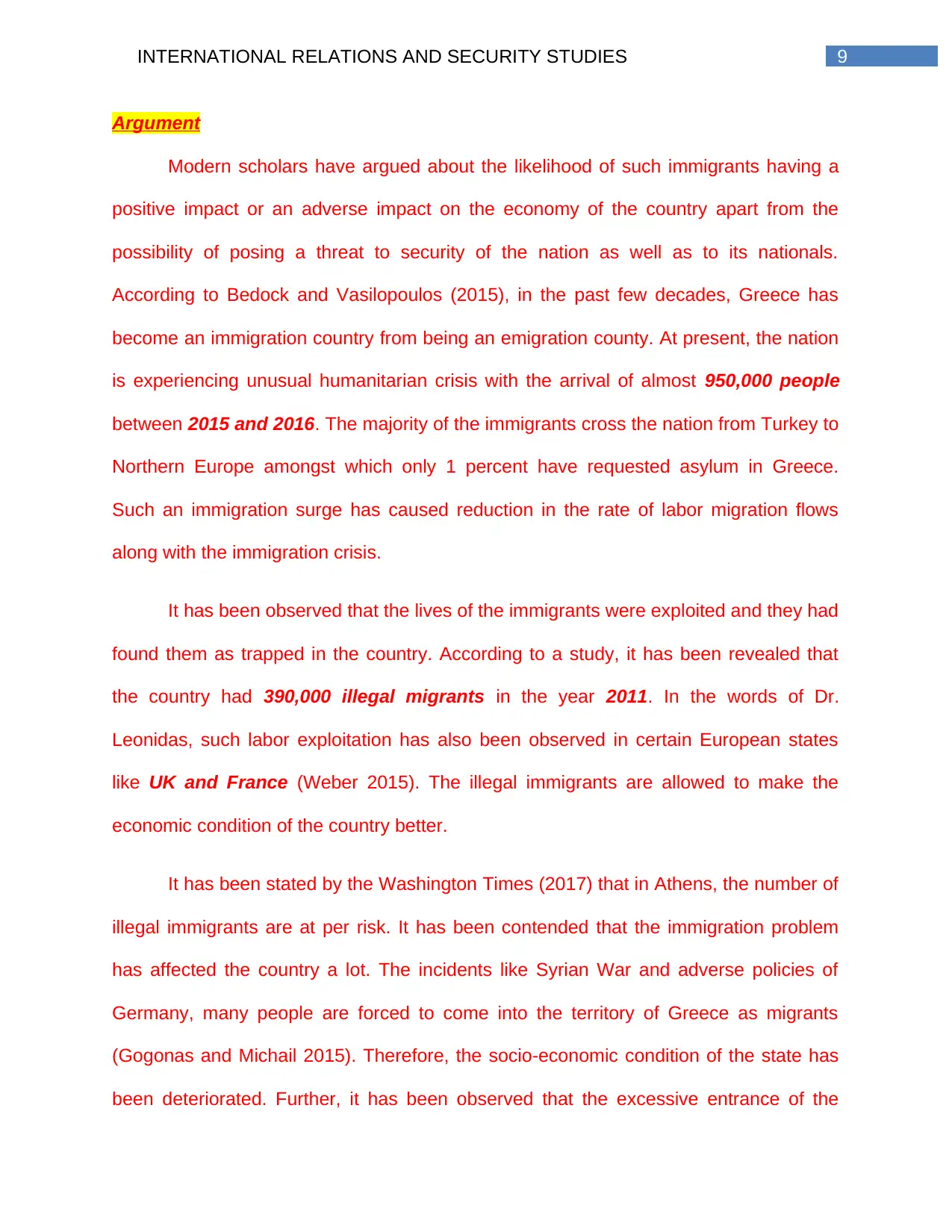
9INTERNATIONAL RELATIONS AND SECURITY STUDIES
Argument
Modern scholars have argued about the likelihood of such immigrants having a
positive impact or an adverse impact on the economy of the country apart from the
possibility of posing a threat to security of the nation as well as to its nationals.
According to Bedock and Vasilopoulos (2015), in the past few decades, Greece has
become an immigration country from being an emigration county. At present, the nation
is experiencing unusual humanitarian crisis with the arrival of almost 950,000 people
between 2015 and 2016. The majority of the immigrants cross the nation from Turkey to
Northern Europe amongst which only 1 percent have requested asylum in Greece.
Such an immigration surge has caused reduction in the rate of labor migration flows
along with the immigration crisis.
It has been observed that the lives of the immigrants were exploited and they had
found them as trapped in the country. According to a study, it has been revealed that
the country had 390,000 illegal migrants in the year 2011. In the words of Dr.
Leonidas, such labor exploitation has also been observed in certain European states
like UK and France (Weber 2015). The illegal immigrants are allowed to make the
economic condition of the country better.
It has been stated by the Washington Times (2017) that in Athens, the number of
illegal immigrants are at per risk. It has been contended that the immigration problem
has affected the country a lot. The incidents like Syrian War and adverse policies of
Germany, many people are forced to come into the territory of Greece as migrants
(Gogonas and Michail 2015). Therefore, the socio-economic condition of the state has
been deteriorated. Further, it has been observed that the excessive entrance of the
Argument
Modern scholars have argued about the likelihood of such immigrants having a
positive impact or an adverse impact on the economy of the country apart from the
possibility of posing a threat to security of the nation as well as to its nationals.
According to Bedock and Vasilopoulos (2015), in the past few decades, Greece has
become an immigration country from being an emigration county. At present, the nation
is experiencing unusual humanitarian crisis with the arrival of almost 950,000 people
between 2015 and 2016. The majority of the immigrants cross the nation from Turkey to
Northern Europe amongst which only 1 percent have requested asylum in Greece.
Such an immigration surge has caused reduction in the rate of labor migration flows
along with the immigration crisis.
It has been observed that the lives of the immigrants were exploited and they had
found them as trapped in the country. According to a study, it has been revealed that
the country had 390,000 illegal migrants in the year 2011. In the words of Dr.
Leonidas, such labor exploitation has also been observed in certain European states
like UK and France (Weber 2015). The illegal immigrants are allowed to make the
economic condition of the country better.
It has been stated by the Washington Times (2017) that in Athens, the number of
illegal immigrants are at per risk. It has been contended that the immigration problem
has affected the country a lot. The incidents like Syrian War and adverse policies of
Germany, many people are forced to come into the territory of Greece as migrants
(Gogonas and Michail 2015). Therefore, the socio-economic condition of the state has
been deteriorated. Further, it has been observed that the excessive entrance of the
Paraphrase This Document
Need a fresh take? Get an instant paraphrase of this document with our AI Paraphraser
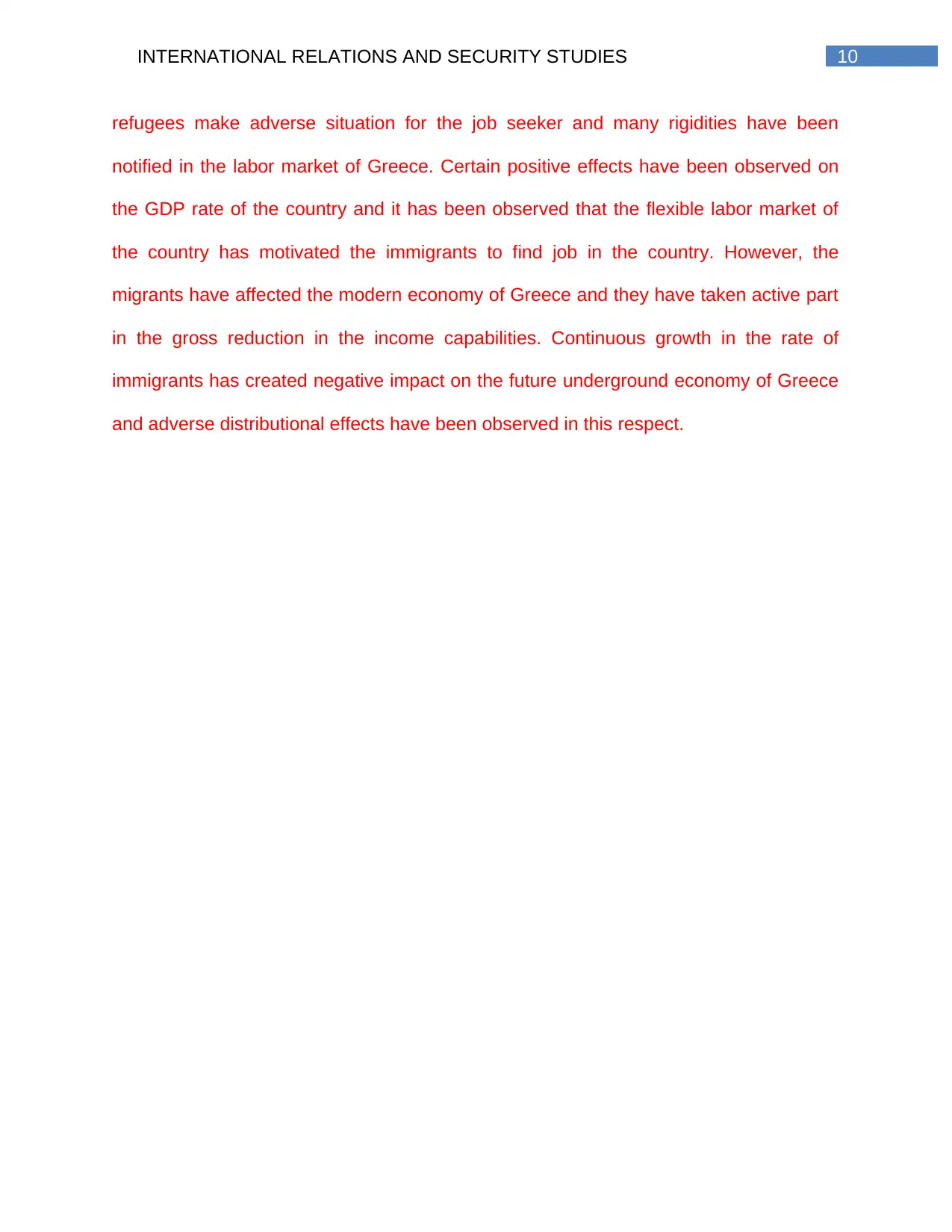
10INTERNATIONAL RELATIONS AND SECURITY STUDIES
refugees make adverse situation for the job seeker and many rigidities have been
notified in the labor market of Greece. Certain positive effects have been observed on
the GDP rate of the country and it has been observed that the flexible labor market of
the country has motivated the immigrants to find job in the country. However, the
migrants have affected the modern economy of Greece and they have taken active part
in the gross reduction in the income capabilities. Continuous growth in the rate of
immigrants has created negative impact on the future underground economy of Greece
and adverse distributional effects have been observed in this respect.
refugees make adverse situation for the job seeker and many rigidities have been
notified in the labor market of Greece. Certain positive effects have been observed on
the GDP rate of the country and it has been observed that the flexible labor market of
the country has motivated the immigrants to find job in the country. However, the
migrants have affected the modern economy of Greece and they have taken active part
in the gross reduction in the income capabilities. Continuous growth in the rate of
immigrants has created negative impact on the future underground economy of Greece
and adverse distributional effects have been observed in this respect.
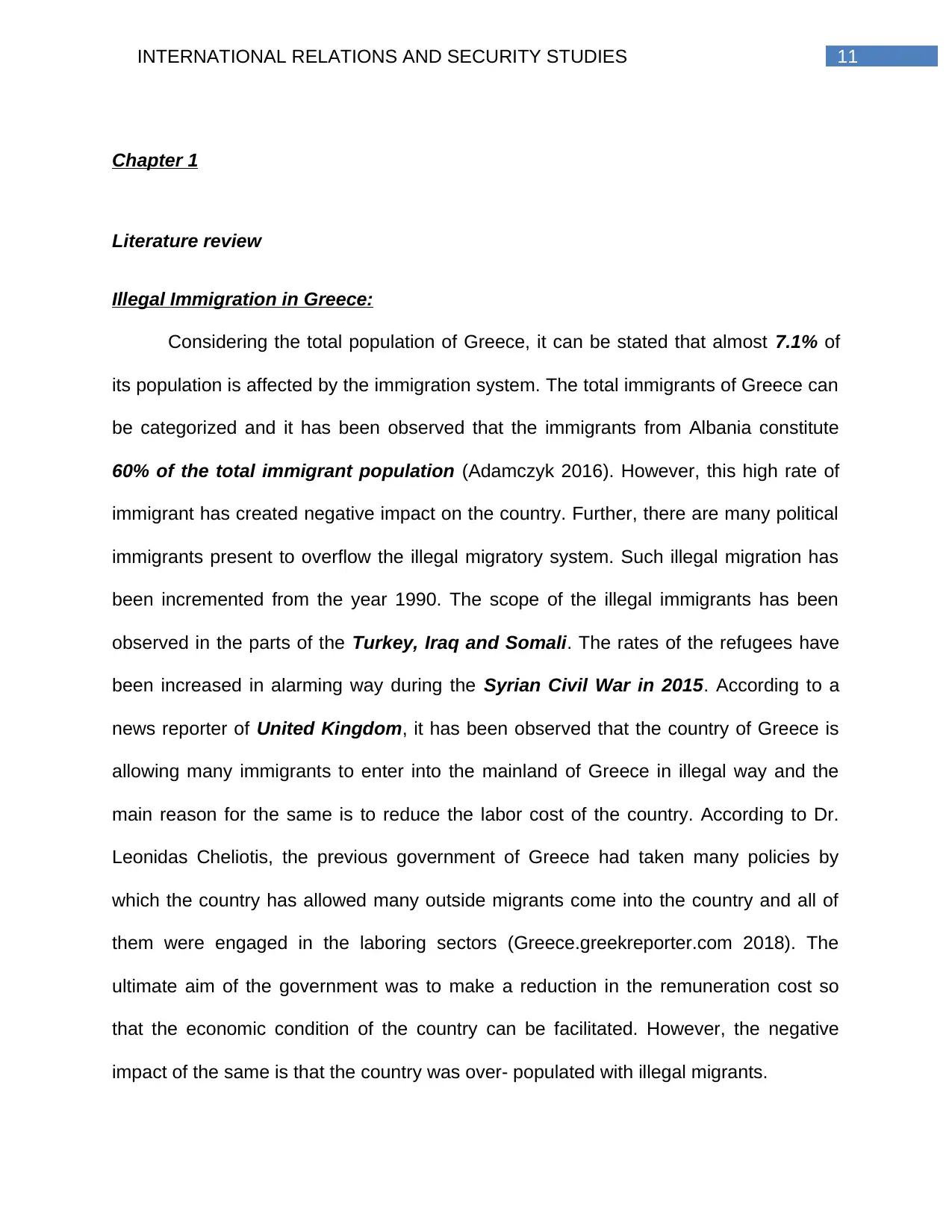
11INTERNATIONAL RELATIONS AND SECURITY STUDIES
Chapter 1
Literature review
Illegal Immigration in Greece:
Considering the total population of Greece, it can be stated that almost 7.1% of
its population is affected by the immigration system. The total immigrants of Greece can
be categorized and it has been observed that the immigrants from Albania constitute
60% of the total immigrant population (Adamczyk 2016). However, this high rate of
immigrant has created negative impact on the country. Further, there are many political
immigrants present to overflow the illegal migratory system. Such illegal migration has
been incremented from the year 1990. The scope of the illegal immigrants has been
observed in the parts of the Turkey, Iraq and Somali. The rates of the refugees have
been increased in alarming way during the Syrian Civil War in 2015. According to a
news reporter of United Kingdom, it has been observed that the country of Greece is
allowing many immigrants to enter into the mainland of Greece in illegal way and the
main reason for the same is to reduce the labor cost of the country. According to Dr.
Leonidas Cheliotis, the previous government of Greece had taken many policies by
which the country has allowed many outside migrants come into the country and all of
them were engaged in the laboring sectors (Greece.greekreporter.com 2018). The
ultimate aim of the government was to make a reduction in the remuneration cost so
that the economic condition of the country can be facilitated. However, the negative
impact of the same is that the country was over- populated with illegal migrants.
Chapter 1
Literature review
Illegal Immigration in Greece:
Considering the total population of Greece, it can be stated that almost 7.1% of
its population is affected by the immigration system. The total immigrants of Greece can
be categorized and it has been observed that the immigrants from Albania constitute
60% of the total immigrant population (Adamczyk 2016). However, this high rate of
immigrant has created negative impact on the country. Further, there are many political
immigrants present to overflow the illegal migratory system. Such illegal migration has
been incremented from the year 1990. The scope of the illegal immigrants has been
observed in the parts of the Turkey, Iraq and Somali. The rates of the refugees have
been increased in alarming way during the Syrian Civil War in 2015. According to a
news reporter of United Kingdom, it has been observed that the country of Greece is
allowing many immigrants to enter into the mainland of Greece in illegal way and the
main reason for the same is to reduce the labor cost of the country. According to Dr.
Leonidas Cheliotis, the previous government of Greece had taken many policies by
which the country has allowed many outside migrants come into the country and all of
them were engaged in the laboring sectors (Greece.greekreporter.com 2018). The
ultimate aim of the government was to make a reduction in the remuneration cost so
that the economic condition of the country can be facilitated. However, the negative
impact of the same is that the country was over- populated with illegal migrants.

12INTERNATIONAL RELATIONS AND SECURITY STUDIES
Further, the policy of the Greece government regarding the illegal immigrants has
faced certain criticisms. It has been contended that the government of Greece is
engaging the immigrants into several sectors and do not provide minimum waging
benefits to them. Further, the immigrants could not enjoy their basic rights and they are
confined in the territorial jurisdiction of the country. In addition to this, it is to be stated
that the immigrants have also affected the social condition of the country (Coluccello
and Kretsos 2015). It has been observed that the rate of criminality has been increased
by this incident. In the society of Greece, the effect of the criminal offence has been
grown up tremendously.
The economic crisis of the Greece has created negative impacts on the
undocumented immigrants and it has been observed that the immigrants have to face
serious problems due to the same. The ulterior motive of the Greece government has
provoked the free entry of illegal immigrants. According to the contention made by the
Greek Council for Refugee, the condition of the immigrants has become worse and they
could not get minimum rights there. The council held the political will liable for the
situation. All these things forced the Greece government to change the migration
policies (Andreouli et al. 2017).
Developments in Greek Immigration Policy
Prior to the commencement of the first regularization program, a new statute was
enacted ‘Entry and sojourn of foreigners in the Greek territory, naturalization and
other measures’ in the year 2001. The Socialist government enacted the law on the
ground that it marked a new era in the field of migration management in Greece
(Andreouli et al. 2017). However, under this statute the migrants were permitted to enter
Further, the policy of the Greece government regarding the illegal immigrants has
faced certain criticisms. It has been contended that the government of Greece is
engaging the immigrants into several sectors and do not provide minimum waging
benefits to them. Further, the immigrants could not enjoy their basic rights and they are
confined in the territorial jurisdiction of the country. In addition to this, it is to be stated
that the immigrants have also affected the social condition of the country (Coluccello
and Kretsos 2015). It has been observed that the rate of criminality has been increased
by this incident. In the society of Greece, the effect of the criminal offence has been
grown up tremendously.
The economic crisis of the Greece has created negative impacts on the
undocumented immigrants and it has been observed that the immigrants have to face
serious problems due to the same. The ulterior motive of the Greece government has
provoked the free entry of illegal immigrants. According to the contention made by the
Greek Council for Refugee, the condition of the immigrants has become worse and they
could not get minimum rights there. The council held the political will liable for the
situation. All these things forced the Greece government to change the migration
policies (Andreouli et al. 2017).
Developments in Greek Immigration Policy
Prior to the commencement of the first regularization program, a new statute was
enacted ‘Entry and sojourn of foreigners in the Greek territory, naturalization and
other measures’ in the year 2001. The Socialist government enacted the law on the
ground that it marked a new era in the field of migration management in Greece
(Andreouli et al. 2017). However, under this statute the migrants were permitted to enter
Secure Best Marks with AI Grader
Need help grading? Try our AI Grader for instant feedback on your assignments.
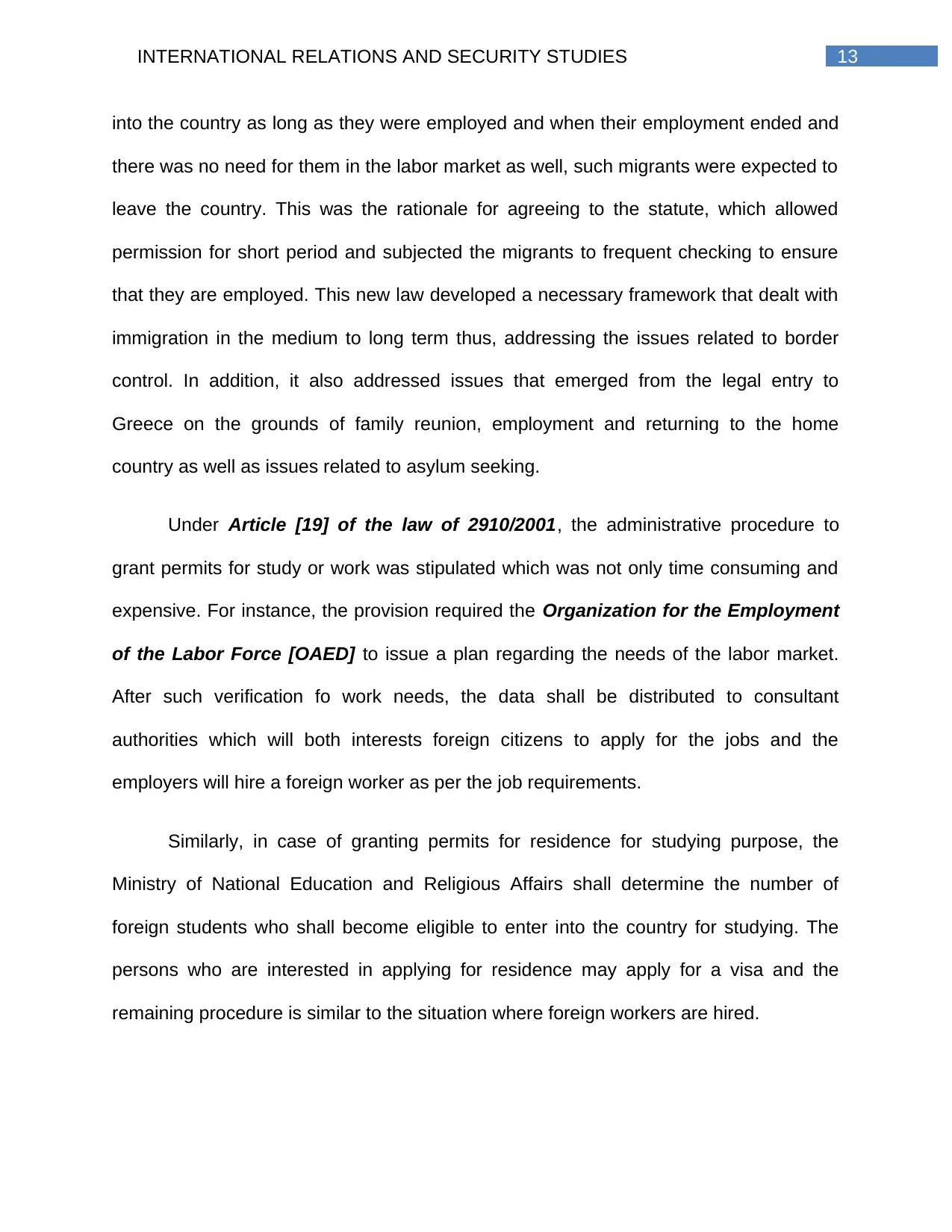
13INTERNATIONAL RELATIONS AND SECURITY STUDIES
into the country as long as they were employed and when their employment ended and
there was no need for them in the labor market as well, such migrants were expected to
leave the country. This was the rationale for agreeing to the statute, which allowed
permission for short period and subjected the migrants to frequent checking to ensure
that they are employed. This new law developed a necessary framework that dealt with
immigration in the medium to long term thus, addressing the issues related to border
control. In addition, it also addressed issues that emerged from the legal entry to
Greece on the grounds of family reunion, employment and returning to the home
country as well as issues related to asylum seeking.
Under Article [19] of the law of 2910/2001, the administrative procedure to
grant permits for study or work was stipulated which was not only time consuming and
expensive. For instance, the provision required the Organization for the Employment
of the Labor Force [OAED] to issue a plan regarding the needs of the labor market.
After such verification fo work needs, the data shall be distributed to consultant
authorities which will both interests foreign citizens to apply for the jobs and the
employers will hire a foreign worker as per the job requirements.
Similarly, in case of granting permits for residence for studying purpose, the
Ministry of National Education and Religious Affairs shall determine the number of
foreign students who shall become eligible to enter into the country for studying. The
persons who are interested in applying for residence may apply for a visa and the
remaining procedure is similar to the situation where foreign workers are hired.
into the country as long as they were employed and when their employment ended and
there was no need for them in the labor market as well, such migrants were expected to
leave the country. This was the rationale for agreeing to the statute, which allowed
permission for short period and subjected the migrants to frequent checking to ensure
that they are employed. This new law developed a necessary framework that dealt with
immigration in the medium to long term thus, addressing the issues related to border
control. In addition, it also addressed issues that emerged from the legal entry to
Greece on the grounds of family reunion, employment and returning to the home
country as well as issues related to asylum seeking.
Under Article [19] of the law of 2910/2001, the administrative procedure to
grant permits for study or work was stipulated which was not only time consuming and
expensive. For instance, the provision required the Organization for the Employment
of the Labor Force [OAED] to issue a plan regarding the needs of the labor market.
After such verification fo work needs, the data shall be distributed to consultant
authorities which will both interests foreign citizens to apply for the jobs and the
employers will hire a foreign worker as per the job requirements.
Similarly, in case of granting permits for residence for studying purpose, the
Ministry of National Education and Religious Affairs shall determine the number of
foreign students who shall become eligible to enter into the country for studying. The
persons who are interested in applying for residence may apply for a visa and the
remaining procedure is similar to the situation where foreign workers are hired.
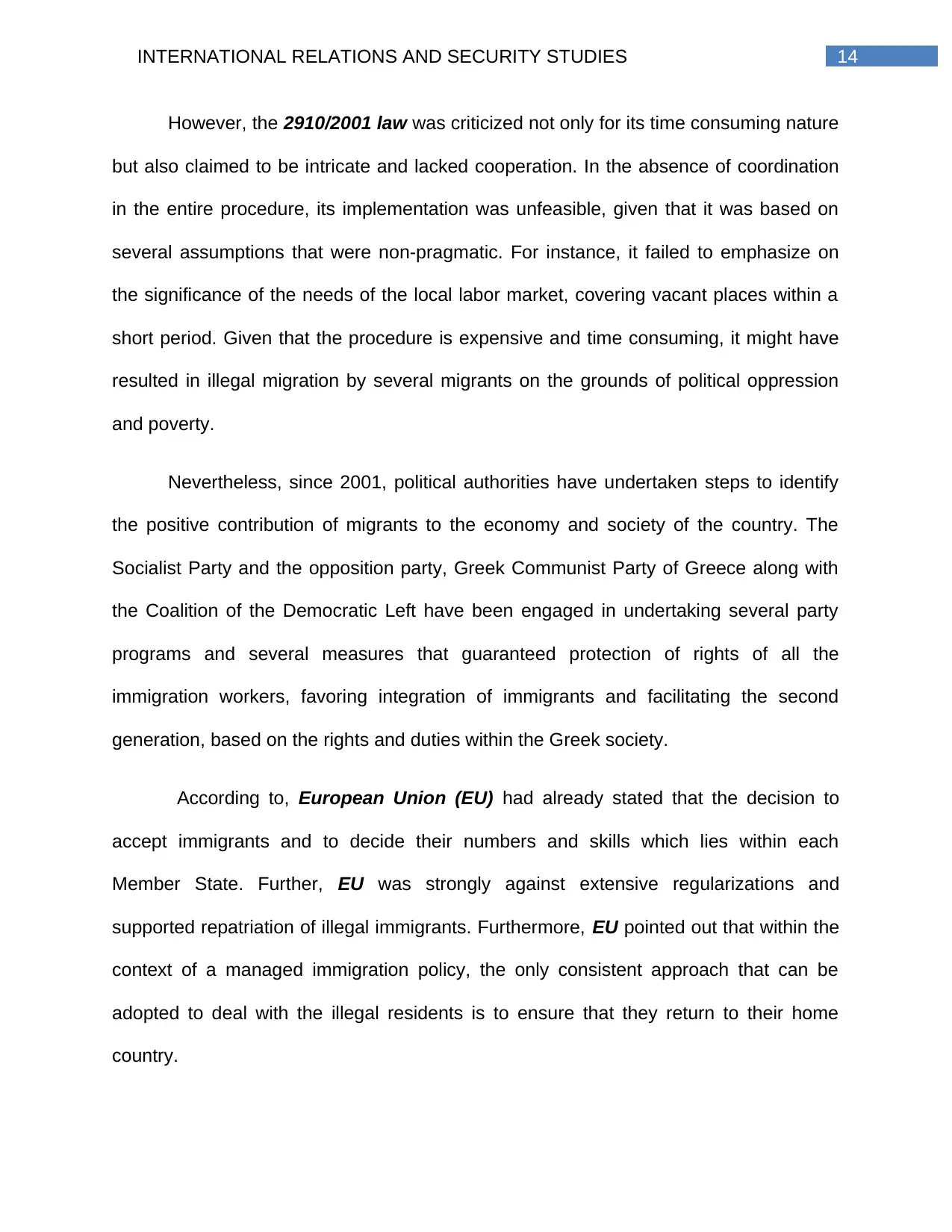
14INTERNATIONAL RELATIONS AND SECURITY STUDIES
However, the 2910/2001 law was criticized not only for its time consuming nature
but also claimed to be intricate and lacked cooperation. In the absence of coordination
in the entire procedure, its implementation was unfeasible, given that it was based on
several assumptions that were non-pragmatic. For instance, it failed to emphasize on
the significance of the needs of the local labor market, covering vacant places within a
short period. Given that the procedure is expensive and time consuming, it might have
resulted in illegal migration by several migrants on the grounds of political oppression
and poverty.
Nevertheless, since 2001, political authorities have undertaken steps to identify
the positive contribution of migrants to the economy and society of the country. The
Socialist Party and the opposition party, Greek Communist Party of Greece along with
the Coalition of the Democratic Left have been engaged in undertaking several party
programs and several measures that guaranteed protection of rights of all the
immigration workers, favoring integration of immigrants and facilitating the second
generation, based on the rights and duties within the Greek society.
According to, European Union (EU) had already stated that the decision to
accept immigrants and to decide their numbers and skills which lies within each
Member State. Further, EU was strongly against extensive regularizations and
supported repatriation of illegal immigrants. Furthermore, EU pointed out that within the
context of a managed immigration policy, the only consistent approach that can be
adopted to deal with the illegal residents is to ensure that they return to their home
country.
However, the 2910/2001 law was criticized not only for its time consuming nature
but also claimed to be intricate and lacked cooperation. In the absence of coordination
in the entire procedure, its implementation was unfeasible, given that it was based on
several assumptions that were non-pragmatic. For instance, it failed to emphasize on
the significance of the needs of the local labor market, covering vacant places within a
short period. Given that the procedure is expensive and time consuming, it might have
resulted in illegal migration by several migrants on the grounds of political oppression
and poverty.
Nevertheless, since 2001, political authorities have undertaken steps to identify
the positive contribution of migrants to the economy and society of the country. The
Socialist Party and the opposition party, Greek Communist Party of Greece along with
the Coalition of the Democratic Left have been engaged in undertaking several party
programs and several measures that guaranteed protection of rights of all the
immigration workers, favoring integration of immigrants and facilitating the second
generation, based on the rights and duties within the Greek society.
According to, European Union (EU) had already stated that the decision to
accept immigrants and to decide their numbers and skills which lies within each
Member State. Further, EU was strongly against extensive regularizations and
supported repatriation of illegal immigrants. Furthermore, EU pointed out that within the
context of a managed immigration policy, the only consistent approach that can be
adopted to deal with the illegal residents is to ensure that they return to their home
country.
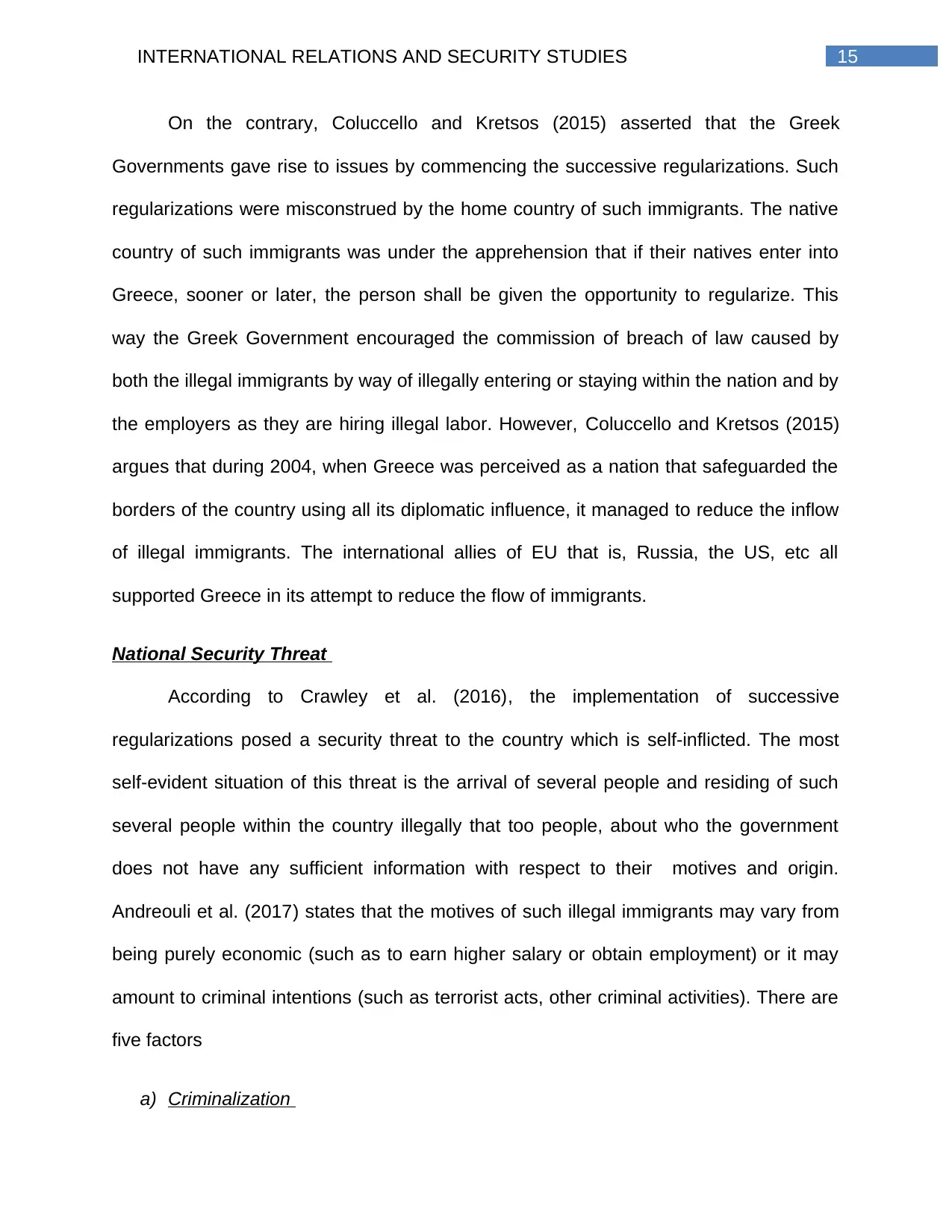
15INTERNATIONAL RELATIONS AND SECURITY STUDIES
On the contrary, Coluccello and Kretsos (2015) asserted that the Greek
Governments gave rise to issues by commencing the successive regularizations. Such
regularizations were misconstrued by the home country of such immigrants. The native
country of such immigrants was under the apprehension that if their natives enter into
Greece, sooner or later, the person shall be given the opportunity to regularize. This
way the Greek Government encouraged the commission of breach of law caused by
both the illegal immigrants by way of illegally entering or staying within the nation and by
the employers as they are hiring illegal labor. However, Coluccello and Kretsos (2015)
argues that during 2004, when Greece was perceived as a nation that safeguarded the
borders of the country using all its diplomatic influence, it managed to reduce the inflow
of illegal immigrants. The international allies of EU that is, Russia, the US, etc all
supported Greece in its attempt to reduce the flow of immigrants.
National Security Threat
According to Crawley et al. (2016), the implementation of successive
regularizations posed a security threat to the country which is self-inflicted. The most
self-evident situation of this threat is the arrival of several people and residing of such
several people within the country illegally that too people, about who the government
does not have any sufficient information with respect to their motives and origin.
Andreouli et al. (2017) states that the motives of such illegal immigrants may vary from
being purely economic (such as to earn higher salary or obtain employment) or it may
amount to criminal intentions (such as terrorist acts, other criminal activities). There are
five factors
a) Criminalization
On the contrary, Coluccello and Kretsos (2015) asserted that the Greek
Governments gave rise to issues by commencing the successive regularizations. Such
regularizations were misconstrued by the home country of such immigrants. The native
country of such immigrants was under the apprehension that if their natives enter into
Greece, sooner or later, the person shall be given the opportunity to regularize. This
way the Greek Government encouraged the commission of breach of law caused by
both the illegal immigrants by way of illegally entering or staying within the nation and by
the employers as they are hiring illegal labor. However, Coluccello and Kretsos (2015)
argues that during 2004, when Greece was perceived as a nation that safeguarded the
borders of the country using all its diplomatic influence, it managed to reduce the inflow
of illegal immigrants. The international allies of EU that is, Russia, the US, etc all
supported Greece in its attempt to reduce the flow of immigrants.
National Security Threat
According to Crawley et al. (2016), the implementation of successive
regularizations posed a security threat to the country which is self-inflicted. The most
self-evident situation of this threat is the arrival of several people and residing of such
several people within the country illegally that too people, about who the government
does not have any sufficient information with respect to their motives and origin.
Andreouli et al. (2017) states that the motives of such illegal immigrants may vary from
being purely economic (such as to earn higher salary or obtain employment) or it may
amount to criminal intentions (such as terrorist acts, other criminal activities). There are
five factors
a) Criminalization
Paraphrase This Document
Need a fresh take? Get an instant paraphrase of this document with our AI Paraphraser
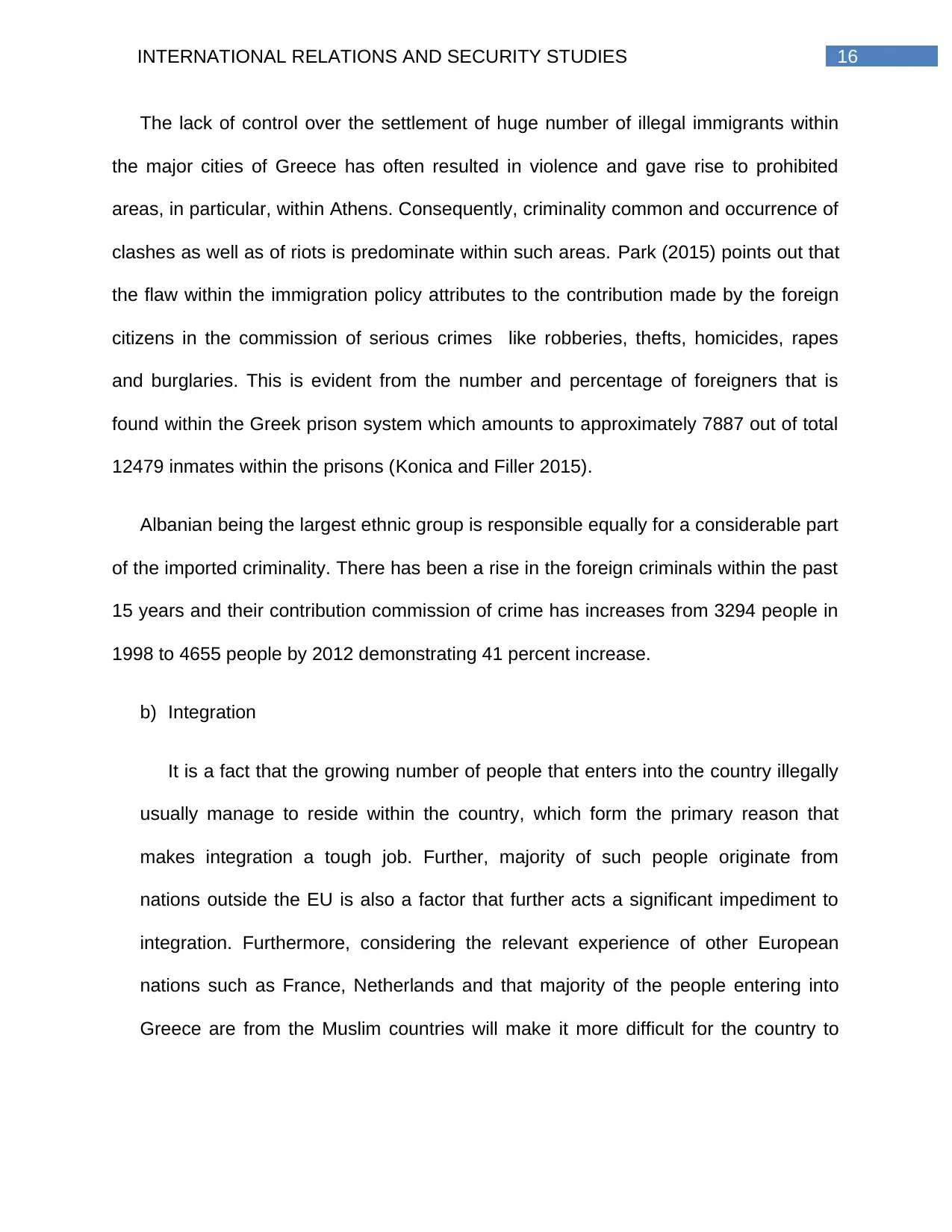
16INTERNATIONAL RELATIONS AND SECURITY STUDIES
The lack of control over the settlement of huge number of illegal immigrants within
the major cities of Greece has often resulted in violence and gave rise to prohibited
areas, in particular, within Athens. Consequently, criminality common and occurrence of
clashes as well as of riots is predominate within such areas. Park (2015) points out that
the flaw within the immigration policy attributes to the contribution made by the foreign
citizens in the commission of serious crimes like robberies, thefts, homicides, rapes
and burglaries. This is evident from the number and percentage of foreigners that is
found within the Greek prison system which amounts to approximately 7887 out of total
12479 inmates within the prisons (Konica and Filler 2015).
Albanian being the largest ethnic group is responsible equally for a considerable part
of the imported criminality. There has been a rise in the foreign criminals within the past
15 years and their contribution commission of crime has increases from 3294 people in
1998 to 4655 people by 2012 demonstrating 41 percent increase.
b) Integration
It is a fact that the growing number of people that enters into the country illegally
usually manage to reside within the country, which form the primary reason that
makes integration a tough job. Further, majority of such people originate from
nations outside the EU is also a factor that further acts a significant impediment to
integration. Furthermore, considering the relevant experience of other European
nations such as France, Netherlands and that majority of the people entering into
Greece are from the Muslim countries will make it more difficult for the country to
The lack of control over the settlement of huge number of illegal immigrants within
the major cities of Greece has often resulted in violence and gave rise to prohibited
areas, in particular, within Athens. Consequently, criminality common and occurrence of
clashes as well as of riots is predominate within such areas. Park (2015) points out that
the flaw within the immigration policy attributes to the contribution made by the foreign
citizens in the commission of serious crimes like robberies, thefts, homicides, rapes
and burglaries. This is evident from the number and percentage of foreigners that is
found within the Greek prison system which amounts to approximately 7887 out of total
12479 inmates within the prisons (Konica and Filler 2015).
Albanian being the largest ethnic group is responsible equally for a considerable part
of the imported criminality. There has been a rise in the foreign criminals within the past
15 years and their contribution commission of crime has increases from 3294 people in
1998 to 4655 people by 2012 demonstrating 41 percent increase.
b) Integration
It is a fact that the growing number of people that enters into the country illegally
usually manage to reside within the country, which form the primary reason that
makes integration a tough job. Further, majority of such people originate from
nations outside the EU is also a factor that further acts a significant impediment to
integration. Furthermore, considering the relevant experience of other European
nations such as France, Netherlands and that majority of the people entering into
Greece are from the Muslim countries will make it more difficult for the country to
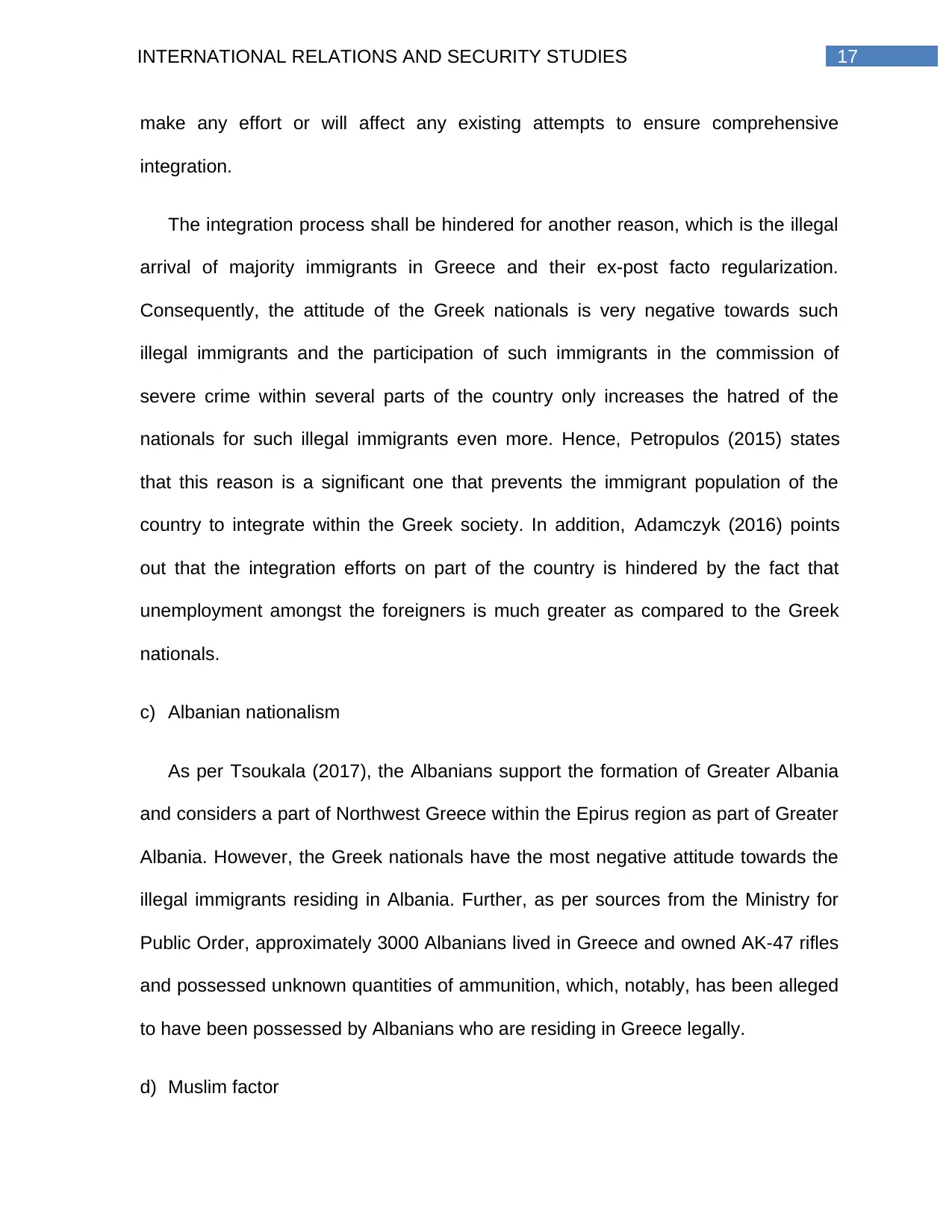
17INTERNATIONAL RELATIONS AND SECURITY STUDIES
make any effort or will affect any existing attempts to ensure comprehensive
integration.
The integration process shall be hindered for another reason, which is the illegal
arrival of majority immigrants in Greece and their ex-post facto regularization.
Consequently, the attitude of the Greek nationals is very negative towards such
illegal immigrants and the participation of such immigrants in the commission of
severe crime within several parts of the country only increases the hatred of the
nationals for such illegal immigrants even more. Hence, Petropulos (2015) states
that this reason is a significant one that prevents the immigrant population of the
country to integrate within the Greek society. In addition, Adamczyk (2016) points
out that the integration efforts on part of the country is hindered by the fact that
unemployment amongst the foreigners is much greater as compared to the Greek
nationals.
c) Albanian nationalism
As per Tsoukala (2017), the Albanians support the formation of Greater Albania
and considers a part of Northwest Greece within the Epirus region as part of Greater
Albania. However, the Greek nationals have the most negative attitude towards the
illegal immigrants residing in Albania. Further, as per sources from the Ministry for
Public Order, approximately 3000 Albanians lived in Greece and owned AK-47 rifles
and possessed unknown quantities of ammunition, which, notably, has been alleged
to have been possessed by Albanians who are residing in Greece legally.
d) Muslim factor
make any effort or will affect any existing attempts to ensure comprehensive
integration.
The integration process shall be hindered for another reason, which is the illegal
arrival of majority immigrants in Greece and their ex-post facto regularization.
Consequently, the attitude of the Greek nationals is very negative towards such
illegal immigrants and the participation of such immigrants in the commission of
severe crime within several parts of the country only increases the hatred of the
nationals for such illegal immigrants even more. Hence, Petropulos (2015) states
that this reason is a significant one that prevents the immigrant population of the
country to integrate within the Greek society. In addition, Adamczyk (2016) points
out that the integration efforts on part of the country is hindered by the fact that
unemployment amongst the foreigners is much greater as compared to the Greek
nationals.
c) Albanian nationalism
As per Tsoukala (2017), the Albanians support the formation of Greater Albania
and considers a part of Northwest Greece within the Epirus region as part of Greater
Albania. However, the Greek nationals have the most negative attitude towards the
illegal immigrants residing in Albania. Further, as per sources from the Ministry for
Public Order, approximately 3000 Albanians lived in Greece and owned AK-47 rifles
and possessed unknown quantities of ammunition, which, notably, has been alleged
to have been possessed by Albanians who are residing in Greece legally.
d) Muslim factor
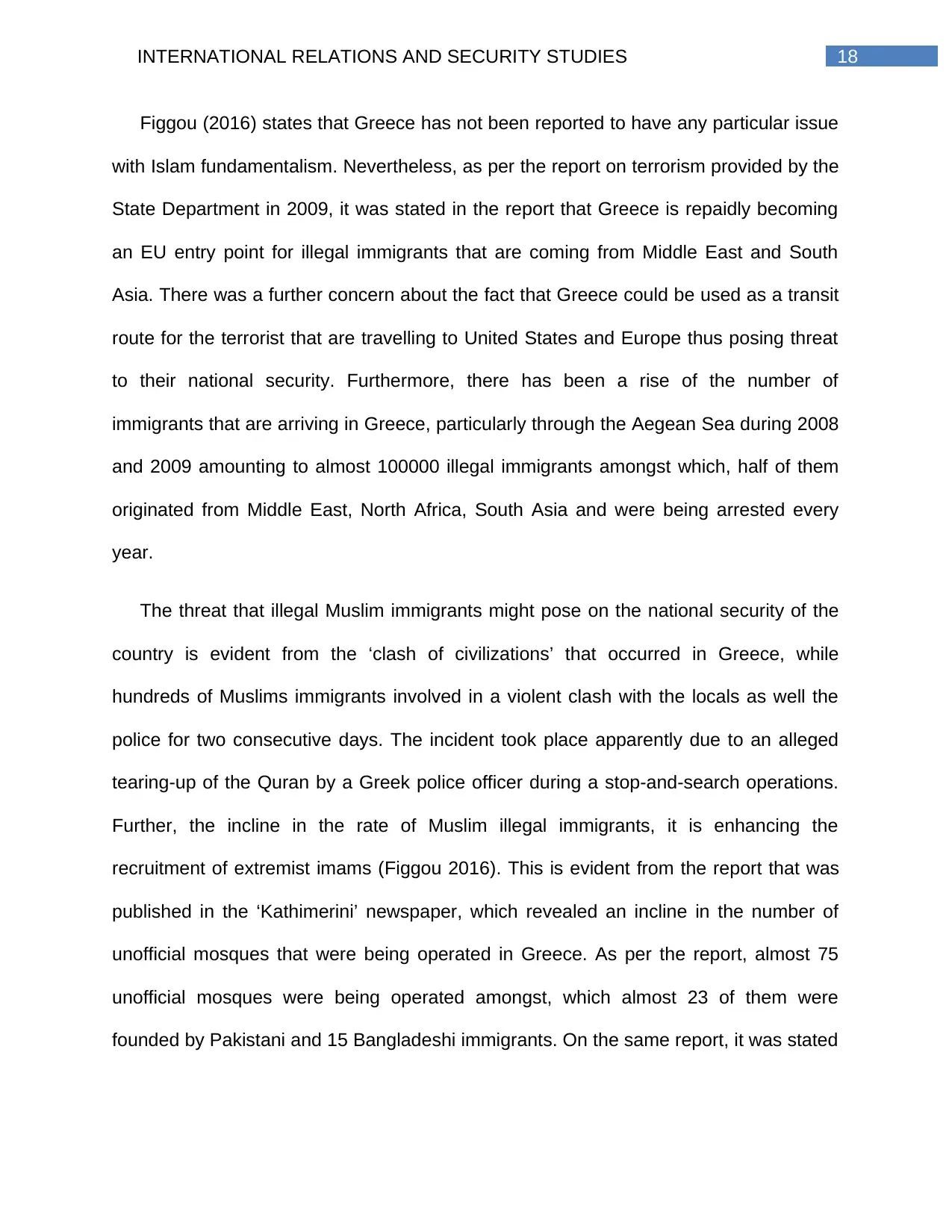
18INTERNATIONAL RELATIONS AND SECURITY STUDIES
Figgou (2016) states that Greece has not been reported to have any particular issue
with Islam fundamentalism. Nevertheless, as per the report on terrorism provided by the
State Department in 2009, it was stated in the report that Greece is repaidly becoming
an EU entry point for illegal immigrants that are coming from Middle East and South
Asia. There was a further concern about the fact that Greece could be used as a transit
route for the terrorist that are travelling to United States and Europe thus posing threat
to their national security. Furthermore, there has been a rise of the number of
immigrants that are arriving in Greece, particularly through the Aegean Sea during 2008
and 2009 amounting to almost 100000 illegal immigrants amongst which, half of them
originated from Middle East, North Africa, South Asia and were being arrested every
year.
The threat that illegal Muslim immigrants might pose on the national security of the
country is evident from the ‘clash of civilizations’ that occurred in Greece, while
hundreds of Muslims immigrants involved in a violent clash with the locals as well the
police for two consecutive days. The incident took place apparently due to an alleged
tearing-up of the Quran by a Greek police officer during a stop-and-search operations.
Further, the incline in the rate of Muslim illegal immigrants, it is enhancing the
recruitment of extremist imams (Figgou 2016). This is evident from the report that was
published in the ‘Kathimerini’ newspaper, which revealed an incline in the number of
unofficial mosques that were being operated in Greece. As per the report, almost 75
unofficial mosques were being operated amongst, which almost 23 of them were
founded by Pakistani and 15 Bangladeshi immigrants. On the same report, it was stated
Figgou (2016) states that Greece has not been reported to have any particular issue
with Islam fundamentalism. Nevertheless, as per the report on terrorism provided by the
State Department in 2009, it was stated in the report that Greece is repaidly becoming
an EU entry point for illegal immigrants that are coming from Middle East and South
Asia. There was a further concern about the fact that Greece could be used as a transit
route for the terrorist that are travelling to United States and Europe thus posing threat
to their national security. Furthermore, there has been a rise of the number of
immigrants that are arriving in Greece, particularly through the Aegean Sea during 2008
and 2009 amounting to almost 100000 illegal immigrants amongst which, half of them
originated from Middle East, North Africa, South Asia and were being arrested every
year.
The threat that illegal Muslim immigrants might pose on the national security of the
country is evident from the ‘clash of civilizations’ that occurred in Greece, while
hundreds of Muslims immigrants involved in a violent clash with the locals as well the
police for two consecutive days. The incident took place apparently due to an alleged
tearing-up of the Quran by a Greek police officer during a stop-and-search operations.
Further, the incline in the rate of Muslim illegal immigrants, it is enhancing the
recruitment of extremist imams (Figgou 2016). This is evident from the report that was
published in the ‘Kathimerini’ newspaper, which revealed an incline in the number of
unofficial mosques that were being operated in Greece. As per the report, almost 75
unofficial mosques were being operated amongst, which almost 23 of them were
founded by Pakistani and 15 Bangladeshi immigrants. On the same report, it was stated
Secure Best Marks with AI Grader
Need help grading? Try our AI Grader for instant feedback on your assignments.
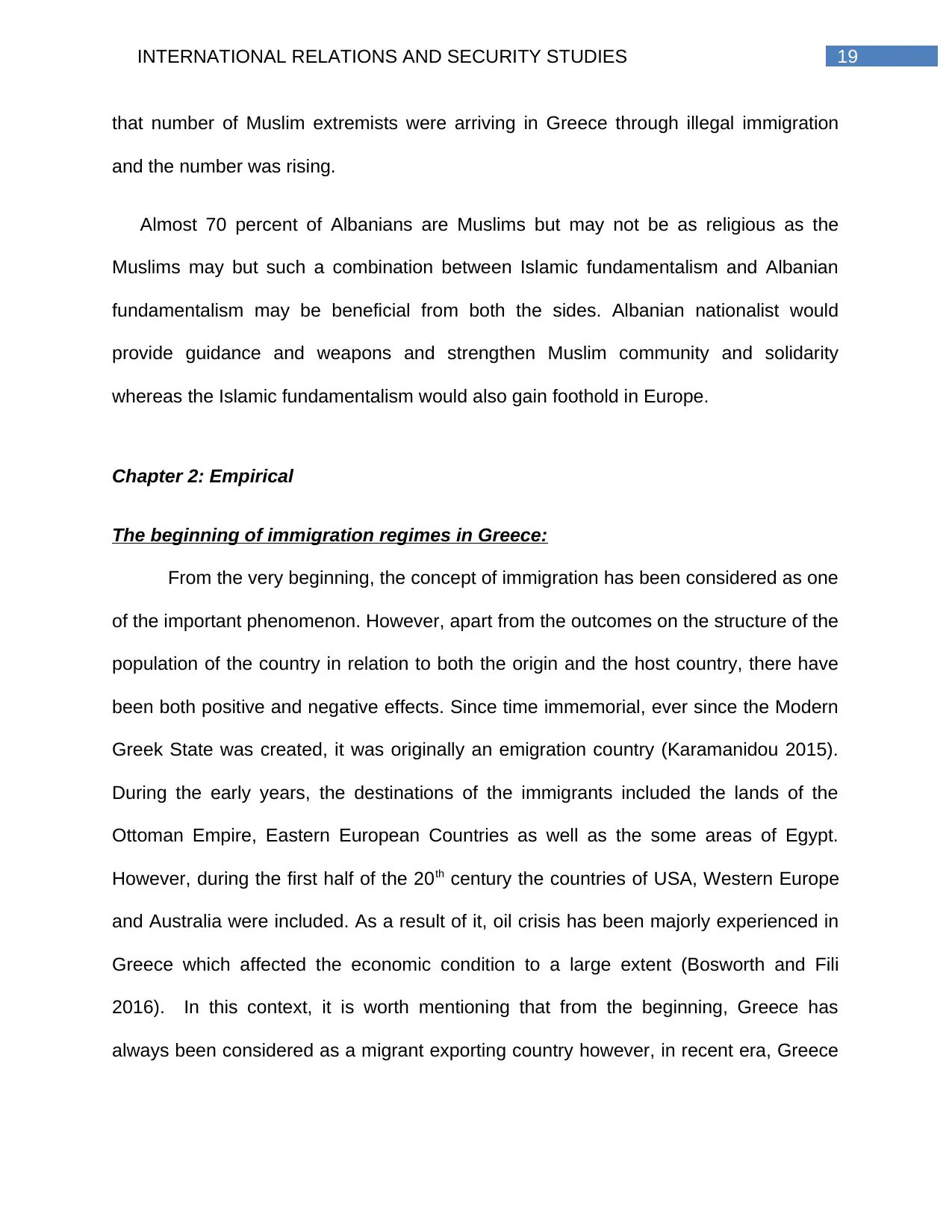
19INTERNATIONAL RELATIONS AND SECURITY STUDIES
that number of Muslim extremists were arriving in Greece through illegal immigration
and the number was rising.
Almost 70 percent of Albanians are Muslims but may not be as religious as the
Muslims may but such a combination between Islamic fundamentalism and Albanian
fundamentalism may be beneficial from both the sides. Albanian nationalist would
provide guidance and weapons and strengthen Muslim community and solidarity
whereas the Islamic fundamentalism would also gain foothold in Europe.
Chapter 2: Empirical
The beginning of immigration regimes in Greece:
From the very beginning, the concept of immigration has been considered as one
of the important phenomenon. However, apart from the outcomes on the structure of the
population of the country in relation to both the origin and the host country, there have
been both positive and negative effects. Since time immemorial, ever since the Modern
Greek State was created, it was originally an emigration country (Karamanidou 2015).
During the early years, the destinations of the immigrants included the lands of the
Ottoman Empire, Eastern European Countries as well as the some areas of Egypt.
However, during the first half of the 20th century the countries of USA, Western Europe
and Australia were included. As a result of it, oil crisis has been majorly experienced in
Greece which affected the economic condition to a large extent (Bosworth and Fili
2016). In this context, it is worth mentioning that from the beginning, Greece has
always been considered as a migrant exporting country however, in recent era, Greece
that number of Muslim extremists were arriving in Greece through illegal immigration
and the number was rising.
Almost 70 percent of Albanians are Muslims but may not be as religious as the
Muslims may but such a combination between Islamic fundamentalism and Albanian
fundamentalism may be beneficial from both the sides. Albanian nationalist would
provide guidance and weapons and strengthen Muslim community and solidarity
whereas the Islamic fundamentalism would also gain foothold in Europe.
Chapter 2: Empirical
The beginning of immigration regimes in Greece:
From the very beginning, the concept of immigration has been considered as one
of the important phenomenon. However, apart from the outcomes on the structure of the
population of the country in relation to both the origin and the host country, there have
been both positive and negative effects. Since time immemorial, ever since the Modern
Greek State was created, it was originally an emigration country (Karamanidou 2015).
During the early years, the destinations of the immigrants included the lands of the
Ottoman Empire, Eastern European Countries as well as the some areas of Egypt.
However, during the first half of the 20th century the countries of USA, Western Europe
and Australia were included. As a result of it, oil crisis has been majorly experienced in
Greece which affected the economic condition to a large extent (Bosworth and Fili
2016). In this context, it is worth mentioning that from the beginning, Greece has
always been considered as a migrant exporting country however, in recent era, Greece
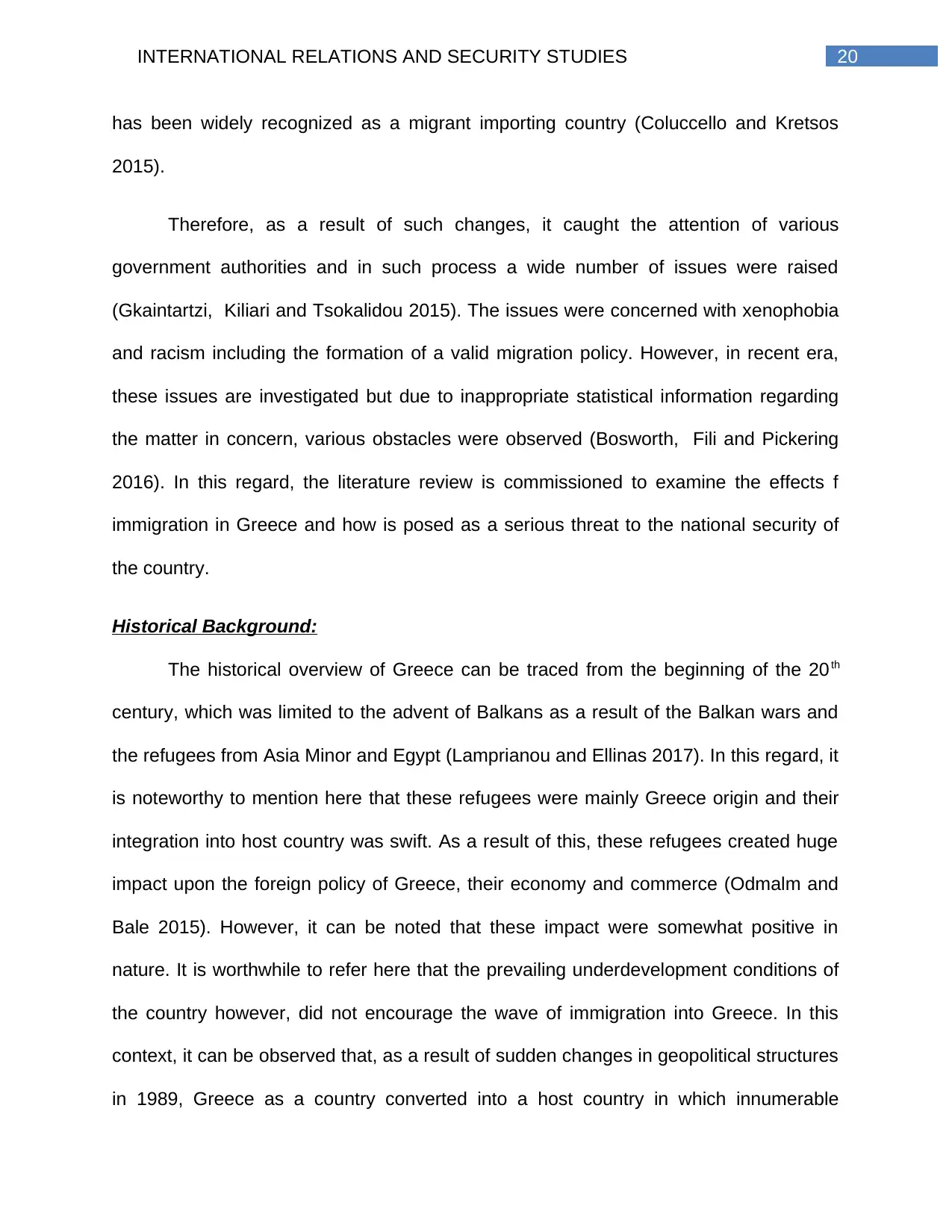
20INTERNATIONAL RELATIONS AND SECURITY STUDIES
has been widely recognized as a migrant importing country (Coluccello and Kretsos
2015).
Therefore, as a result of such changes, it caught the attention of various
government authorities and in such process a wide number of issues were raised
(Gkaintartzi, Kiliari and Tsokalidou 2015). The issues were concerned with xenophobia
and racism including the formation of a valid migration policy. However, in recent era,
these issues are investigated but due to inappropriate statistical information regarding
the matter in concern, various obstacles were observed (Bosworth, Fili and Pickering
2016). In this regard, the literature review is commissioned to examine the effects f
immigration in Greece and how is posed as a serious threat to the national security of
the country.
Historical Background:
The historical overview of Greece can be traced from the beginning of the 20th
century, which was limited to the advent of Balkans as a result of the Balkan wars and
the refugees from Asia Minor and Egypt (Lamprianou and Ellinas 2017). In this regard, it
is noteworthy to mention here that these refugees were mainly Greece origin and their
integration into host country was swift. As a result of this, these refugees created huge
impact upon the foreign policy of Greece, their economy and commerce (Odmalm and
Bale 2015). However, it can be noted that these impact were somewhat positive in
nature. It is worthwhile to refer here that the prevailing underdevelopment conditions of
the country however, did not encourage the wave of immigration into Greece. In this
context, it can be observed that, as a result of sudden changes in geopolitical structures
in 1989, Greece as a country converted into a host country in which innumerable
has been widely recognized as a migrant importing country (Coluccello and Kretsos
2015).
Therefore, as a result of such changes, it caught the attention of various
government authorities and in such process a wide number of issues were raised
(Gkaintartzi, Kiliari and Tsokalidou 2015). The issues were concerned with xenophobia
and racism including the formation of a valid migration policy. However, in recent era,
these issues are investigated but due to inappropriate statistical information regarding
the matter in concern, various obstacles were observed (Bosworth, Fili and Pickering
2016). In this regard, the literature review is commissioned to examine the effects f
immigration in Greece and how is posed as a serious threat to the national security of
the country.
Historical Background:
The historical overview of Greece can be traced from the beginning of the 20th
century, which was limited to the advent of Balkans as a result of the Balkan wars and
the refugees from Asia Minor and Egypt (Lamprianou and Ellinas 2017). In this regard, it
is noteworthy to mention here that these refugees were mainly Greece origin and their
integration into host country was swift. As a result of this, these refugees created huge
impact upon the foreign policy of Greece, their economy and commerce (Odmalm and
Bale 2015). However, it can be noted that these impact were somewhat positive in
nature. It is worthwhile to refer here that the prevailing underdevelopment conditions of
the country however, did not encourage the wave of immigration into Greece. In this
context, it can be observed that, as a result of sudden changes in geopolitical structures
in 1989, Greece as a country converted into a host country in which innumerable

21INTERNATIONAL RELATIONS AND SECURITY STUDIES
number of undocumented immigrants settled down from the countries of eastern and
central Europe, Soviet Union as well as the Third World Countries (Michail and Christou
2016). Therefore, it can be mentioned that there has been drastic increase of
immigrants which in turn created unfavorable burden on the part of the government
authorities and the population of the country as a whole (Cyril and Renzaho 2016). The
new situation in Greece as a result of rapid increase in the number of immigrants has
been recognized as a situation identified as both administrative and political confusion
(Kadianaki and Andreouli 2017). This is due to the reason of over-representation of
legal immigrants into the country which created bad influence upon the employment
conditions of Greece degrading the economic structure.
Issues regarding undocumented immigrants:
It is noteworthy to mention here that, modern scholars have hotly debated the
issue regarding immigration in Greece. Modern authors stated that immigrants can be
summarized into two different kinds- documented or legal immigrants and
undocumented immigrants. According to modern autocrats, the documented immigrants
contributed a lot towards the payment of social security funds and taxes (Gialis, Herod
and Myridis 2014). In this regard, they contributed adequately towards the development
of healthcare services and the social infrastructure (Labrianidis and Pratsinakis 2016).
However, on the other hand, undocumented immigrants are subjected to indirect
taxation, which includes excise duties, and value added taxes. In the perspective of
contemporary scholars, that the income rates of the legal immigrants are low and
therefore most of them do not pay income taxes however; the income of the
undocumented immigrants are even lower than that of the documented immigrants
number of undocumented immigrants settled down from the countries of eastern and
central Europe, Soviet Union as well as the Third World Countries (Michail and Christou
2016). Therefore, it can be mentioned that there has been drastic increase of
immigrants which in turn created unfavorable burden on the part of the government
authorities and the population of the country as a whole (Cyril and Renzaho 2016). The
new situation in Greece as a result of rapid increase in the number of immigrants has
been recognized as a situation identified as both administrative and political confusion
(Kadianaki and Andreouli 2017). This is due to the reason of over-representation of
legal immigrants into the country which created bad influence upon the employment
conditions of Greece degrading the economic structure.
Issues regarding undocumented immigrants:
It is noteworthy to mention here that, modern scholars have hotly debated the
issue regarding immigration in Greece. Modern authors stated that immigrants can be
summarized into two different kinds- documented or legal immigrants and
undocumented immigrants. According to modern autocrats, the documented immigrants
contributed a lot towards the payment of social security funds and taxes (Gialis, Herod
and Myridis 2014). In this regard, they contributed adequately towards the development
of healthcare services and the social infrastructure (Labrianidis and Pratsinakis 2016).
However, on the other hand, undocumented immigrants are subjected to indirect
taxation, which includes excise duties, and value added taxes. In the perspective of
contemporary scholars, that the income rates of the legal immigrants are low and
therefore most of them do not pay income taxes however; the income of the
undocumented immigrants are even lower than that of the documented immigrants
Paraphrase This Document
Need a fresh take? Get an instant paraphrase of this document with our AI Paraphraser
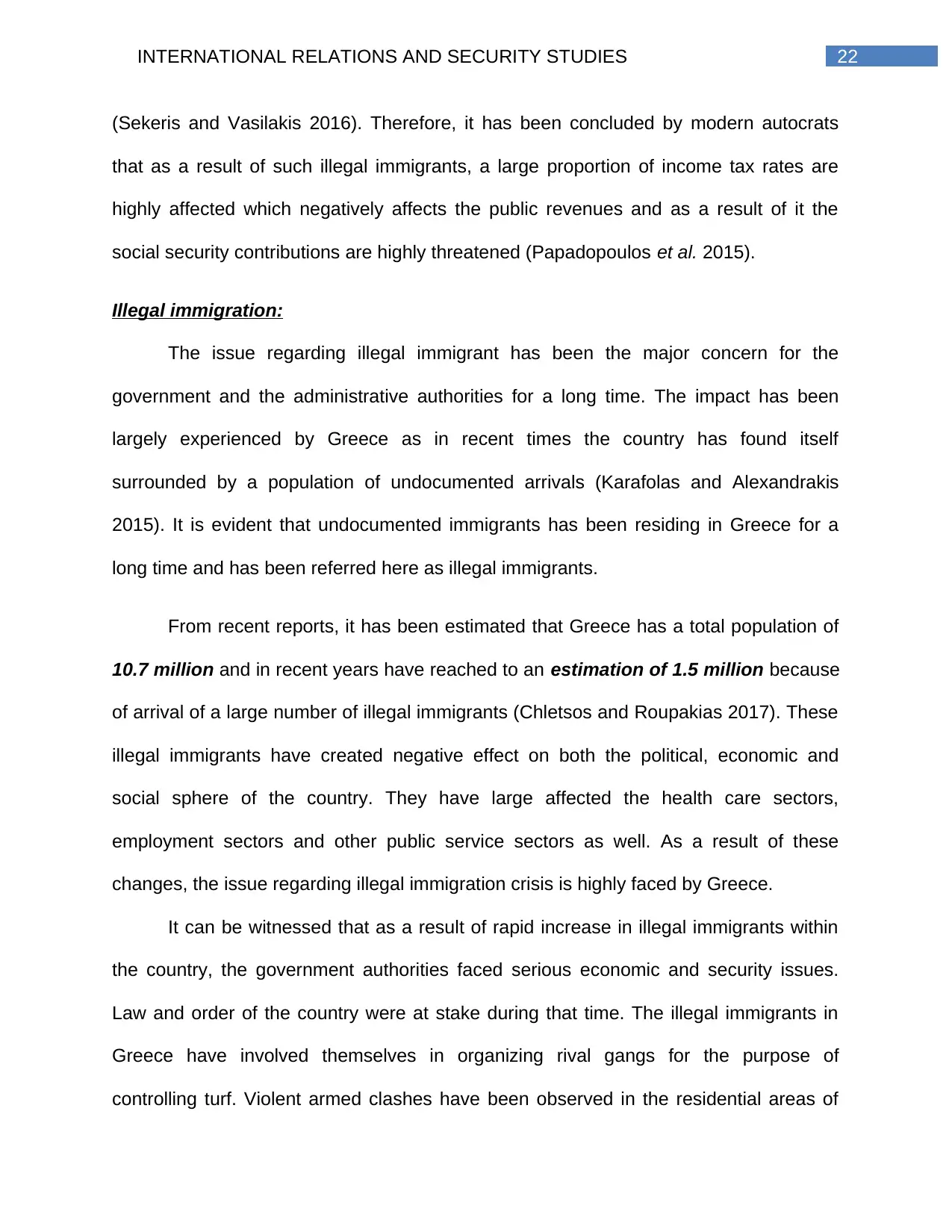
22INTERNATIONAL RELATIONS AND SECURITY STUDIES
(Sekeris and Vasilakis 2016). Therefore, it has been concluded by modern autocrats
that as a result of such illegal immigrants, a large proportion of income tax rates are
highly affected which negatively affects the public revenues and as a result of it the
social security contributions are highly threatened (Papadopoulos et al. 2015).
Illegal immigration:
The issue regarding illegal immigrant has been the major concern for the
government and the administrative authorities for a long time. The impact has been
largely experienced by Greece as in recent times the country has found itself
surrounded by a population of undocumented arrivals (Karafolas and Alexandrakis
2015). It is evident that undocumented immigrants has been residing in Greece for a
long time and has been referred here as illegal immigrants.
From recent reports, it has been estimated that Greece has a total population of
10.7 million and in recent years have reached to an estimation of 1.5 million because
of arrival of a large number of illegal immigrants (Chletsos and Roupakias 2017). These
illegal immigrants have created negative effect on both the political, economic and
social sphere of the country. They have large affected the health care sectors,
employment sectors and other public service sectors as well. As a result of these
changes, the issue regarding illegal immigration crisis is highly faced by Greece.
It can be witnessed that as a result of rapid increase in illegal immigrants within
the country, the government authorities faced serious economic and security issues.
Law and order of the country were at stake during that time. The illegal immigrants in
Greece have involved themselves in organizing rival gangs for the purpose of
controlling turf. Violent armed clashes have been observed in the residential areas of
(Sekeris and Vasilakis 2016). Therefore, it has been concluded by modern autocrats
that as a result of such illegal immigrants, a large proportion of income tax rates are
highly affected which negatively affects the public revenues and as a result of it the
social security contributions are highly threatened (Papadopoulos et al. 2015).
Illegal immigration:
The issue regarding illegal immigrant has been the major concern for the
government and the administrative authorities for a long time. The impact has been
largely experienced by Greece as in recent times the country has found itself
surrounded by a population of undocumented arrivals (Karafolas and Alexandrakis
2015). It is evident that undocumented immigrants has been residing in Greece for a
long time and has been referred here as illegal immigrants.
From recent reports, it has been estimated that Greece has a total population of
10.7 million and in recent years have reached to an estimation of 1.5 million because
of arrival of a large number of illegal immigrants (Chletsos and Roupakias 2017). These
illegal immigrants have created negative effect on both the political, economic and
social sphere of the country. They have large affected the health care sectors,
employment sectors and other public service sectors as well. As a result of these
changes, the issue regarding illegal immigration crisis is highly faced by Greece.
It can be witnessed that as a result of rapid increase in illegal immigrants within
the country, the government authorities faced serious economic and security issues.
Law and order of the country were at stake during that time. The illegal immigrants in
Greece have involved themselves in organizing rival gangs for the purpose of
controlling turf. Violent armed clashes have been observed in the residential areas of
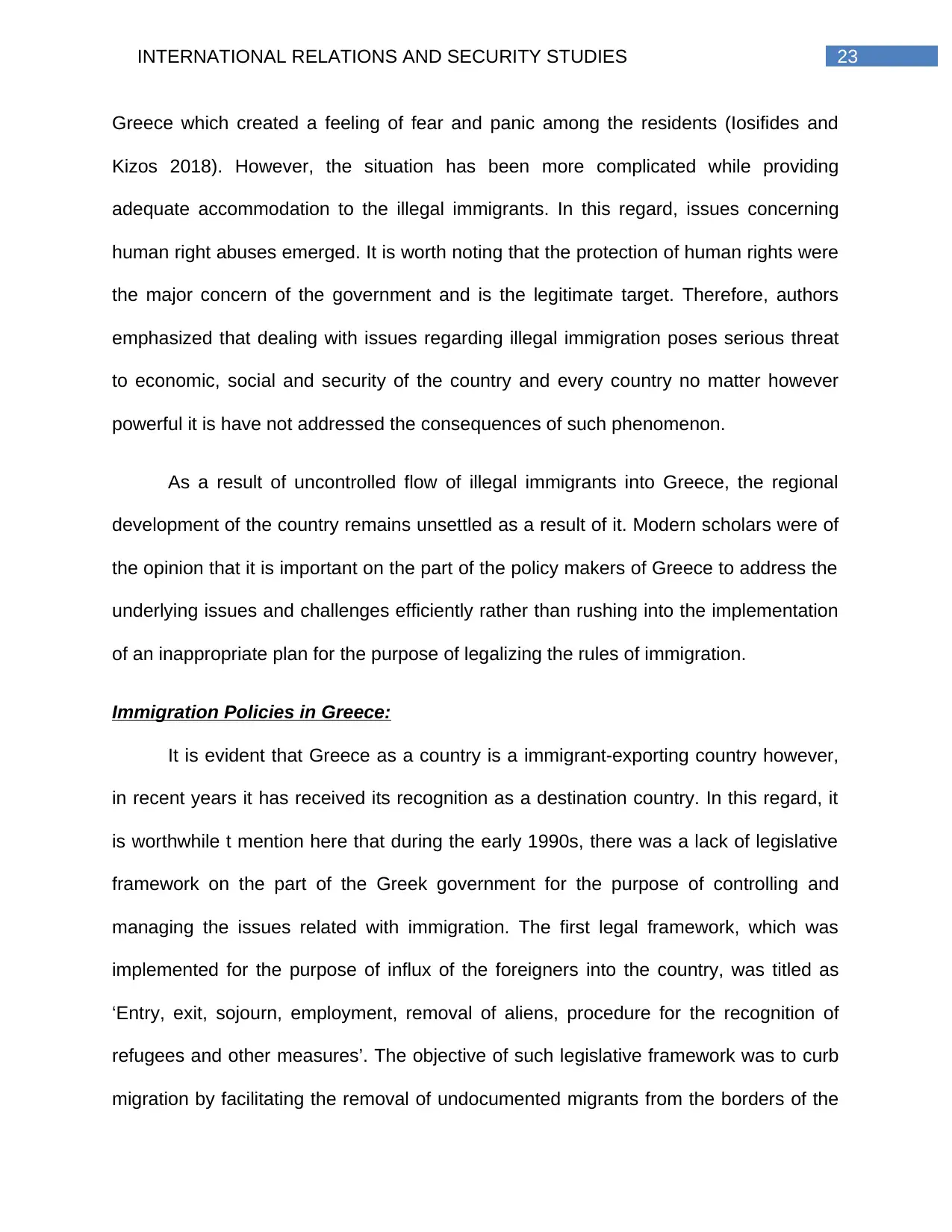
23INTERNATIONAL RELATIONS AND SECURITY STUDIES
Greece which created a feeling of fear and panic among the residents (Iosifides and
Kizos 2018). However, the situation has been more complicated while providing
adequate accommodation to the illegal immigrants. In this regard, issues concerning
human right abuses emerged. It is worth noting that the protection of human rights were
the major concern of the government and is the legitimate target. Therefore, authors
emphasized that dealing with issues regarding illegal immigration poses serious threat
to economic, social and security of the country and every country no matter however
powerful it is have not addressed the consequences of such phenomenon.
As a result of uncontrolled flow of illegal immigrants into Greece, the regional
development of the country remains unsettled as a result of it. Modern scholars were of
the opinion that it is important on the part of the policy makers of Greece to address the
underlying issues and challenges efficiently rather than rushing into the implementation
of an inappropriate plan for the purpose of legalizing the rules of immigration.
Immigration Policies in Greece:
It is evident that Greece as a country is a immigrant-exporting country however,
in recent years it has received its recognition as a destination country. In this regard, it
is worthwhile t mention here that during the early 1990s, there was a lack of legislative
framework on the part of the Greek government for the purpose of controlling and
managing the issues related with immigration. The first legal framework, which was
implemented for the purpose of influx of the foreigners into the country, was titled as
‘Entry, exit, sojourn, employment, removal of aliens, procedure for the recognition of
refugees and other measures’. The objective of such legislative framework was to curb
migration by facilitating the removal of undocumented migrants from the borders of the
Greece which created a feeling of fear and panic among the residents (Iosifides and
Kizos 2018). However, the situation has been more complicated while providing
adequate accommodation to the illegal immigrants. In this regard, issues concerning
human right abuses emerged. It is worth noting that the protection of human rights were
the major concern of the government and is the legitimate target. Therefore, authors
emphasized that dealing with issues regarding illegal immigration poses serious threat
to economic, social and security of the country and every country no matter however
powerful it is have not addressed the consequences of such phenomenon.
As a result of uncontrolled flow of illegal immigrants into Greece, the regional
development of the country remains unsettled as a result of it. Modern scholars were of
the opinion that it is important on the part of the policy makers of Greece to address the
underlying issues and challenges efficiently rather than rushing into the implementation
of an inappropriate plan for the purpose of legalizing the rules of immigration.
Immigration Policies in Greece:
It is evident that Greece as a country is a immigrant-exporting country however,
in recent years it has received its recognition as a destination country. In this regard, it
is worthwhile t mention here that during the early 1990s, there was a lack of legislative
framework on the part of the Greek government for the purpose of controlling and
managing the issues related with immigration. The first legal framework, which was
implemented for the purpose of influx of the foreigners into the country, was titled as
‘Entry, exit, sojourn, employment, removal of aliens, procedure for the recognition of
refugees and other measures’. The objective of such legislative framework was to curb
migration by facilitating the removal of undocumented migrants from the borders of the
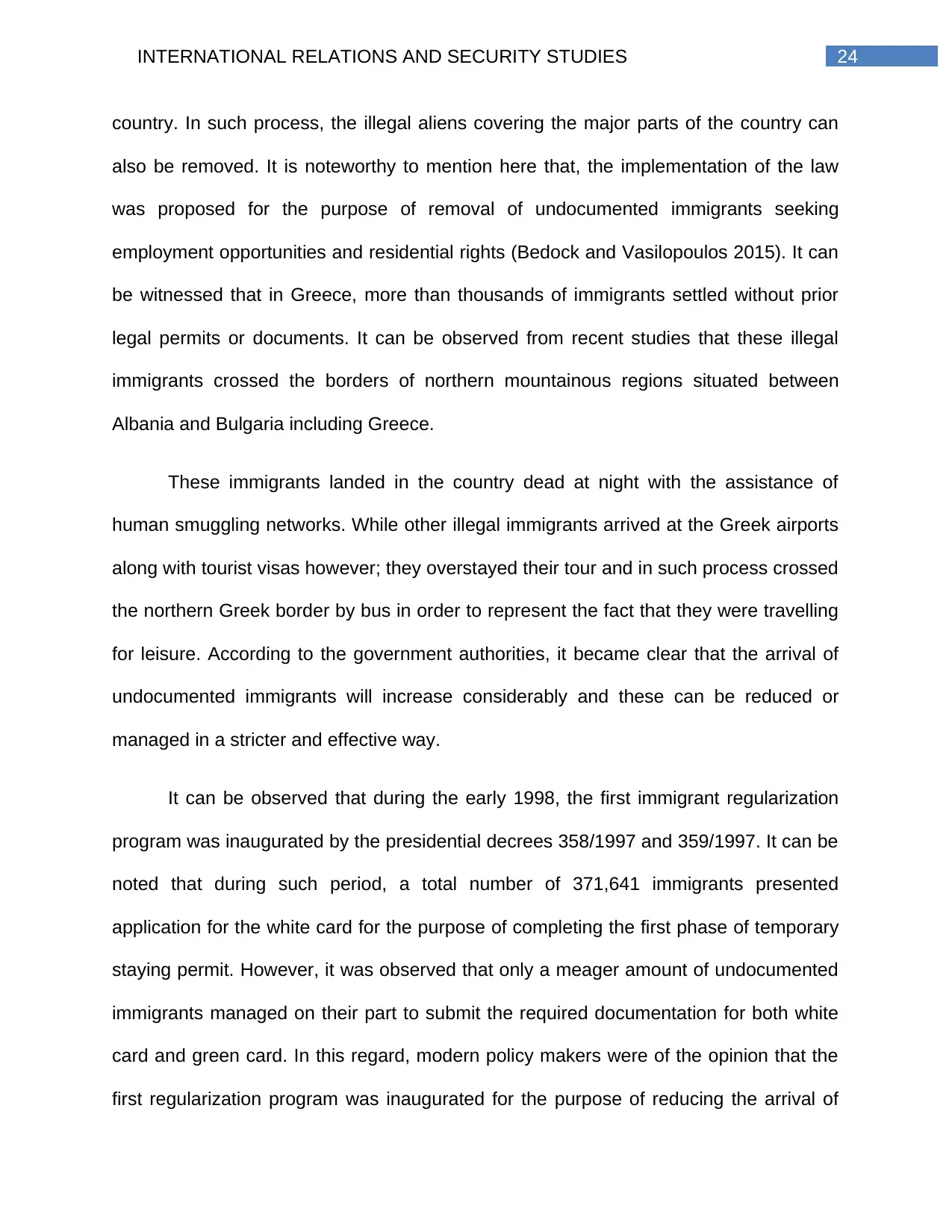
24INTERNATIONAL RELATIONS AND SECURITY STUDIES
country. In such process, the illegal aliens covering the major parts of the country can
also be removed. It is noteworthy to mention here that, the implementation of the law
was proposed for the purpose of removal of undocumented immigrants seeking
employment opportunities and residential rights (Bedock and Vasilopoulos 2015). It can
be witnessed that in Greece, more than thousands of immigrants settled without prior
legal permits or documents. It can be observed from recent studies that these illegal
immigrants crossed the borders of northern mountainous regions situated between
Albania and Bulgaria including Greece.
These immigrants landed in the country dead at night with the assistance of
human smuggling networks. While other illegal immigrants arrived at the Greek airports
along with tourist visas however; they overstayed their tour and in such process crossed
the northern Greek border by bus in order to represent the fact that they were travelling
for leisure. According to the government authorities, it became clear that the arrival of
undocumented immigrants will increase considerably and these can be reduced or
managed in a stricter and effective way.
It can be observed that during the early 1998, the first immigrant regularization
program was inaugurated by the presidential decrees 358/1997 and 359/1997. It can be
noted that during such period, a total number of 371,641 immigrants presented
application for the white card for the purpose of completing the first phase of temporary
staying permit. However, it was observed that only a meager amount of undocumented
immigrants managed on their part to submit the required documentation for both white
card and green card. In this regard, modern policy makers were of the opinion that the
first regularization program was inaugurated for the purpose of reducing the arrival of
country. In such process, the illegal aliens covering the major parts of the country can
also be removed. It is noteworthy to mention here that, the implementation of the law
was proposed for the purpose of removal of undocumented immigrants seeking
employment opportunities and residential rights (Bedock and Vasilopoulos 2015). It can
be witnessed that in Greece, more than thousands of immigrants settled without prior
legal permits or documents. It can be observed from recent studies that these illegal
immigrants crossed the borders of northern mountainous regions situated between
Albania and Bulgaria including Greece.
These immigrants landed in the country dead at night with the assistance of
human smuggling networks. While other illegal immigrants arrived at the Greek airports
along with tourist visas however; they overstayed their tour and in such process crossed
the northern Greek border by bus in order to represent the fact that they were travelling
for leisure. According to the government authorities, it became clear that the arrival of
undocumented immigrants will increase considerably and these can be reduced or
managed in a stricter and effective way.
It can be observed that during the early 1998, the first immigrant regularization
program was inaugurated by the presidential decrees 358/1997 and 359/1997. It can be
noted that during such period, a total number of 371,641 immigrants presented
application for the white card for the purpose of completing the first phase of temporary
staying permit. However, it was observed that only a meager amount of undocumented
immigrants managed on their part to submit the required documentation for both white
card and green card. In this regard, modern policy makers were of the opinion that the
first regularization program was inaugurated for the purpose of reducing the arrival of
Secure Best Marks with AI Grader
Need help grading? Try our AI Grader for instant feedback on your assignments.
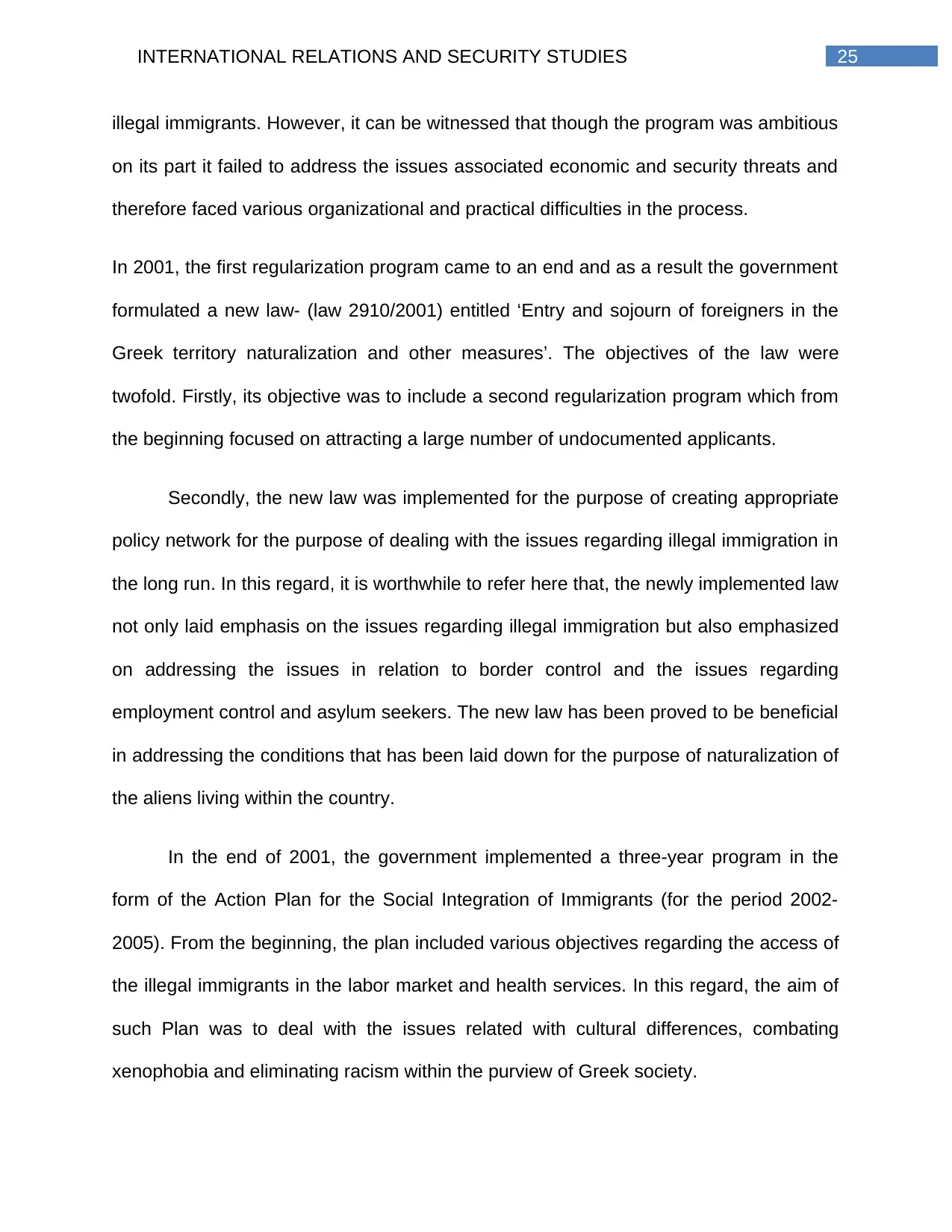
25INTERNATIONAL RELATIONS AND SECURITY STUDIES
illegal immigrants. However, it can be witnessed that though the program was ambitious
on its part it failed to address the issues associated economic and security threats and
therefore faced various organizational and practical difficulties in the process.
In 2001, the first regularization program came to an end and as a result the government
formulated a new law- (law 2910/2001) entitled ‘Entry and sojourn of foreigners in the
Greek territory naturalization and other measures’. The objectives of the law were
twofold. Firstly, its objective was to include a second regularization program which from
the beginning focused on attracting a large number of undocumented applicants.
Secondly, the new law was implemented for the purpose of creating appropriate
policy network for the purpose of dealing with the issues regarding illegal immigration in
the long run. In this regard, it is worthwhile to refer here that, the newly implemented law
not only laid emphasis on the issues regarding illegal immigration but also emphasized
on addressing the issues in relation to border control and the issues regarding
employment control and asylum seekers. The new law has been proved to be beneficial
in addressing the conditions that has been laid down for the purpose of naturalization of
the aliens living within the country.
In the end of 2001, the government implemented a three-year program in the
form of the Action Plan for the Social Integration of Immigrants (for the period 2002-
2005). From the beginning, the plan included various objectives regarding the access of
the illegal immigrants in the labor market and health services. In this regard, the aim of
such Plan was to deal with the issues related with cultural differences, combating
xenophobia and eliminating racism within the purview of Greek society.
illegal immigrants. However, it can be witnessed that though the program was ambitious
on its part it failed to address the issues associated economic and security threats and
therefore faced various organizational and practical difficulties in the process.
In 2001, the first regularization program came to an end and as a result the government
formulated a new law- (law 2910/2001) entitled ‘Entry and sojourn of foreigners in the
Greek territory naturalization and other measures’. The objectives of the law were
twofold. Firstly, its objective was to include a second regularization program which from
the beginning focused on attracting a large number of undocumented applicants.
Secondly, the new law was implemented for the purpose of creating appropriate
policy network for the purpose of dealing with the issues regarding illegal immigration in
the long run. In this regard, it is worthwhile to refer here that, the newly implemented law
not only laid emphasis on the issues regarding illegal immigration but also emphasized
on addressing the issues in relation to border control and the issues regarding
employment control and asylum seekers. The new law has been proved to be beneficial
in addressing the conditions that has been laid down for the purpose of naturalization of
the aliens living within the country.
In the end of 2001, the government implemented a three-year program in the
form of the Action Plan for the Social Integration of Immigrants (for the period 2002-
2005). From the beginning, the plan included various objectives regarding the access of
the illegal immigrants in the labor market and health services. In this regard, the aim of
such Plan was to deal with the issues related with cultural differences, combating
xenophobia and eliminating racism within the purview of Greek society.
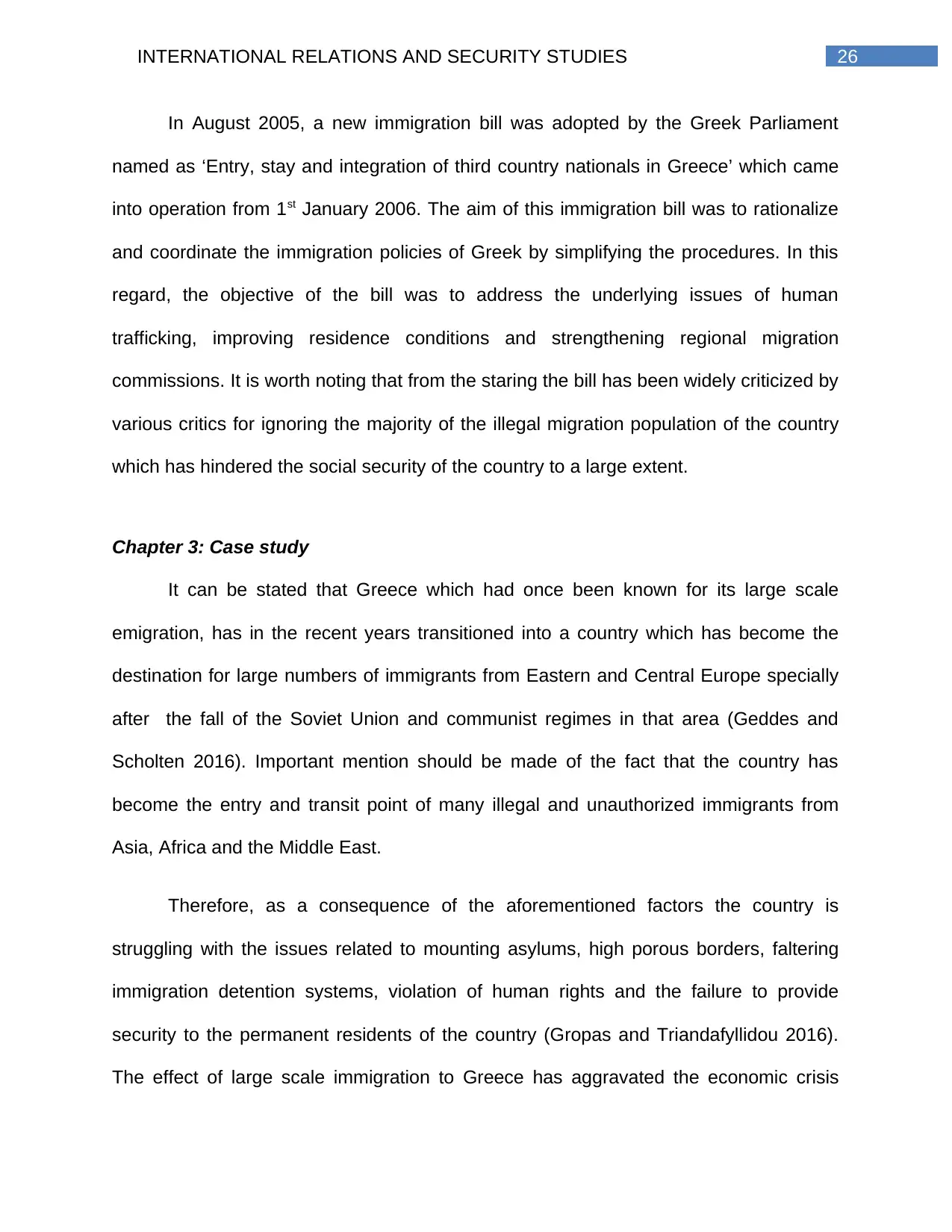
26INTERNATIONAL RELATIONS AND SECURITY STUDIES
In August 2005, a new immigration bill was adopted by the Greek Parliament
named as ‘Entry, stay and integration of third country nationals in Greece’ which came
into operation from 1st January 2006. The aim of this immigration bill was to rationalize
and coordinate the immigration policies of Greek by simplifying the procedures. In this
regard, the objective of the bill was to address the underlying issues of human
trafficking, improving residence conditions and strengthening regional migration
commissions. It is worth noting that from the staring the bill has been widely criticized by
various critics for ignoring the majority of the illegal migration population of the country
which has hindered the social security of the country to a large extent.
Chapter 3: Case study
It can be stated that Greece which had once been known for its large scale
emigration, has in the recent years transitioned into a country which has become the
destination for large numbers of immigrants from Eastern and Central Europe specially
after the fall of the Soviet Union and communist regimes in that area (Geddes and
Scholten 2016). Important mention should be made of the fact that the country has
become the entry and transit point of many illegal and unauthorized immigrants from
Asia, Africa and the Middle East.
Therefore, as a consequence of the aforementioned factors the country is
struggling with the issues related to mounting asylums, high porous borders, faltering
immigration detention systems, violation of human rights and the failure to provide
security to the permanent residents of the country (Gropas and Triandafyllidou 2016).
The effect of large scale immigration to Greece has aggravated the economic crisis
In August 2005, a new immigration bill was adopted by the Greek Parliament
named as ‘Entry, stay and integration of third country nationals in Greece’ which came
into operation from 1st January 2006. The aim of this immigration bill was to rationalize
and coordinate the immigration policies of Greek by simplifying the procedures. In this
regard, the objective of the bill was to address the underlying issues of human
trafficking, improving residence conditions and strengthening regional migration
commissions. It is worth noting that from the staring the bill has been widely criticized by
various critics for ignoring the majority of the illegal migration population of the country
which has hindered the social security of the country to a large extent.
Chapter 3: Case study
It can be stated that Greece which had once been known for its large scale
emigration, has in the recent years transitioned into a country which has become the
destination for large numbers of immigrants from Eastern and Central Europe specially
after the fall of the Soviet Union and communist regimes in that area (Geddes and
Scholten 2016). Important mention should be made of the fact that the country has
become the entry and transit point of many illegal and unauthorized immigrants from
Asia, Africa and the Middle East.
Therefore, as a consequence of the aforementioned factors the country is
struggling with the issues related to mounting asylums, high porous borders, faltering
immigration detention systems, violation of human rights and the failure to provide
security to the permanent residents of the country (Gropas and Triandafyllidou 2016).
The effect of large scale immigration to Greece has aggravated the economic crisis
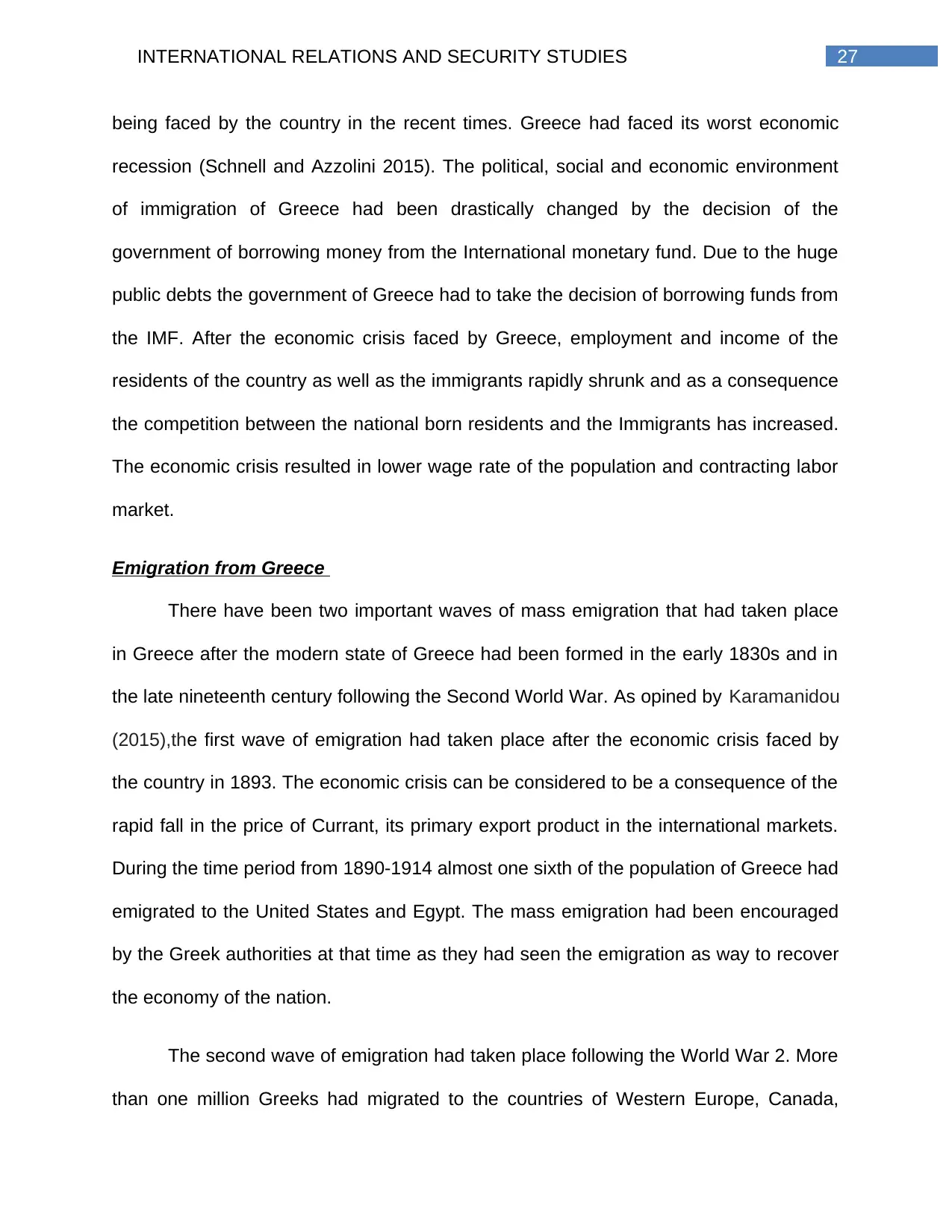
27INTERNATIONAL RELATIONS AND SECURITY STUDIES
being faced by the country in the recent times. Greece had faced its worst economic
recession (Schnell and Azzolini 2015). The political, social and economic environment
of immigration of Greece had been drastically changed by the decision of the
government of borrowing money from the International monetary fund. Due to the huge
public debts the government of Greece had to take the decision of borrowing funds from
the IMF. After the economic crisis faced by Greece, employment and income of the
residents of the country as well as the immigrants rapidly shrunk and as a consequence
the competition between the national born residents and the Immigrants has increased.
The economic crisis resulted in lower wage rate of the population and contracting labor
market.
Emigration from Greece
There have been two important waves of mass emigration that had taken place
in Greece after the modern state of Greece had been formed in the early 1830s and in
the late nineteenth century following the Second World War. As opined by Karamanidou
(2015),the first wave of emigration had taken place after the economic crisis faced by
the country in 1893. The economic crisis can be considered to be a consequence of the
rapid fall in the price of Currant, its primary export product in the international markets.
During the time period from 1890-1914 almost one sixth of the population of Greece had
emigrated to the United States and Egypt. The mass emigration had been encouraged
by the Greek authorities at that time as they had seen the emigration as way to recover
the economy of the nation.
The second wave of emigration had taken place following the World War 2. More
than one million Greeks had migrated to the countries of Western Europe, Canada,
being faced by the country in the recent times. Greece had faced its worst economic
recession (Schnell and Azzolini 2015). The political, social and economic environment
of immigration of Greece had been drastically changed by the decision of the
government of borrowing money from the International monetary fund. Due to the huge
public debts the government of Greece had to take the decision of borrowing funds from
the IMF. After the economic crisis faced by Greece, employment and income of the
residents of the country as well as the immigrants rapidly shrunk and as a consequence
the competition between the national born residents and the Immigrants has increased.
The economic crisis resulted in lower wage rate of the population and contracting labor
market.
Emigration from Greece
There have been two important waves of mass emigration that had taken place
in Greece after the modern state of Greece had been formed in the early 1830s and in
the late nineteenth century following the Second World War. As opined by Karamanidou
(2015),the first wave of emigration had taken place after the economic crisis faced by
the country in 1893. The economic crisis can be considered to be a consequence of the
rapid fall in the price of Currant, its primary export product in the international markets.
During the time period from 1890-1914 almost one sixth of the population of Greece had
emigrated to the United States and Egypt. The mass emigration had been encouraged
by the Greek authorities at that time as they had seen the emigration as way to recover
the economy of the nation.
The second wave of emigration had taken place following the World War 2. More
than one million Greeks had migrated to the countries of Western Europe, Canada,
Paraphrase This Document
Need a fresh take? Get an instant paraphrase of this document with our AI Paraphraser
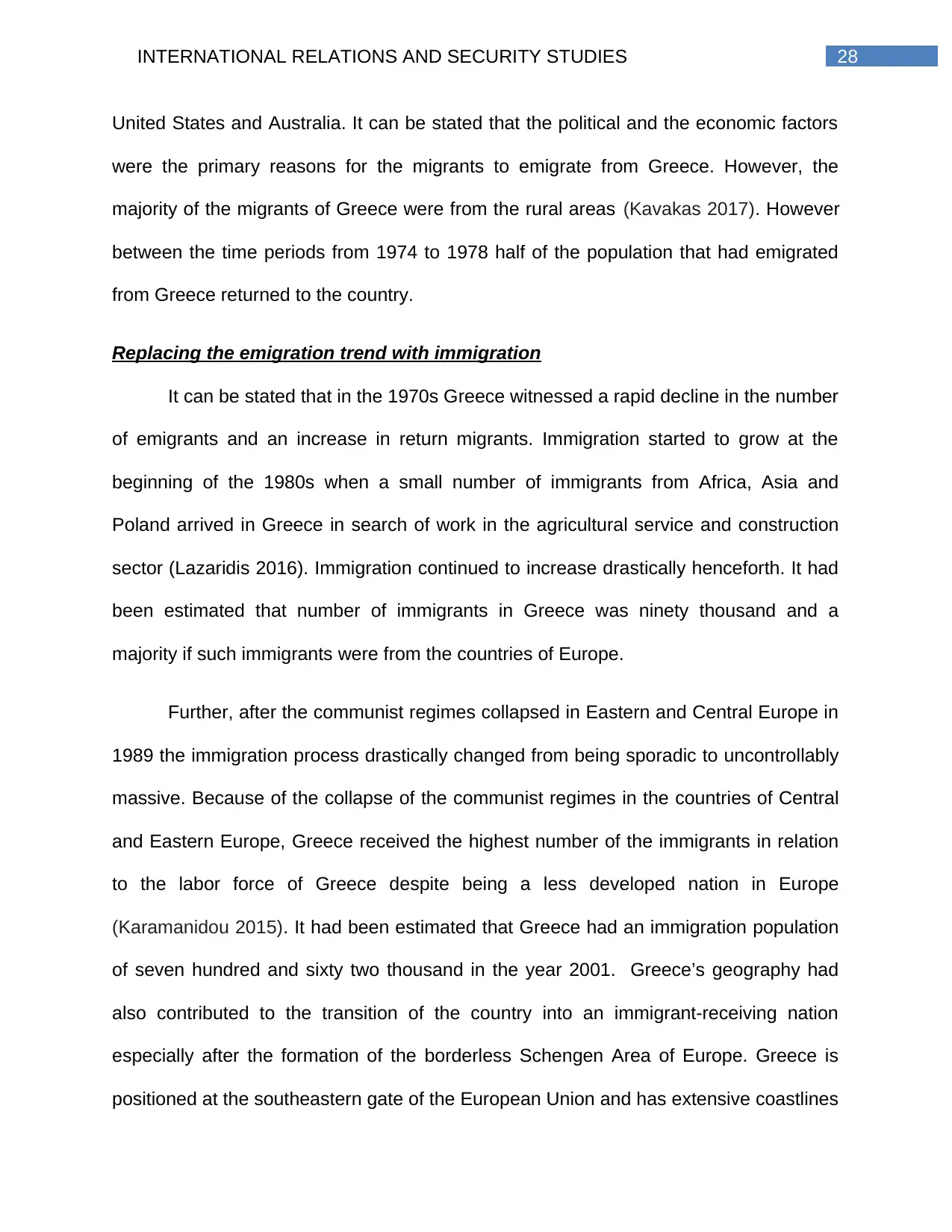
28INTERNATIONAL RELATIONS AND SECURITY STUDIES
United States and Australia. It can be stated that the political and the economic factors
were the primary reasons for the migrants to emigrate from Greece. However, the
majority of the migrants of Greece were from the rural areas (Kavakas 2017). However
between the time periods from 1974 to 1978 half of the population that had emigrated
from Greece returned to the country.
Replacing the emigration trend with immigration
It can be stated that in the 1970s Greece witnessed a rapid decline in the number
of emigrants and an increase in return migrants. Immigration started to grow at the
beginning of the 1980s when a small number of immigrants from Africa, Asia and
Poland arrived in Greece in search of work in the agricultural service and construction
sector (Lazaridis 2016). Immigration continued to increase drastically henceforth. It had
been estimated that number of immigrants in Greece was ninety thousand and a
majority if such immigrants were from the countries of Europe.
Further, after the communist regimes collapsed in Eastern and Central Europe in
1989 the immigration process drastically changed from being sporadic to uncontrollably
massive. Because of the collapse of the communist regimes in the countries of Central
and Eastern Europe, Greece received the highest number of the immigrants in relation
to the labor force of Greece despite being a less developed nation in Europe
(Karamanidou 2015). It had been estimated that Greece had an immigration population
of seven hundred and sixty two thousand in the year 2001. Greece’s geography had
also contributed to the transition of the country into an immigrant-receiving nation
especially after the formation of the borderless Schengen Area of Europe. Greece is
positioned at the southeastern gate of the European Union and has extensive coastlines
United States and Australia. It can be stated that the political and the economic factors
were the primary reasons for the migrants to emigrate from Greece. However, the
majority of the migrants of Greece were from the rural areas (Kavakas 2017). However
between the time periods from 1974 to 1978 half of the population that had emigrated
from Greece returned to the country.
Replacing the emigration trend with immigration
It can be stated that in the 1970s Greece witnessed a rapid decline in the number
of emigrants and an increase in return migrants. Immigration started to grow at the
beginning of the 1980s when a small number of immigrants from Africa, Asia and
Poland arrived in Greece in search of work in the agricultural service and construction
sector (Lazaridis 2016). Immigration continued to increase drastically henceforth. It had
been estimated that number of immigrants in Greece was ninety thousand and a
majority if such immigrants were from the countries of Europe.
Further, after the communist regimes collapsed in Eastern and Central Europe in
1989 the immigration process drastically changed from being sporadic to uncontrollably
massive. Because of the collapse of the communist regimes in the countries of Central
and Eastern Europe, Greece received the highest number of the immigrants in relation
to the labor force of Greece despite being a less developed nation in Europe
(Karamanidou 2015). It had been estimated that Greece had an immigration population
of seven hundred and sixty two thousand in the year 2001. Greece’s geography had
also contributed to the transition of the country into an immigrant-receiving nation
especially after the formation of the borderless Schengen Area of Europe. Greece is
positioned at the southeastern gate of the European Union and has extensive coastlines
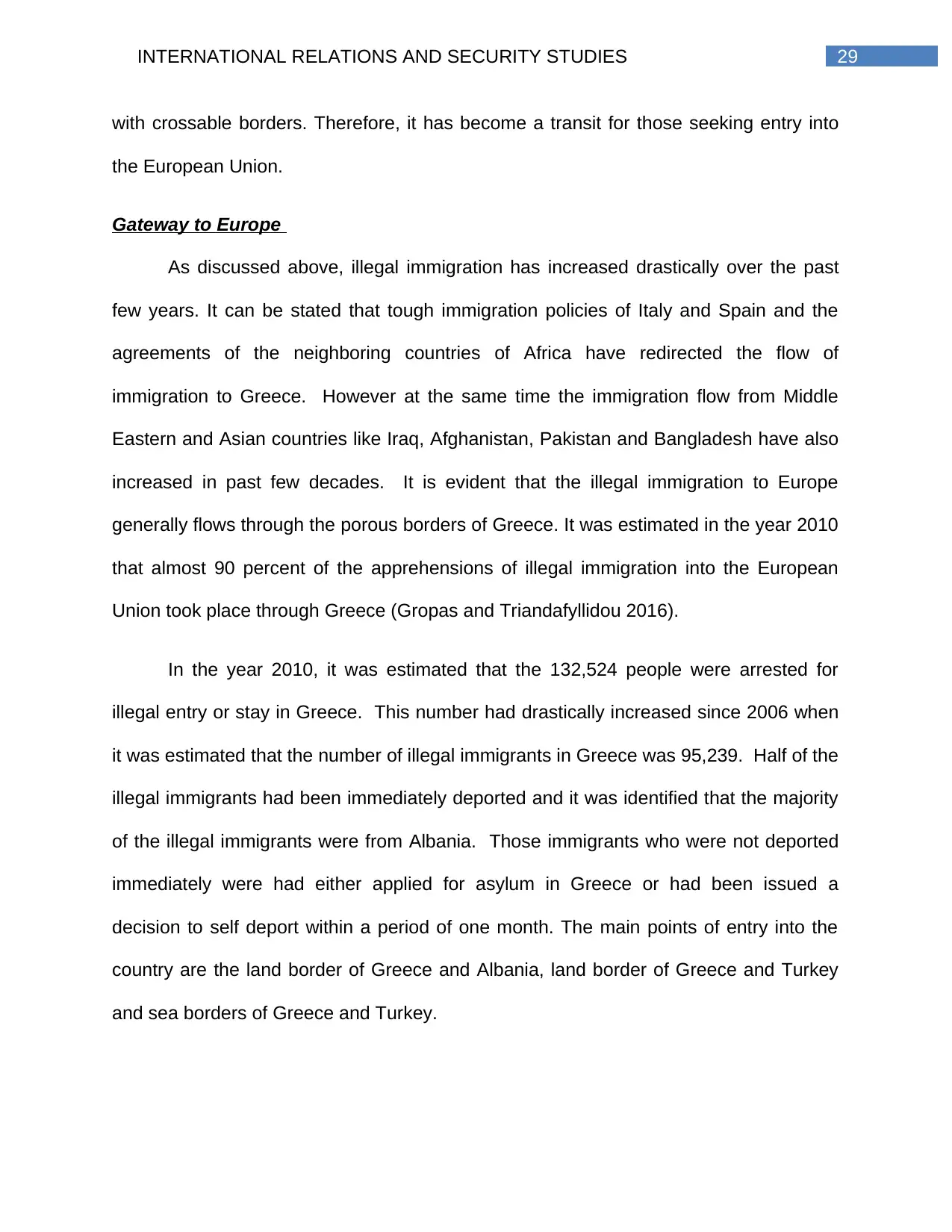
29INTERNATIONAL RELATIONS AND SECURITY STUDIES
with crossable borders. Therefore, it has become a transit for those seeking entry into
the European Union.
Gateway to Europe
As discussed above, illegal immigration has increased drastically over the past
few years. It can be stated that tough immigration policies of Italy and Spain and the
agreements of the neighboring countries of Africa have redirected the flow of
immigration to Greece. However at the same time the immigration flow from Middle
Eastern and Asian countries like Iraq, Afghanistan, Pakistan and Bangladesh have also
increased in past few decades. It is evident that the illegal immigration to Europe
generally flows through the porous borders of Greece. It was estimated in the year 2010
that almost 90 percent of the apprehensions of illegal immigration into the European
Union took place through Greece (Gropas and Triandafyllidou 2016).
In the year 2010, it was estimated that the 132,524 people were arrested for
illegal entry or stay in Greece. This number had drastically increased since 2006 when
it was estimated that the number of illegal immigrants in Greece was 95,239. Half of the
illegal immigrants had been immediately deported and it was identified that the majority
of the illegal immigrants were from Albania. Those immigrants who were not deported
immediately were had either applied for asylum in Greece or had been issued a
decision to self deport within a period of one month. The main points of entry into the
country are the land border of Greece and Albania, land border of Greece and Turkey
and sea borders of Greece and Turkey.
with crossable borders. Therefore, it has become a transit for those seeking entry into
the European Union.
Gateway to Europe
As discussed above, illegal immigration has increased drastically over the past
few years. It can be stated that tough immigration policies of Italy and Spain and the
agreements of the neighboring countries of Africa have redirected the flow of
immigration to Greece. However at the same time the immigration flow from Middle
Eastern and Asian countries like Iraq, Afghanistan, Pakistan and Bangladesh have also
increased in past few decades. It is evident that the illegal immigration to Europe
generally flows through the porous borders of Greece. It was estimated in the year 2010
that almost 90 percent of the apprehensions of illegal immigration into the European
Union took place through Greece (Gropas and Triandafyllidou 2016).
In the year 2010, it was estimated that the 132,524 people were arrested for
illegal entry or stay in Greece. This number had drastically increased since 2006 when
it was estimated that the number of illegal immigrants in Greece was 95,239. Half of the
illegal immigrants had been immediately deported and it was identified that the majority
of the illegal immigrants were from Albania. Those immigrants who were not deported
immediately were had either applied for asylum in Greece or had been issued a
decision to self deport within a period of one month. The main points of entry into the
country are the land border of Greece and Albania, land border of Greece and Turkey
and sea borders of Greece and Turkey.
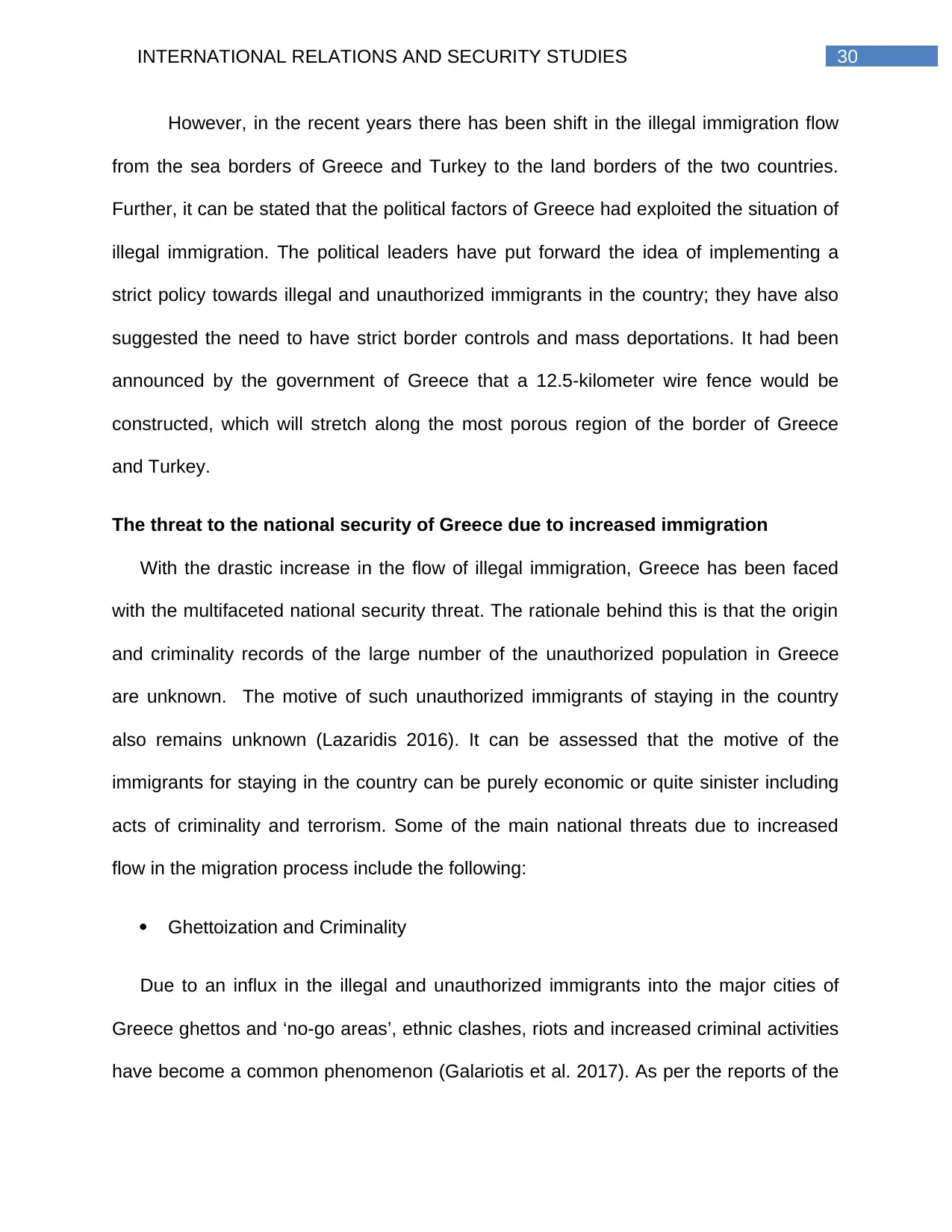
30INTERNATIONAL RELATIONS AND SECURITY STUDIES
However, in the recent years there has been shift in the illegal immigration flow
from the sea borders of Greece and Turkey to the land borders of the two countries.
Further, it can be stated that the political factors of Greece had exploited the situation of
illegal immigration. The political leaders have put forward the idea of implementing a
strict policy towards illegal and unauthorized immigrants in the country; they have also
suggested the need to have strict border controls and mass deportations. It had been
announced by the government of Greece that a 12.5-kilometer wire fence would be
constructed, which will stretch along the most porous region of the border of Greece
and Turkey.
The threat to the national security of Greece due to increased immigration
With the drastic increase in the flow of illegal immigration, Greece has been faced
with the multifaceted national security threat. The rationale behind this is that the origin
and criminality records of the large number of the unauthorized population in Greece
are unknown. The motive of such unauthorized immigrants of staying in the country
also remains unknown (Lazaridis 2016). It can be assessed that the motive of the
immigrants for staying in the country can be purely economic or quite sinister including
acts of criminality and terrorism. Some of the main national threats due to increased
flow in the migration process include the following:
Ghettoization and Criminality
Due to an influx in the illegal and unauthorized immigrants into the major cities of
Greece ghettos and ‘no-go areas’, ethnic clashes, riots and increased criminal activities
have become a common phenomenon (Galariotis et al. 2017). As per the reports of the
However, in the recent years there has been shift in the illegal immigration flow
from the sea borders of Greece and Turkey to the land borders of the two countries.
Further, it can be stated that the political factors of Greece had exploited the situation of
illegal immigration. The political leaders have put forward the idea of implementing a
strict policy towards illegal and unauthorized immigrants in the country; they have also
suggested the need to have strict border controls and mass deportations. It had been
announced by the government of Greece that a 12.5-kilometer wire fence would be
constructed, which will stretch along the most porous region of the border of Greece
and Turkey.
The threat to the national security of Greece due to increased immigration
With the drastic increase in the flow of illegal immigration, Greece has been faced
with the multifaceted national security threat. The rationale behind this is that the origin
and criminality records of the large number of the unauthorized population in Greece
are unknown. The motive of such unauthorized immigrants of staying in the country
also remains unknown (Lazaridis 2016). It can be assessed that the motive of the
immigrants for staying in the country can be purely economic or quite sinister including
acts of criminality and terrorism. Some of the main national threats due to increased
flow in the migration process include the following:
Ghettoization and Criminality
Due to an influx in the illegal and unauthorized immigrants into the major cities of
Greece ghettos and ‘no-go areas’, ethnic clashes, riots and increased criminal activities
have become a common phenomenon (Galariotis et al. 2017). As per the reports of the
Secure Best Marks with AI Grader
Need help grading? Try our AI Grader for instant feedback on your assignments.
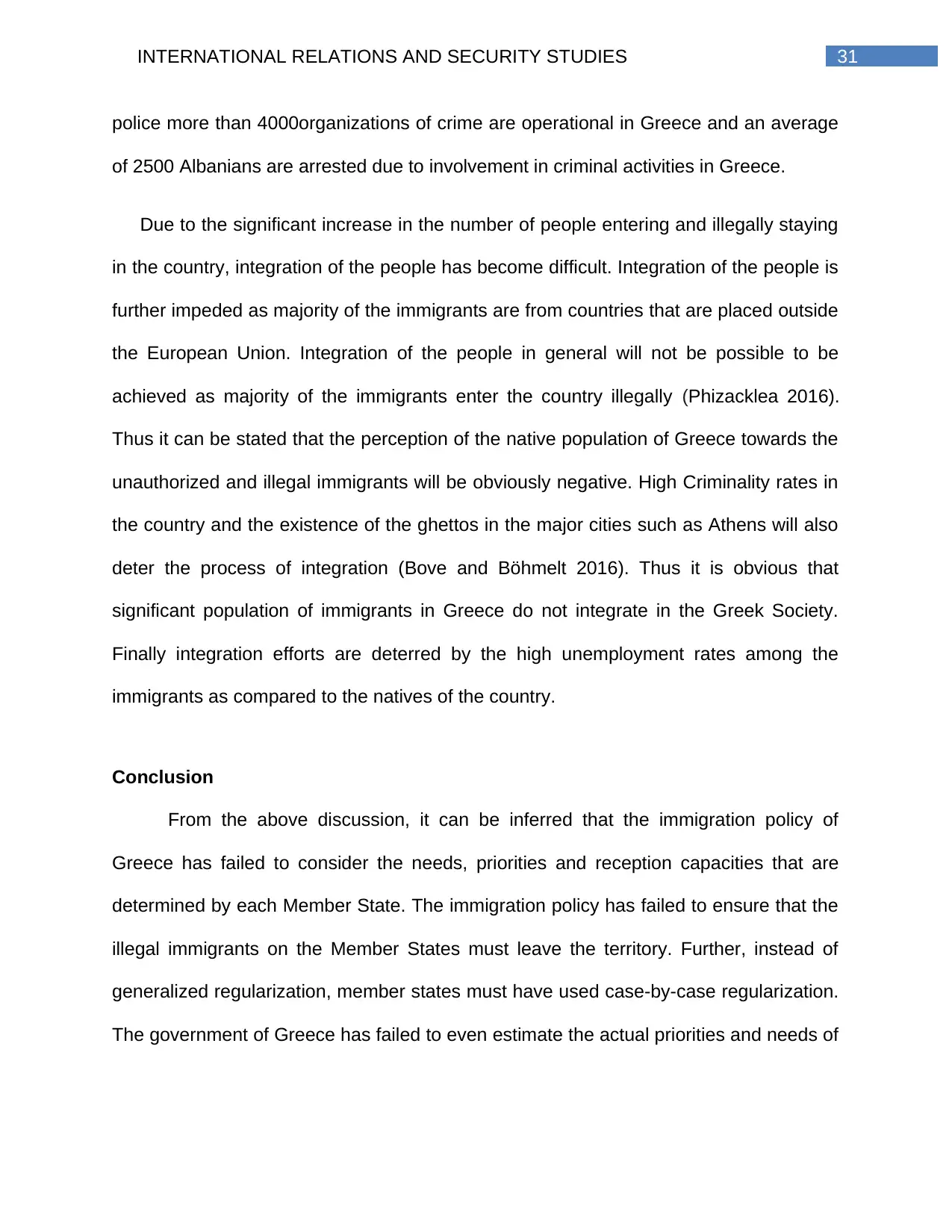
31INTERNATIONAL RELATIONS AND SECURITY STUDIES
police more than 4000organizations of crime are operational in Greece and an average
of 2500 Albanians are arrested due to involvement in criminal activities in Greece.
Due to the significant increase in the number of people entering and illegally staying
in the country, integration of the people has become difficult. Integration of the people is
further impeded as majority of the immigrants are from countries that are placed outside
the European Union. Integration of the people in general will not be possible to be
achieved as majority of the immigrants enter the country illegally (Phizacklea 2016).
Thus it can be stated that the perception of the native population of Greece towards the
unauthorized and illegal immigrants will be obviously negative. High Criminality rates in
the country and the existence of the ghettos in the major cities such as Athens will also
deter the process of integration (Bove and Böhmelt 2016). Thus it is obvious that
significant population of immigrants in Greece do not integrate in the Greek Society.
Finally integration efforts are deterred by the high unemployment rates among the
immigrants as compared to the natives of the country.
Conclusion
From the above discussion, it can be inferred that the immigration policy of
Greece has failed to consider the needs, priorities and reception capacities that are
determined by each Member State. The immigration policy has failed to ensure that the
illegal immigrants on the Member States must leave the territory. Further, instead of
generalized regularization, member states must have used case-by-case regularization.
The government of Greece has failed to even estimate the actual priorities and needs of
police more than 4000organizations of crime are operational in Greece and an average
of 2500 Albanians are arrested due to involvement in criminal activities in Greece.
Due to the significant increase in the number of people entering and illegally staying
in the country, integration of the people has become difficult. Integration of the people is
further impeded as majority of the immigrants are from countries that are placed outside
the European Union. Integration of the people in general will not be possible to be
achieved as majority of the immigrants enter the country illegally (Phizacklea 2016).
Thus it can be stated that the perception of the native population of Greece towards the
unauthorized and illegal immigrants will be obviously negative. High Criminality rates in
the country and the existence of the ghettos in the major cities such as Athens will also
deter the process of integration (Bove and Böhmelt 2016). Thus it is obvious that
significant population of immigrants in Greece do not integrate in the Greek Society.
Finally integration efforts are deterred by the high unemployment rates among the
immigrants as compared to the natives of the country.
Conclusion
From the above discussion, it can be inferred that the immigration policy of
Greece has failed to consider the needs, priorities and reception capacities that are
determined by each Member State. The immigration policy has failed to ensure that the
illegal immigrants on the Member States must leave the territory. Further, instead of
generalized regularization, member states must have used case-by-case regularization.
The government of Greece has failed to even estimate the actual priorities and needs of
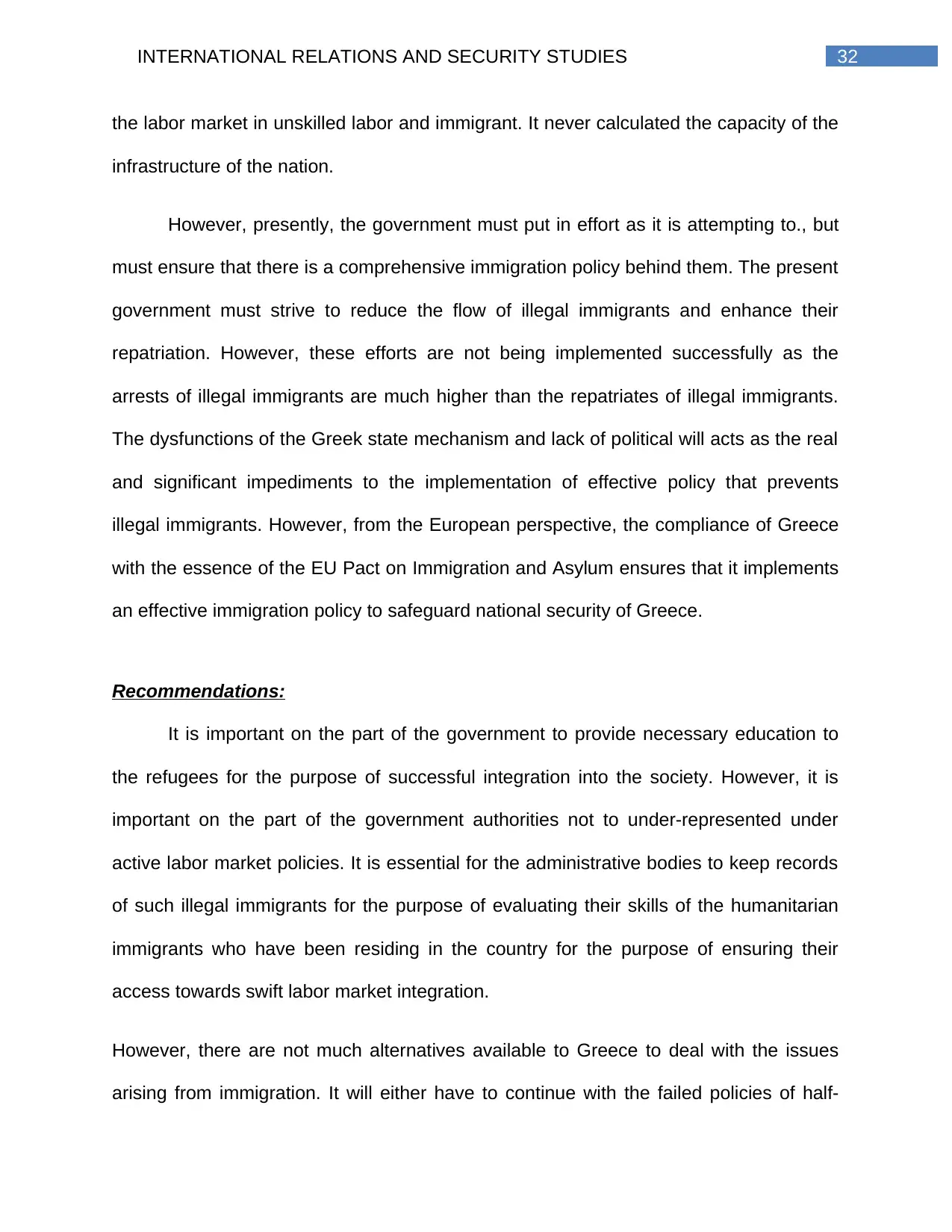
32INTERNATIONAL RELATIONS AND SECURITY STUDIES
the labor market in unskilled labor and immigrant. It never calculated the capacity of the
infrastructure of the nation.
However, presently, the government must put in effort as it is attempting to., but
must ensure that there is a comprehensive immigration policy behind them. The present
government must strive to reduce the flow of illegal immigrants and enhance their
repatriation. However, these efforts are not being implemented successfully as the
arrests of illegal immigrants are much higher than the repatriates of illegal immigrants.
The dysfunctions of the Greek state mechanism and lack of political will acts as the real
and significant impediments to the implementation of effective policy that prevents
illegal immigrants. However, from the European perspective, the compliance of Greece
with the essence of the EU Pact on Immigration and Asylum ensures that it implements
an effective immigration policy to safeguard national security of Greece.
Recommendations:
It is important on the part of the government to provide necessary education to
the refugees for the purpose of successful integration into the society. However, it is
important on the part of the government authorities not to under-represented under
active labor market policies. It is essential for the administrative bodies to keep records
of such illegal immigrants for the purpose of evaluating their skills of the humanitarian
immigrants who have been residing in the country for the purpose of ensuring their
access towards swift labor market integration.
However, there are not much alternatives available to Greece to deal with the issues
arising from immigration. It will either have to continue with the failed policies of half-
the labor market in unskilled labor and immigrant. It never calculated the capacity of the
infrastructure of the nation.
However, presently, the government must put in effort as it is attempting to., but
must ensure that there is a comprehensive immigration policy behind them. The present
government must strive to reduce the flow of illegal immigrants and enhance their
repatriation. However, these efforts are not being implemented successfully as the
arrests of illegal immigrants are much higher than the repatriates of illegal immigrants.
The dysfunctions of the Greek state mechanism and lack of political will acts as the real
and significant impediments to the implementation of effective policy that prevents
illegal immigrants. However, from the European perspective, the compliance of Greece
with the essence of the EU Pact on Immigration and Asylum ensures that it implements
an effective immigration policy to safeguard national security of Greece.
Recommendations:
It is important on the part of the government to provide necessary education to
the refugees for the purpose of successful integration into the society. However, it is
important on the part of the government authorities not to under-represented under
active labor market policies. It is essential for the administrative bodies to keep records
of such illegal immigrants for the purpose of evaluating their skills of the humanitarian
immigrants who have been residing in the country for the purpose of ensuring their
access towards swift labor market integration.
However, there are not much alternatives available to Greece to deal with the issues
arising from immigration. It will either have to continue with the failed policies of half-
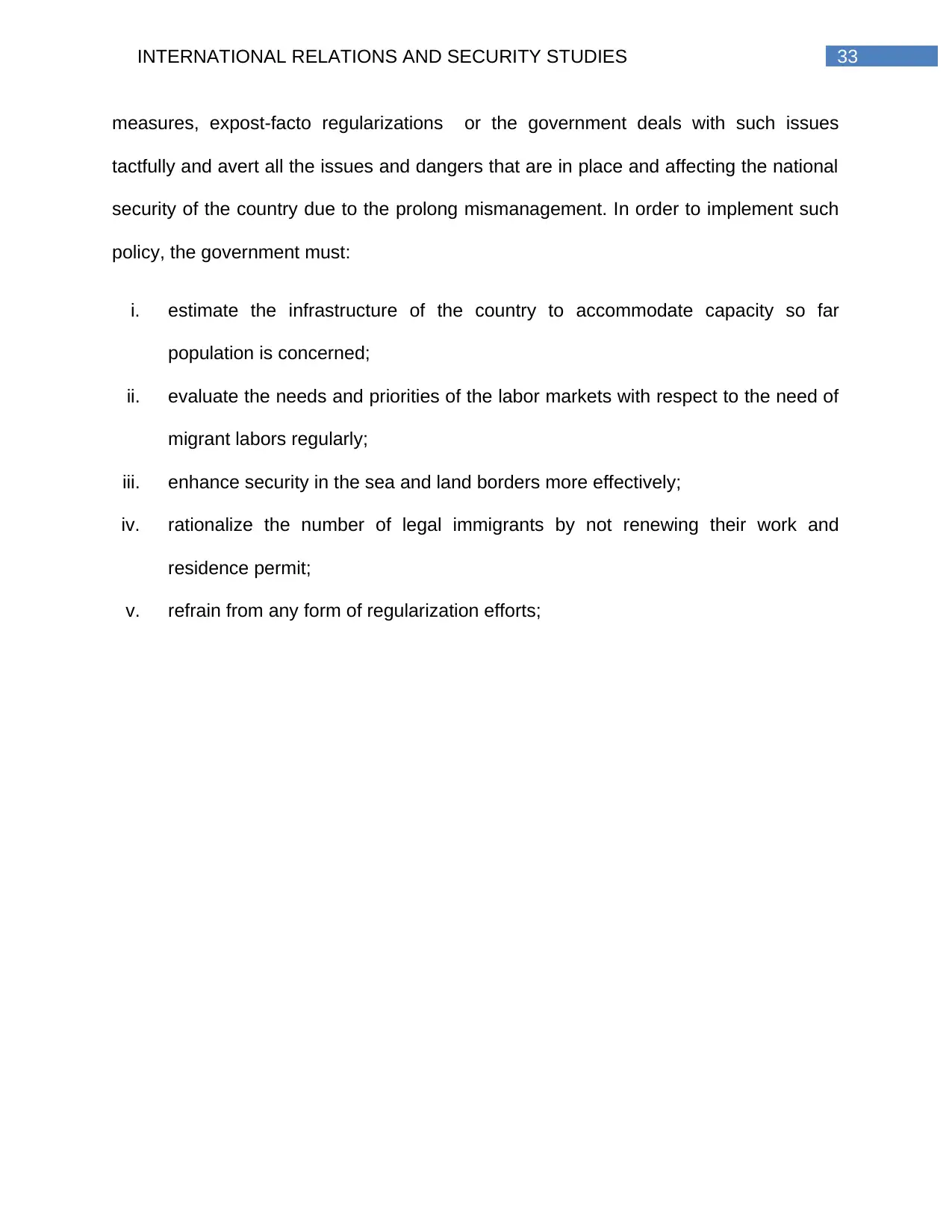
33INTERNATIONAL RELATIONS AND SECURITY STUDIES
measures, expost-facto regularizations or the government deals with such issues
tactfully and avert all the issues and dangers that are in place and affecting the national
security of the country due to the prolong mismanagement. In order to implement such
policy, the government must:
i. estimate the infrastructure of the country to accommodate capacity so far
population is concerned;
ii. evaluate the needs and priorities of the labor markets with respect to the need of
migrant labors regularly;
iii. enhance security in the sea and land borders more effectively;
iv. rationalize the number of legal immigrants by not renewing their work and
residence permit;
v. refrain from any form of regularization efforts;
measures, expost-facto regularizations or the government deals with such issues
tactfully and avert all the issues and dangers that are in place and affecting the national
security of the country due to the prolong mismanagement. In order to implement such
policy, the government must:
i. estimate the infrastructure of the country to accommodate capacity so far
population is concerned;
ii. evaluate the needs and priorities of the labor markets with respect to the need of
migrant labors regularly;
iii. enhance security in the sea and land borders more effectively;
iv. rationalize the number of legal immigrants by not renewing their work and
residence permit;
v. refrain from any form of regularization efforts;
Paraphrase This Document
Need a fresh take? Get an instant paraphrase of this document with our AI Paraphraser
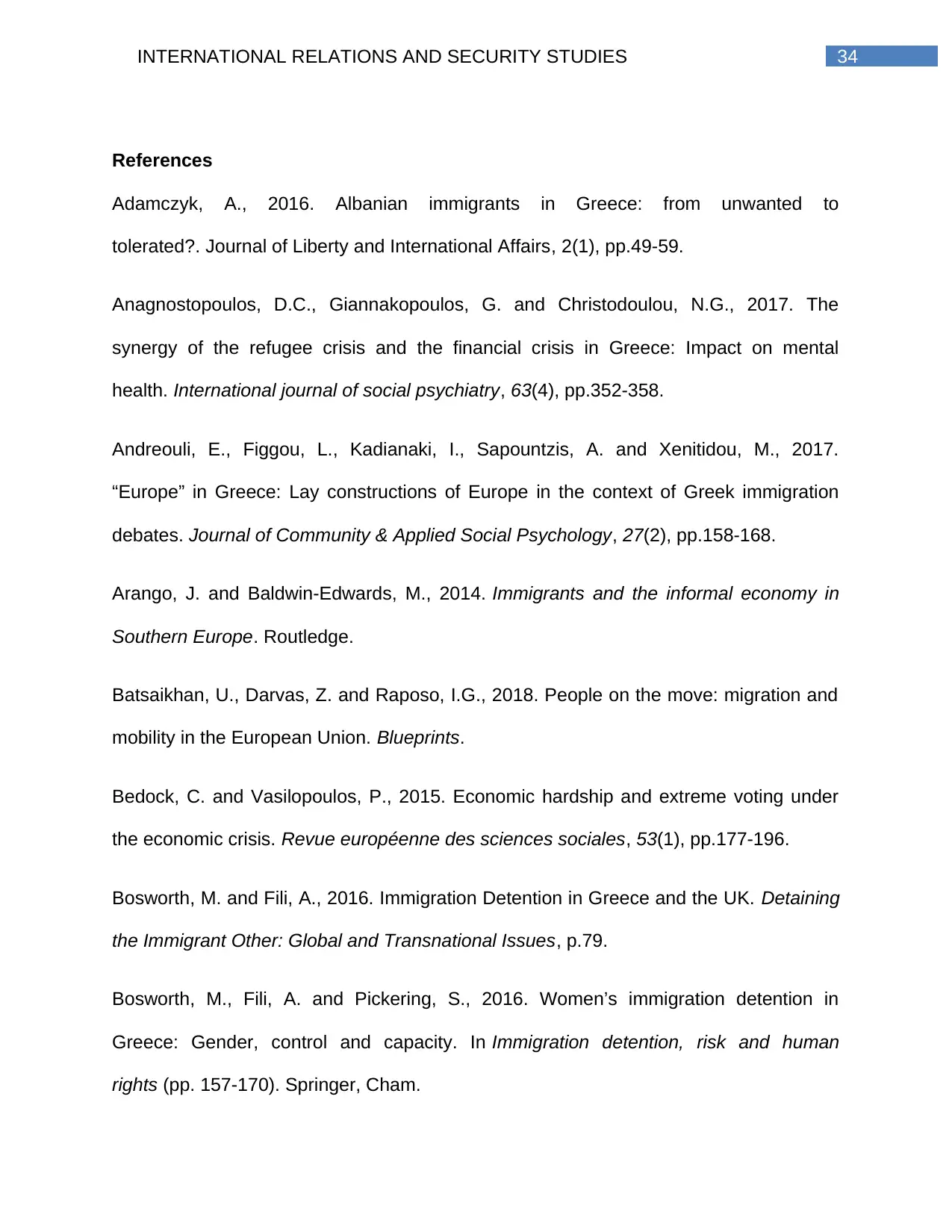
34INTERNATIONAL RELATIONS AND SECURITY STUDIES
References
Adamczyk, A., 2016. Albanian immigrants in Greece: from unwanted to
tolerated?. Journal of Liberty and International Affairs, 2(1), pp.49-59.
Anagnostopoulos, D.C., Giannakopoulos, G. and Christodoulou, N.G., 2017. The
synergy of the refugee crisis and the financial crisis in Greece: Impact on mental
health. International journal of social psychiatry, 63(4), pp.352-358.
Andreouli, E., Figgou, L., Kadianaki, I., Sapountzis, A. and Xenitidou, M., 2017.
“Europe” in Greece: Lay constructions of Europe in the context of Greek immigration
debates. Journal of Community & Applied Social Psychology, 27(2), pp.158-168.
Arango, J. and Baldwin-Edwards, M., 2014. Immigrants and the informal economy in
Southern Europe. Routledge.
Batsaikhan, U., Darvas, Z. and Raposo, I.G., 2018. People on the move: migration and
mobility in the European Union. Blueprints.
Bedock, C. and Vasilopoulos, P., 2015. Economic hardship and extreme voting under
the economic crisis. Revue européenne des sciences sociales, 53(1), pp.177-196.
Bosworth, M. and Fili, A., 2016. Immigration Detention in Greece and the UK. Detaining
the Immigrant Other: Global and Transnational Issues, p.79.
Bosworth, M., Fili, A. and Pickering, S., 2016. Women’s immigration detention in
Greece: Gender, control and capacity. In Immigration detention, risk and human
rights (pp. 157-170). Springer, Cham.
References
Adamczyk, A., 2016. Albanian immigrants in Greece: from unwanted to
tolerated?. Journal of Liberty and International Affairs, 2(1), pp.49-59.
Anagnostopoulos, D.C., Giannakopoulos, G. and Christodoulou, N.G., 2017. The
synergy of the refugee crisis and the financial crisis in Greece: Impact on mental
health. International journal of social psychiatry, 63(4), pp.352-358.
Andreouli, E., Figgou, L., Kadianaki, I., Sapountzis, A. and Xenitidou, M., 2017.
“Europe” in Greece: Lay constructions of Europe in the context of Greek immigration
debates. Journal of Community & Applied Social Psychology, 27(2), pp.158-168.
Arango, J. and Baldwin-Edwards, M., 2014. Immigrants and the informal economy in
Southern Europe. Routledge.
Batsaikhan, U., Darvas, Z. and Raposo, I.G., 2018. People on the move: migration and
mobility in the European Union. Blueprints.
Bedock, C. and Vasilopoulos, P., 2015. Economic hardship and extreme voting under
the economic crisis. Revue européenne des sciences sociales, 53(1), pp.177-196.
Bosworth, M. and Fili, A., 2016. Immigration Detention in Greece and the UK. Detaining
the Immigrant Other: Global and Transnational Issues, p.79.
Bosworth, M., Fili, A. and Pickering, S., 2016. Women’s immigration detention in
Greece: Gender, control and capacity. In Immigration detention, risk and human
rights (pp. 157-170). Springer, Cham.
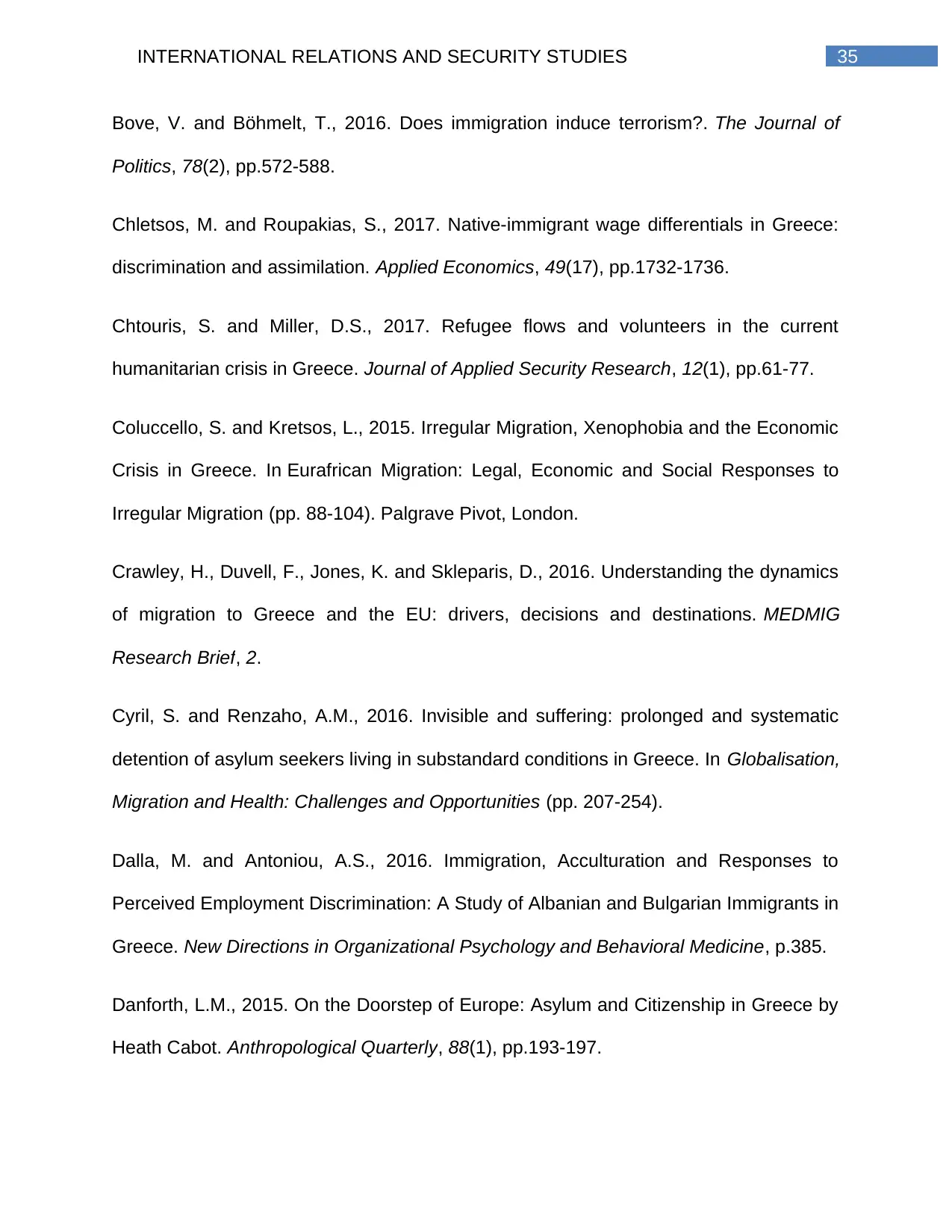
35INTERNATIONAL RELATIONS AND SECURITY STUDIES
Bove, V. and Böhmelt, T., 2016. Does immigration induce terrorism?. The Journal of
Politics, 78(2), pp.572-588.
Chletsos, M. and Roupakias, S., 2017. Native-immigrant wage differentials in Greece:
discrimination and assimilation. Applied Economics, 49(17), pp.1732-1736.
Chtouris, S. and Miller, D.S., 2017. Refugee flows and volunteers in the current
humanitarian crisis in Greece. Journal of Applied Security Research, 12(1), pp.61-77.
Coluccello, S. and Kretsos, L., 2015. Irregular Migration, Xenophobia and the Economic
Crisis in Greece. In Eurafrican Migration: Legal, Economic and Social Responses to
Irregular Migration (pp. 88-104). Palgrave Pivot, London.
Crawley, H., Duvell, F., Jones, K. and Skleparis, D., 2016. Understanding the dynamics
of migration to Greece and the EU: drivers, decisions and destinations. MEDMIG
Research Brief, 2.
Cyril, S. and Renzaho, A.M., 2016. Invisible and suffering: prolonged and systematic
detention of asylum seekers living in substandard conditions in Greece. In Globalisation,
Migration and Health: Challenges and Opportunities (pp. 207-254).
Dalla, M. and Antoniou, A.S., 2016. Immigration, Acculturation and Responses to
Perceived Employment Discrimination: A Study of Albanian and Bulgarian Immigrants in
Greece. New Directions in Organizational Psychology and Behavioral Medicine, p.385.
Danforth, L.M., 2015. On the Doorstep of Europe: Asylum and Citizenship in Greece by
Heath Cabot. Anthropological Quarterly, 88(1), pp.193-197.
Bove, V. and Böhmelt, T., 2016. Does immigration induce terrorism?. The Journal of
Politics, 78(2), pp.572-588.
Chletsos, M. and Roupakias, S., 2017. Native-immigrant wage differentials in Greece:
discrimination and assimilation. Applied Economics, 49(17), pp.1732-1736.
Chtouris, S. and Miller, D.S., 2017. Refugee flows and volunteers in the current
humanitarian crisis in Greece. Journal of Applied Security Research, 12(1), pp.61-77.
Coluccello, S. and Kretsos, L., 2015. Irregular Migration, Xenophobia and the Economic
Crisis in Greece. In Eurafrican Migration: Legal, Economic and Social Responses to
Irregular Migration (pp. 88-104). Palgrave Pivot, London.
Crawley, H., Duvell, F., Jones, K. and Skleparis, D., 2016. Understanding the dynamics
of migration to Greece and the EU: drivers, decisions and destinations. MEDMIG
Research Brief, 2.
Cyril, S. and Renzaho, A.M., 2016. Invisible and suffering: prolonged and systematic
detention of asylum seekers living in substandard conditions in Greece. In Globalisation,
Migration and Health: Challenges and Opportunities (pp. 207-254).
Dalla, M. and Antoniou, A.S., 2016. Immigration, Acculturation and Responses to
Perceived Employment Discrimination: A Study of Albanian and Bulgarian Immigrants in
Greece. New Directions in Organizational Psychology and Behavioral Medicine, p.385.
Danforth, L.M., 2015. On the Doorstep of Europe: Asylum and Citizenship in Greece by
Heath Cabot. Anthropological Quarterly, 88(1), pp.193-197.
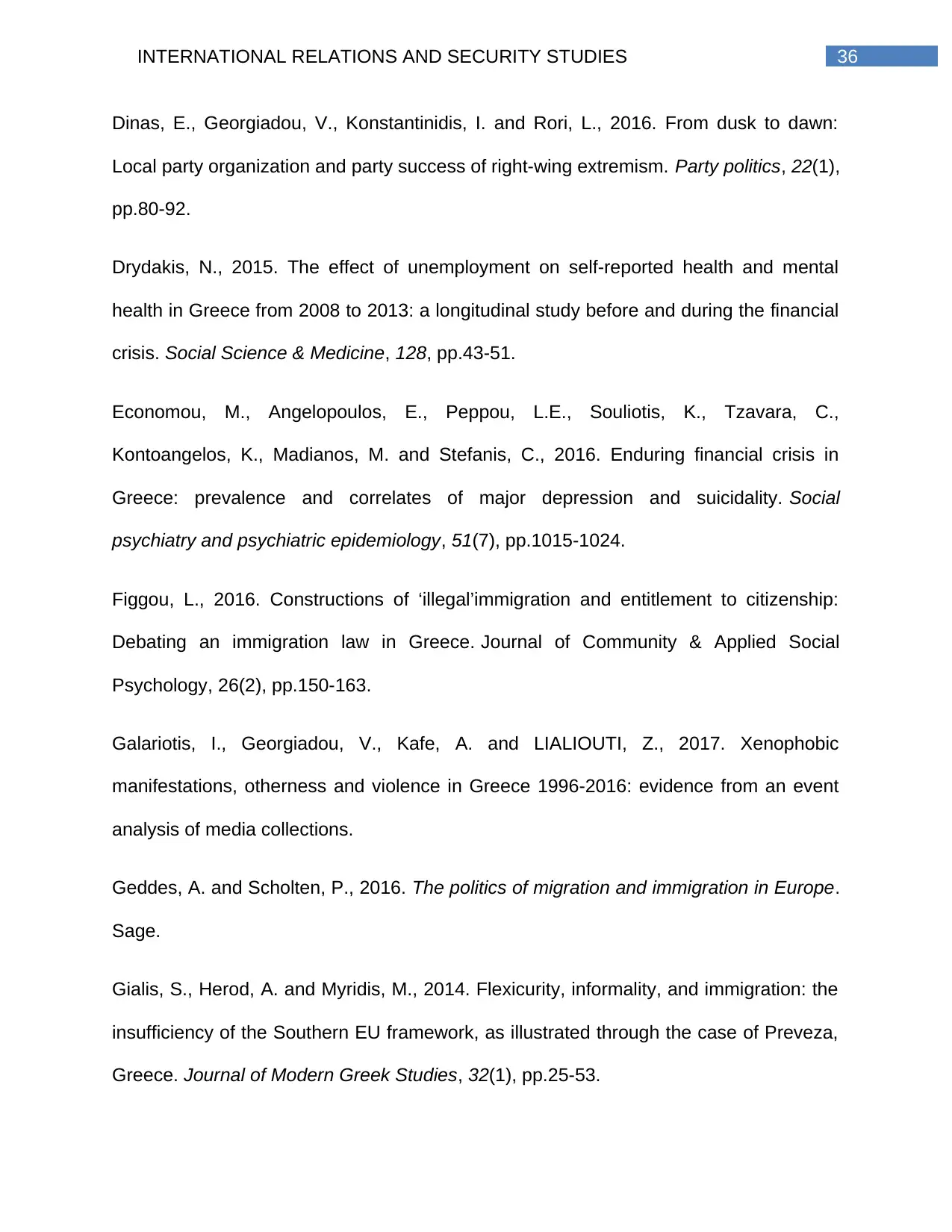
36INTERNATIONAL RELATIONS AND SECURITY STUDIES
Dinas, E., Georgiadou, V., Konstantinidis, I. and Rori, L., 2016. From dusk to dawn:
Local party organization and party success of right-wing extremism. Party politics, 22(1),
pp.80-92.
Drydakis, N., 2015. The effect of unemployment on self-reported health and mental
health in Greece from 2008 to 2013: a longitudinal study before and during the financial
crisis. Social Science & Medicine, 128, pp.43-51.
Economou, M., Angelopoulos, E., Peppou, L.E., Souliotis, K., Tzavara, C.,
Kontoangelos, K., Madianos, M. and Stefanis, C., 2016. Enduring financial crisis in
Greece: prevalence and correlates of major depression and suicidality. Social
psychiatry and psychiatric epidemiology, 51(7), pp.1015-1024.
Figgou, L., 2016. Constructions of ‘illegal’immigration and entitlement to citizenship:
Debating an immigration law in Greece. Journal of Community & Applied Social
Psychology, 26(2), pp.150-163.
Galariotis, I., Georgiadou, V., Kafe, A. and LIALIOUTI, Z., 2017. Xenophobic
manifestations, otherness and violence in Greece 1996-2016: evidence from an event
analysis of media collections.
Geddes, A. and Scholten, P., 2016. The politics of migration and immigration in Europe.
Sage.
Gialis, S., Herod, A. and Myridis, M., 2014. Flexicurity, informality, and immigration: the
insufficiency of the Southern EU framework, as illustrated through the case of Preveza,
Greece. Journal of Modern Greek Studies, 32(1), pp.25-53.
Dinas, E., Georgiadou, V., Konstantinidis, I. and Rori, L., 2016. From dusk to dawn:
Local party organization and party success of right-wing extremism. Party politics, 22(1),
pp.80-92.
Drydakis, N., 2015. The effect of unemployment on self-reported health and mental
health in Greece from 2008 to 2013: a longitudinal study before and during the financial
crisis. Social Science & Medicine, 128, pp.43-51.
Economou, M., Angelopoulos, E., Peppou, L.E., Souliotis, K., Tzavara, C.,
Kontoangelos, K., Madianos, M. and Stefanis, C., 2016. Enduring financial crisis in
Greece: prevalence and correlates of major depression and suicidality. Social
psychiatry and psychiatric epidemiology, 51(7), pp.1015-1024.
Figgou, L., 2016. Constructions of ‘illegal’immigration and entitlement to citizenship:
Debating an immigration law in Greece. Journal of Community & Applied Social
Psychology, 26(2), pp.150-163.
Galariotis, I., Georgiadou, V., Kafe, A. and LIALIOUTI, Z., 2017. Xenophobic
manifestations, otherness and violence in Greece 1996-2016: evidence from an event
analysis of media collections.
Geddes, A. and Scholten, P., 2016. The politics of migration and immigration in Europe.
Sage.
Gialis, S., Herod, A. and Myridis, M., 2014. Flexicurity, informality, and immigration: the
insufficiency of the Southern EU framework, as illustrated through the case of Preveza,
Greece. Journal of Modern Greek Studies, 32(1), pp.25-53.
Secure Best Marks with AI Grader
Need help grading? Try our AI Grader for instant feedback on your assignments.
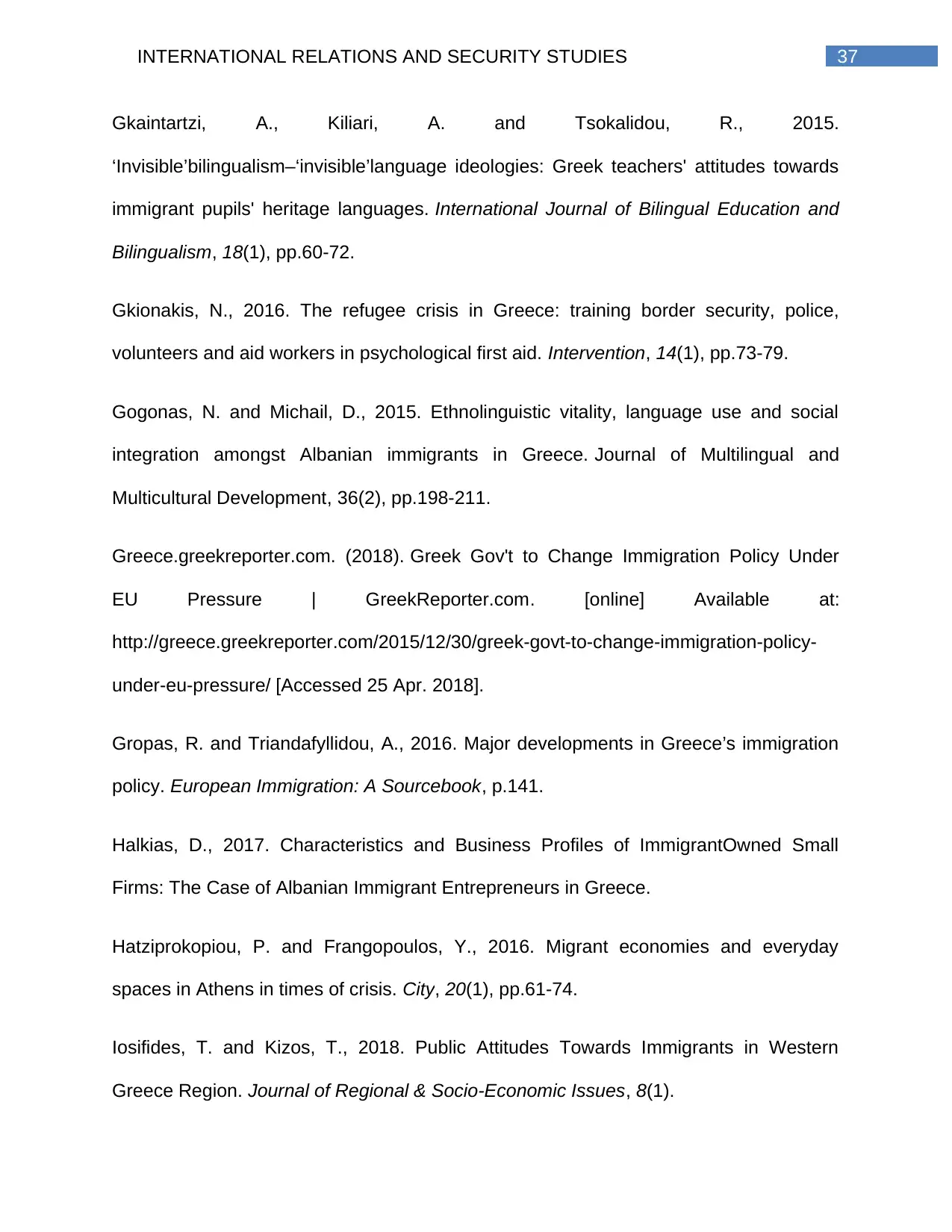
37INTERNATIONAL RELATIONS AND SECURITY STUDIES
Gkaintartzi, A., Kiliari, A. and Tsokalidou, R., 2015.
‘Invisible’bilingualism–‘invisible’language ideologies: Greek teachers' attitudes towards
immigrant pupils' heritage languages. International Journal of Bilingual Education and
Bilingualism, 18(1), pp.60-72.
Gkionakis, N., 2016. The refugee crisis in Greece: training border security, police,
volunteers and aid workers in psychological first aid. Intervention, 14(1), pp.73-79.
Gogonas, N. and Michail, D., 2015. Ethnolinguistic vitality, language use and social
integration amongst Albanian immigrants in Greece. Journal of Multilingual and
Multicultural Development, 36(2), pp.198-211.
Greece.greekreporter.com. (2018). Greek Gov't to Change Immigration Policy Under
EU Pressure | GreekReporter.com. [online] Available at:
http://greece.greekreporter.com/2015/12/30/greek-govt-to-change-immigration-policy-
under-eu-pressure/ [Accessed 25 Apr. 2018].
Gropas, R. and Triandafyllidou, A., 2016. Major developments in Greece’s immigration
policy. European Immigration: A Sourcebook, p.141.
Halkias, D., 2017. Characteristics and Business Profiles of ImmigrantOwned Small
Firms: The Case of Albanian Immigrant Entrepreneurs in Greece.
Hatziprokopiou, P. and Frangopoulos, Y., 2016. Migrant economies and everyday
spaces in Athens in times of crisis. City, 20(1), pp.61-74.
Iosifides, T. and Kizos, T., 2018. Public Attitudes Towards Immigrants in Western
Greece Region. Journal of Regional & Socio-Economic Issues, 8(1).
Gkaintartzi, A., Kiliari, A. and Tsokalidou, R., 2015.
‘Invisible’bilingualism–‘invisible’language ideologies: Greek teachers' attitudes towards
immigrant pupils' heritage languages. International Journal of Bilingual Education and
Bilingualism, 18(1), pp.60-72.
Gkionakis, N., 2016. The refugee crisis in Greece: training border security, police,
volunteers and aid workers in psychological first aid. Intervention, 14(1), pp.73-79.
Gogonas, N. and Michail, D., 2015. Ethnolinguistic vitality, language use and social
integration amongst Albanian immigrants in Greece. Journal of Multilingual and
Multicultural Development, 36(2), pp.198-211.
Greece.greekreporter.com. (2018). Greek Gov't to Change Immigration Policy Under
EU Pressure | GreekReporter.com. [online] Available at:
http://greece.greekreporter.com/2015/12/30/greek-govt-to-change-immigration-policy-
under-eu-pressure/ [Accessed 25 Apr. 2018].
Gropas, R. and Triandafyllidou, A., 2016. Major developments in Greece’s immigration
policy. European Immigration: A Sourcebook, p.141.
Halkias, D., 2017. Characteristics and Business Profiles of ImmigrantOwned Small
Firms: The Case of Albanian Immigrant Entrepreneurs in Greece.
Hatziprokopiou, P. and Frangopoulos, Y., 2016. Migrant economies and everyday
spaces in Athens in times of crisis. City, 20(1), pp.61-74.
Iosifides, T. and Kizos, T., 2018. Public Attitudes Towards Immigrants in Western
Greece Region. Journal of Regional & Socio-Economic Issues, 8(1).
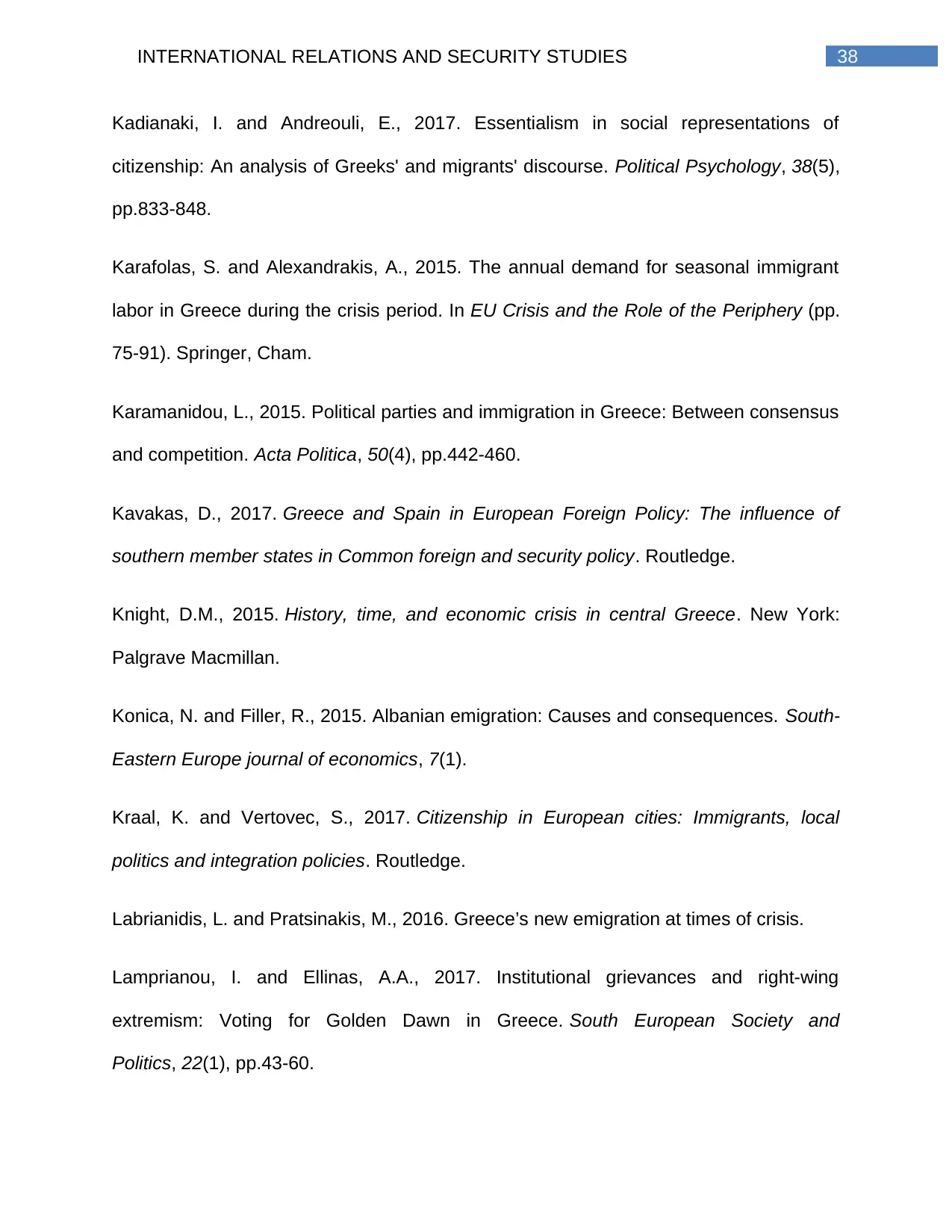
38INTERNATIONAL RELATIONS AND SECURITY STUDIES
Kadianaki, I. and Andreouli, E., 2017. Essentialism in social representations of
citizenship: An analysis of Greeks' and migrants' discourse. Political Psychology, 38(5),
pp.833-848.
Karafolas, S. and Alexandrakis, A., 2015. The annual demand for seasonal immigrant
labor in Greece during the crisis period. In EU Crisis and the Role of the Periphery (pp.
75-91). Springer, Cham.
Karamanidou, L., 2015. Political parties and immigration in Greece: Between consensus
and competition. Acta Politica, 50(4), pp.442-460.
Kavakas, D., 2017. Greece and Spain in European Foreign Policy: The influence of
southern member states in Common foreign and security policy. Routledge.
Knight, D.M., 2015. History, time, and economic crisis in central Greece. New York:
Palgrave Macmillan.
Konica, N. and Filler, R., 2015. Albanian emigration: Causes and consequences. South-
Eastern Europe journal of economics, 7(1).
Kraal, K. and Vertovec, S., 2017. Citizenship in European cities: Immigrants, local
politics and integration policies. Routledge.
Labrianidis, L. and Pratsinakis, M., 2016. Greece’s new emigration at times of crisis.
Lamprianou, I. and Ellinas, A.A., 2017. Institutional grievances and right-wing
extremism: Voting for Golden Dawn in Greece. South European Society and
Politics, 22(1), pp.43-60.
Kadianaki, I. and Andreouli, E., 2017. Essentialism in social representations of
citizenship: An analysis of Greeks' and migrants' discourse. Political Psychology, 38(5),
pp.833-848.
Karafolas, S. and Alexandrakis, A., 2015. The annual demand for seasonal immigrant
labor in Greece during the crisis period. In EU Crisis and the Role of the Periphery (pp.
75-91). Springer, Cham.
Karamanidou, L., 2015. Political parties and immigration in Greece: Between consensus
and competition. Acta Politica, 50(4), pp.442-460.
Kavakas, D., 2017. Greece and Spain in European Foreign Policy: The influence of
southern member states in Common foreign and security policy. Routledge.
Knight, D.M., 2015. History, time, and economic crisis in central Greece. New York:
Palgrave Macmillan.
Konica, N. and Filler, R., 2015. Albanian emigration: Causes and consequences. South-
Eastern Europe journal of economics, 7(1).
Kraal, K. and Vertovec, S., 2017. Citizenship in European cities: Immigrants, local
politics and integration policies. Routledge.
Labrianidis, L. and Pratsinakis, M., 2016. Greece’s new emigration at times of crisis.
Lamprianou, I. and Ellinas, A.A., 2017. Institutional grievances and right-wing
extremism: Voting for Golden Dawn in Greece. South European Society and
Politics, 22(1), pp.43-60.
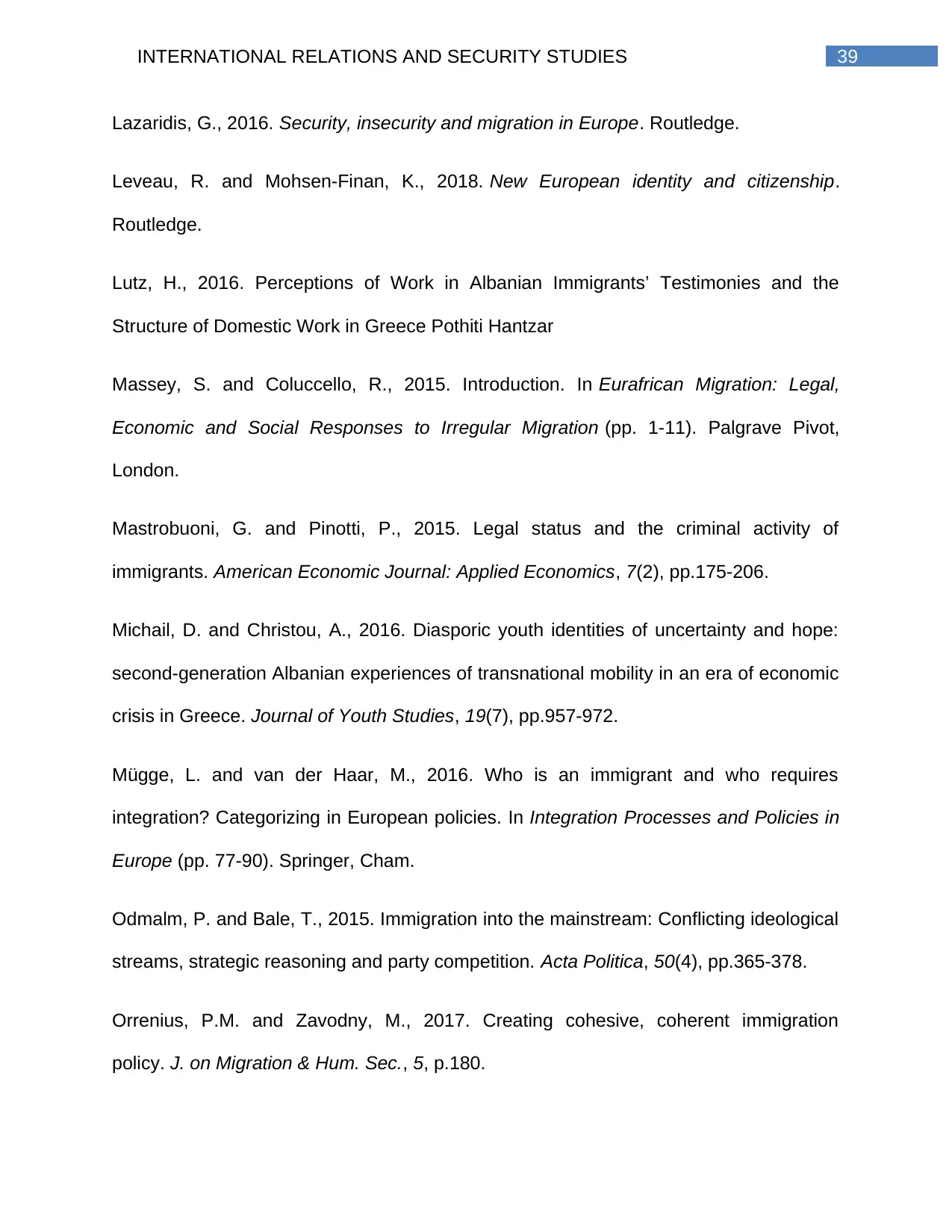
39INTERNATIONAL RELATIONS AND SECURITY STUDIES
Lazaridis, G., 2016. Security, insecurity and migration in Europe. Routledge.
Leveau, R. and Mohsen-Finan, K., 2018. New European identity and citizenship.
Routledge.
Lutz, H., 2016. Perceptions of Work in Albanian Immigrants’ Testimonies and the
Structure of Domestic Work in Greece Pothiti Hantzar
Massey, S. and Coluccello, R., 2015. Introduction. In Eurafrican Migration: Legal,
Economic and Social Responses to Irregular Migration (pp. 1-11). Palgrave Pivot,
London.
Mastrobuoni, G. and Pinotti, P., 2015. Legal status and the criminal activity of
immigrants. American Economic Journal: Applied Economics, 7(2), pp.175-206.
Michail, D. and Christou, A., 2016. Diasporic youth identities of uncertainty and hope:
second-generation Albanian experiences of transnational mobility in an era of economic
crisis in Greece. Journal of Youth Studies, 19(7), pp.957-972.
Mügge, L. and van der Haar, M., 2016. Who is an immigrant and who requires
integration? Categorizing in European policies. In Integration Processes and Policies in
Europe (pp. 77-90). Springer, Cham.
Odmalm, P. and Bale, T., 2015. Immigration into the mainstream: Conflicting ideological
streams, strategic reasoning and party competition. Acta Politica, 50(4), pp.365-378.
Orrenius, P.M. and Zavodny, M., 2017. Creating cohesive, coherent immigration
policy. J. on Migration & Hum. Sec., 5, p.180.
Lazaridis, G., 2016. Security, insecurity and migration in Europe. Routledge.
Leveau, R. and Mohsen-Finan, K., 2018. New European identity and citizenship.
Routledge.
Lutz, H., 2016. Perceptions of Work in Albanian Immigrants’ Testimonies and the
Structure of Domestic Work in Greece Pothiti Hantzar
Massey, S. and Coluccello, R., 2015. Introduction. In Eurafrican Migration: Legal,
Economic and Social Responses to Irregular Migration (pp. 1-11). Palgrave Pivot,
London.
Mastrobuoni, G. and Pinotti, P., 2015. Legal status and the criminal activity of
immigrants. American Economic Journal: Applied Economics, 7(2), pp.175-206.
Michail, D. and Christou, A., 2016. Diasporic youth identities of uncertainty and hope:
second-generation Albanian experiences of transnational mobility in an era of economic
crisis in Greece. Journal of Youth Studies, 19(7), pp.957-972.
Mügge, L. and van der Haar, M., 2016. Who is an immigrant and who requires
integration? Categorizing in European policies. In Integration Processes and Policies in
Europe (pp. 77-90). Springer, Cham.
Odmalm, P. and Bale, T., 2015. Immigration into the mainstream: Conflicting ideological
streams, strategic reasoning and party competition. Acta Politica, 50(4), pp.365-378.
Orrenius, P.M. and Zavodny, M., 2017. Creating cohesive, coherent immigration
policy. J. on Migration & Hum. Sec., 5, p.180.
Paraphrase This Document
Need a fresh take? Get an instant paraphrase of this document with our AI Paraphraser
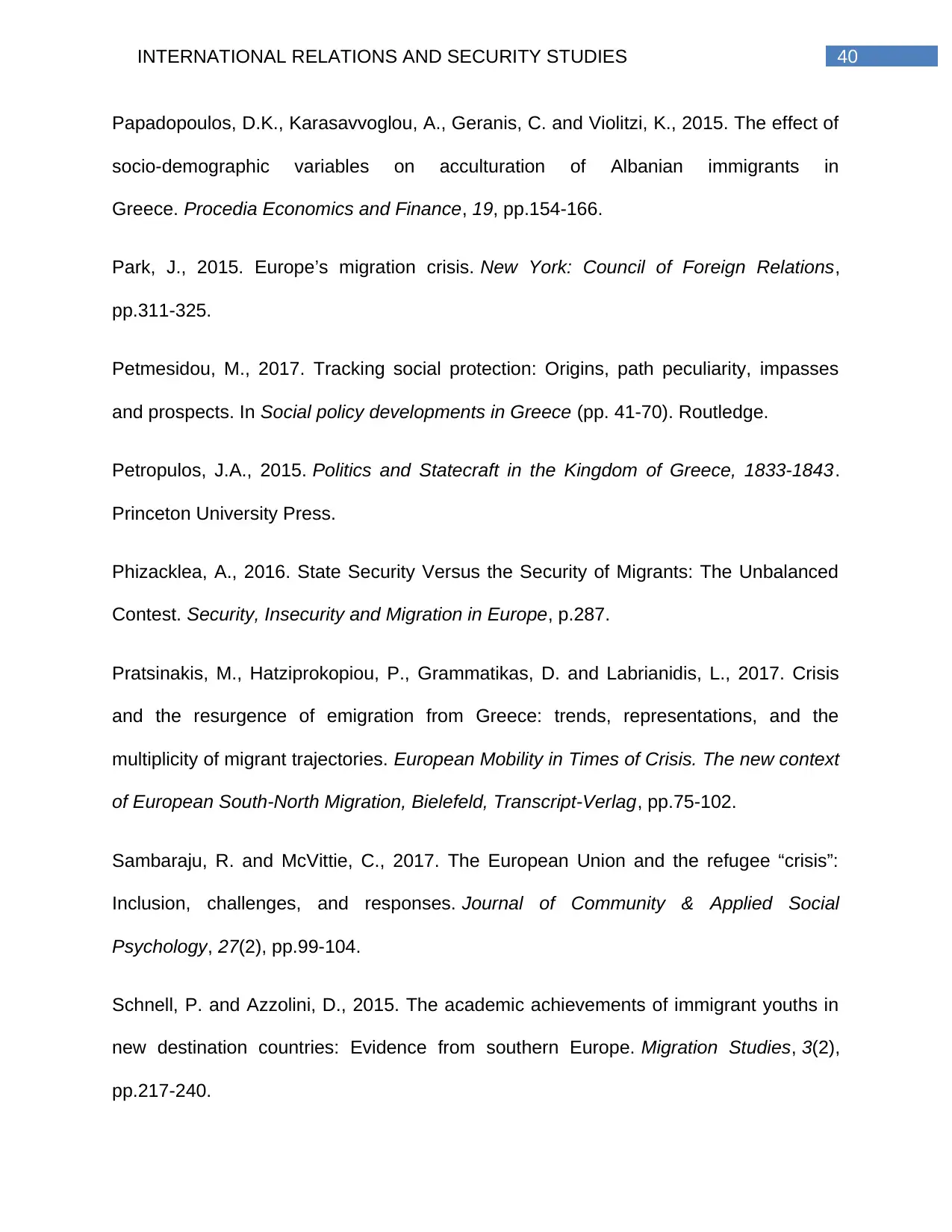
40INTERNATIONAL RELATIONS AND SECURITY STUDIES
Papadopoulos, D.K., Karasavvoglou, A., Geranis, C. and Violitzi, K., 2015. The effect of
socio-demographic variables on acculturation of Albanian immigrants in
Greece. Procedia Economics and Finance, 19, pp.154-166.
Park, J., 2015. Europe’s migration crisis. New York: Council of Foreign Relations,
pp.311-325.
Petmesidou, M., 2017. Tracking social protection: Origins, path peculiarity, impasses
and prospects. In Social policy developments in Greece (pp. 41-70). Routledge.
Petropulos, J.A., 2015. Politics and Statecraft in the Kingdom of Greece, 1833-1843.
Princeton University Press.
Phizacklea, A., 2016. State Security Versus the Security of Migrants: The Unbalanced
Contest. Security, Insecurity and Migration in Europe, p.287.
Pratsinakis, M., Hatziprokopiou, P., Grammatikas, D. and Labrianidis, L., 2017. Crisis
and the resurgence of emigration from Greece: trends, representations, and the
multiplicity of migrant trajectories. European Mobility in Times of Crisis. The new context
of European South-North Migration, Bielefeld, Transcript-Verlag, pp.75-102.
Sambaraju, R. and McVittie, C., 2017. The European Union and the refugee “crisis”:
Inclusion, challenges, and responses. Journal of Community & Applied Social
Psychology, 27(2), pp.99-104.
Schnell, P. and Azzolini, D., 2015. The academic achievements of immigrant youths in
new destination countries: Evidence from southern Europe. Migration Studies, 3(2),
pp.217-240.
Papadopoulos, D.K., Karasavvoglou, A., Geranis, C. and Violitzi, K., 2015. The effect of
socio-demographic variables on acculturation of Albanian immigrants in
Greece. Procedia Economics and Finance, 19, pp.154-166.
Park, J., 2015. Europe’s migration crisis. New York: Council of Foreign Relations,
pp.311-325.
Petmesidou, M., 2017. Tracking social protection: Origins, path peculiarity, impasses
and prospects. In Social policy developments in Greece (pp. 41-70). Routledge.
Petropulos, J.A., 2015. Politics and Statecraft in the Kingdom of Greece, 1833-1843.
Princeton University Press.
Phizacklea, A., 2016. State Security Versus the Security of Migrants: The Unbalanced
Contest. Security, Insecurity and Migration in Europe, p.287.
Pratsinakis, M., Hatziprokopiou, P., Grammatikas, D. and Labrianidis, L., 2017. Crisis
and the resurgence of emigration from Greece: trends, representations, and the
multiplicity of migrant trajectories. European Mobility in Times of Crisis. The new context
of European South-North Migration, Bielefeld, Transcript-Verlag, pp.75-102.
Sambaraju, R. and McVittie, C., 2017. The European Union and the refugee “crisis”:
Inclusion, challenges, and responses. Journal of Community & Applied Social
Psychology, 27(2), pp.99-104.
Schnell, P. and Azzolini, D., 2015. The academic achievements of immigrant youths in
new destination countries: Evidence from southern Europe. Migration Studies, 3(2),
pp.217-240.
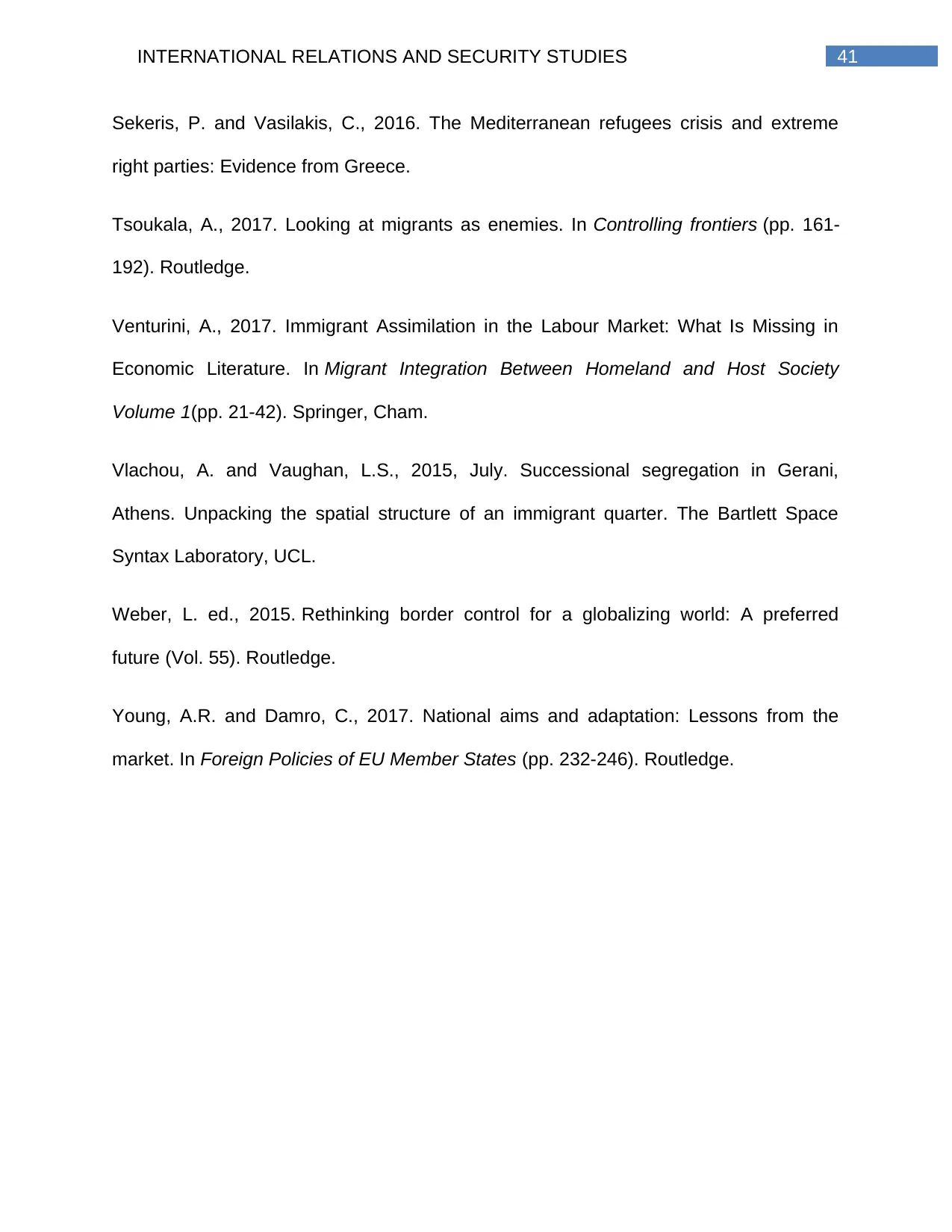
41INTERNATIONAL RELATIONS AND SECURITY STUDIES
Sekeris, P. and Vasilakis, C., 2016. The Mediterranean refugees crisis and extreme
right parties: Evidence from Greece.
Tsoukala, A., 2017. Looking at migrants as enemies. In Controlling frontiers (pp. 161-
192). Routledge.
Venturini, A., 2017. Immigrant Assimilation in the Labour Market: What Is Missing in
Economic Literature. In Migrant Integration Between Homeland and Host Society
Volume 1(pp. 21-42). Springer, Cham.
Vlachou, A. and Vaughan, L.S., 2015, July. Successional segregation in Gerani,
Athens. Unpacking the spatial structure of an immigrant quarter. The Bartlett Space
Syntax Laboratory, UCL.
Weber, L. ed., 2015. Rethinking border control for a globalizing world: A preferred
future (Vol. 55). Routledge.
Young, A.R. and Damro, C., 2017. National aims and adaptation: Lessons from the
market. In Foreign Policies of EU Member States (pp. 232-246). Routledge.
Sekeris, P. and Vasilakis, C., 2016. The Mediterranean refugees crisis and extreme
right parties: Evidence from Greece.
Tsoukala, A., 2017. Looking at migrants as enemies. In Controlling frontiers (pp. 161-
192). Routledge.
Venturini, A., 2017. Immigrant Assimilation in the Labour Market: What Is Missing in
Economic Literature. In Migrant Integration Between Homeland and Host Society
Volume 1(pp. 21-42). Springer, Cham.
Vlachou, A. and Vaughan, L.S., 2015, July. Successional segregation in Gerani,
Athens. Unpacking the spatial structure of an immigrant quarter. The Bartlett Space
Syntax Laboratory, UCL.
Weber, L. ed., 2015. Rethinking border control for a globalizing world: A preferred
future (Vol. 55). Routledge.
Young, A.R. and Damro, C., 2017. National aims and adaptation: Lessons from the
market. In Foreign Policies of EU Member States (pp. 232-246). Routledge.

42INTERNATIONAL RELATIONS AND SECURITY STUDIES
1 out of 43
Your All-in-One AI-Powered Toolkit for Academic Success.
+13062052269
info@desklib.com
Available 24*7 on WhatsApp / Email
![[object Object]](/_next/static/media/star-bottom.7253800d.svg)
Unlock your academic potential
© 2024 | Zucol Services PVT LTD | All rights reserved.


